Answers to Everyday Issues Part: 61
A re-examination of ijma‘ on the Finality of Prophethood : AlGhazali and apostasy charges against Ahmadis
Page 8
Prophet Ahmad: The perfect follower of Muhammad
Page 18
THE WEEKLY
www.alhakam.org
AL HAKAM | Friday 29 September 2023 | Issue CCLXXXIX
Ahmadiyya Archive & Research Centre (ARC), 22 Deer Park Road, London, SW19 3TL, UK info@alhakam.org | ISSN 2754-7388
Dawn of the second century of Lajna Imaillah Huzoor addresses Lajna UK Ijtema 2023

On 22-24 September 2023, Lajna Imaillah UK held their annual ijtema in Kingsley, Hampshire. Hazrat Khalifatul Masih V, may Allah be his Helper, graced the ijtema with his presence and formally concluded the event with an address.
At approximately 16:15 local time, Hazrat Amirul Momineenaa arrived at the main Lajna marquee and began the proceedings of the final session by inviting Samina Arif Sahiba to recite a portion from the Holy Quran, verses 1-12 of Surah al-Mu’minun, followed by their English translation.
Hazrat Khalifatul Masih Vaa then stood up, as did all those present, and took the Lajna Imaillah pledge. After the pledge, Huzooraa invited Fariha Sosan Sahiba to read an Urdu poem composed by the Promised Messiahas
Thereafter, the ijtema report was read out by Dr Fariha Sahiba, Sadr Lajna Imaillah, UK. She started off by thanking Huzooraa for his special attention to Lajna Imaillah UK and for gracing the Lajna with his presence at their National Ijtema. Sadr Sahiba reported that this year was special as Lajna Imaillah was celebrating its centenary year. Many events were held to celebrate the 100 years since the establishment of Lajna Imaillah. Sadr Sahiba reported that Lajna planted over 90,000 trees, out of which over 30,000 were planted by the Midlands region alone. Lajna held 142 local tabligh events, and one national peace symposium was held to demonstrate how Islam empowers women. As part of its centenary celebrations, Lajna UK is building a maternity hospital in Sierra Leone, which has been named
‘The sun does not set on Jamaat-e-Ahmadiyya’: Hazrat Musleh-e-Maud’s address at 1957 Khuddam Ijtema Page 20
Hadith-e-Rasul – Sayings of the Holy Prophet Muhammadsa
Hazrat Abu Hurairara narrated: “Allah’s Messengersa said, ‘By Him in Whose hand is my soul, the son of Mary will soon descend among you as a just arbiter; he will break the cross and kill the swine, and there will be no tribute [jizya)], and he will distribute wealth such that no one will accept it, and one prostration will be better than the whole world and all that is in it.’” (Sahih al-Bukhari, Kitab ahadithi l-anbiya, Bab nuzuli ‘isa ibn maryam)
Hazrat Mirza Ghulam Ahmadas, In His Own Words
Where to find God
“If you desire to find Allah the Exalted, search near the hearts of the meek. For this very reason, the Messengers donned the garb of humility. In a similar vein, individuals from more prominent
A
Page 6
لﺎﻗ ـ ﻪﻨﻋ ���ا ﻰﺿر ـ ةﺮﻳﺮﻫ ��أ ﻦﻋ :ﻢﻠﺳو ﻪﻴﻠ� ���ا ﻰﻠﺻ ���ا لﻮﺳر لﺎﻗ ل��ﻳ نأ ﻦﻜﺷﻮﻴﻟ ،هﺪﻴﺑ ��ﻔﻧ يﺬﻟاو ��ﻜﻴﻓ ،��ﺪﻋ ﺎﻤﻜﺣ ﻢﻳ�� ﻦﺑا ﻢﻜﻴﻓ �ﻀﻳو ،ﺮﻳ����ا ﻞﺘﻘﻳو ،ﺐﻴﻠﺼﻟا ��ﺒﻘﻳ �� ﻰﺘﺣ لﺎﻤﻟا ﺾﻴﻔﻳو ،ﺔﻳﺰ��ا ةﺪﺣاﻮﻟا ةﺪﺠﺴﻟا ن��ﺗ ﻰﺘﺣ ،ﺪﺣأ ﺎﻬﻴﻓ ﺎﻣو ﺎﻴﻧﺪﻟا ﻦﻣ ا��ﺧ The Promised Messiah
Continued on next page >>
Continued on next page >>
<< Continued from previous page
nations should not deride those from lesser ones, nor should anyone boast of their noble lineage. Allah the Exalted declares that when you stand before Me, I shall not question your ancestry, but rather, your deeds will be the subject of scrutiny. Similarly, Allah’s Messengersa advised His daughter, saying, ‘O Fatimah, Allah will not enquire about your lineage. Should you engage in any wrongful conduct, you will not be spared by virtue of being the Prophet’s daughter. Therefore, remain vigilant about your actions at all times.’” (Al Hakam, 17 July 1903, Malfuzat, Vol. 3, p. 370)
<< Continued from previous page Ayesha Maternity Hospital by Huzooraa
The theme of this year’s national ijtema was 100 years of Lajna Imaillah. Various talks and presentations were held, including the establishment and history of Lajna Imaillah, how Khilafat has empowered Lajna, and how Lajna is at the forefront of financial sacrifices. There was also a special presentation on the achievements of Lajna Imaillah in Africa, the Arab world and Bangladesh. The Ahmadiyya Muslim Research Association (AMRA) arranged talks on various current topics as well as a health check screening on site. The academic awards for educational excellence were distributed to the students whose names were announced in the Jalsa Salana earlier this year. Sadr Lajna concluded by expressing her gratitude to all the duty holders, Majlis Khuddamul Ahmadiyya, the UK Jamaat and Majlis Ansarullah for their help, and again to Huzooraa for his special attention and continuous guidance. A short video highlight presentation of the ijtema was then shown.
Huzooraa then took to the podium, conveyed “Assalamu alaikum wa rahmatullah”, and recited tashahhud and ta‘awwuz. Huzooraa said, “With the grace of Allah, this year Lajna Imaillah is celebrating its centenary year” as it was founded by Hazrat Khalifatul Masih IIra in Qadian in the year 1922-23, where it started with just a few women in Qadian. Huzooraa said that today, by the grace of Allah, Lajna Imaillah is established all over the world. While this is a means of happiness, we must remember that we are not like those secular and worldly groups who become content by reaching such milestones. Instead of euphoria, such milestones should serve as a means of expressing our gratitude to Allah the Almighty for his favours and blessings.
Hazrat Amirul Momineenaa emphasised: “The time for real celebration will only be when the objectives for which Lajna Imaillah was founded are fulfilled.”
Huzooraa said that regarding the founding of Lajna Imaillah and other auxiliary organisations, Hazrat Khalifatul Masih IIra clearly identified their objectives. In various addresses to Lajna, he expressed his high hopes and expectations. He made it clear that no Ahmadi woman should consider herself inferior to any Ahmadi man or remain hidden in his shadow. Huzooraa said, “In all respects, men and women are
equal. For example, in terms of building a relationship with Allah the Almighty, where Allah had instructed men to submit to Him to worship Him and to establish a living relationship with their Creator, He required the same of women.”
He said it is certainly true that according to the commands of Allah the Almighty and the Holy Prophetsa, women must play a fundamental role in safeguarding their home and family environment, especially in terms of raising their children. At the same time, Hazrat Musleh-e-Maudra also made it clear that Ahmadi women are dutybound to serve their society and to strive for its prosperity, especially “by conveying the teachings of Islam.” Hence, no Ahmadi woman should be under the misconception that tabligh is only for men; rather, women should strive in this regard and try to spread the teachings of Islam far and wide. Huzooraa said it is also up to Lajna to show the world what Islam is.
In the world we live in today, much is said about women’s rights, and false allegations are routinely raised against Islam. If a Muslim woman directly responds to such allegations by proudly professing her faith and using her intellect, it will hold much greater weight than if any man responds on her behalf.
Thus, it was to fulfil these monumental moral and spiritual objectives that Hazrat Musleh-e-Maudra established Lajna Imaillah a century ago.
Huzooraa said he would benefit from an address by Hazrat Musleh-e-Maudra that he gave to Lajna and discuss the standards of faith to which Ahmadi Muslim women should aspire.
Hazrat Musleh-e-Maudra stated that there is no difference between a man and a woman when it comes to their religious obligations. Indeed, Allah the Almighty has said in Chapter 4, verse 2, of the Holy Quran that He has created men and women as mates. It means that they have the same responsibilities and will be held equally accountable by Allah the Almighty for their deeds. “It is true that Islam has prescribed a division of labour wherein men are given the principal responsibility for providing financially for their family, while women are given the primary duty of running the home affairs and morally training their children. Irrespective of this distinction, Islam has greatly emphasised the importance of educating girls and ladies so that their potential is unlocked and they become assets to their community.
“Furthermore, being educated will enable mothers to nurture and guide their children in such a way that they develop into well-rounded and responsible citizens who contribute positively to their communities.”
So, even if there is a degree of divergence in the responsibilities of men and women, Islam has established equal rights in terms of their value as human beings, feelings and emotions. Therefore, Ahmadi women “should consider their religious obligations as an opportunity to please their Lord and to attain His rewards and blessings.”
Hazrat Musleh-e-Maudra gave the analogy of two people who came before their king. One was a criminal who was looked down upon by society. He stood before the monarch, afraid of his sentence. The other person was a distinguished military general, whose purpose was to brief the monarch
on matters of state. Where the public and courtiers could not hide their disdain for the criminal, they were left in awe by the general and how the king was pleased with him. “When it comes to our spiritual and moral obligations, we should seek to live our lives according to the commands of Allah the Almighty so that when we stand before Him, we do not go forth shamefaced like a disgraced criminal but like the general who fulfilled all that was required of him.”
Thereafter, Hazrat Musleh-e-Maudra stated that the lives of the Holy Prophetsa and Prophet Jesusas were preserved to a much greater extent than those of other prophets of God. In both eras, there existed righteous women who attained esteemed ranks in spirituality. For example, in the time of Jesusas, when he was taken down from the cross and placed in a cave, his devoted and loyal female disciples came to his aid while his male followers deserted him out of fear.
In the blessed era of the Holy Prophetsa, the sacrifices of Muslim women were also “extraordinary and beyond all compare in the history of mankind. During the first few years of Islam, Muslims were relentlessly persecuted and subjected to barbaric cruelties. Slavery was rampant in Arab society, and those slaves who accepted Islam were treated even more inhumanely by their merciless owners.”
For example, a Muslim husband and wife were tormented so much that one shudders upon the mention of it. They were made to lie in the blistering heat on boiling sand and dragged for long stretches, severely beaten so that their eyes were swollen and no parts of their bodies were spared. This was only because they accepted Islam. Yet they held onto their faith. While they were being tortured, the Holy Prophetsa happened to walk by, and the slave owner demanded that they renounce their faith and reject the Holy Prophetsa, but they remained steadfast and bore every difficulty for their faith. Upon seeing this, the Holy Prophetsa became griefstricken like a father seeing his child in great distress. He counselled them to remain patient and assured them their agony would come to an end. The husband succumbed to the torture and died soon after. The slave owner showed no mercy to his wife either. He pierced her torso with a spear and killed her. As such, it is thought she became the first martyr of Islam.
As this relentless opposition continued, the Holy Prophetsa told some of his companions to migrate to Abyssinia. Hazrat Umarra, who had not yet accepted Islam, noticed a group preparing to leave Mecca. He asked a Muslim lady gathering her belongings where she was going. She said they could no longer tolerate the cruelties of the Meccans. Upon seeing her anger and pain, Hazrat Umar felt shame and was overcome with sorrow. With tears in his eyes, he could only bring himself to meekly say goodbye and wish her the best.
These were outstanding examples of early Muslim women who were ready to sacrifice everything for the sake of their Faith, including leaving behind their homelands. Moreover, they never forgot the objective of their migration, which was to attain religious freedom.
Hazrat Khalifatul Masih Vaa said: “Today, many of you or your elders were also forced to leave your homeland due to religious persecution. Having done so, you must
ask yourselves whether, now that you have attained religious freedom, you are giving precedence to your faith over everything else. Are you ready for every possible sacrifice?”
Huzooraa said that some may wonder, “What is meant by sacrifice in this day and age? It is quite simple, [i.e.,] to act upon the commands of Allah the Almighty and the Holy Prophetsa at all times. It is to worship Allah five times a day at the appointed times. It is to study and ponder over the meaning of the Holy Quran and to act upon its commands. It is to train your children according to Islam’s teachings and instil Islamic values within them.”
Huzooraa said, “In this society, where there is religious freedom, unfortunately, certain other so-called freedoms are aggressively pushing society down a dark and dangerous path. Vulgar activities and beliefs are taking route, that are incredibly harmful and a means of driving the coming generation away from religious teachings and moral values. Hence, guiding your children and helping them navigate between right and wrong is an essential and great challenge to which Ahmadi mothers must rise.”
Another example of outstanding faith that Hazrat Musleh-e-Maudra narrated is the sister of Hazrat Umar. When he was an opponent of Islam, he left his home, sword in hand, intending to kill the Holy Prophetsa On the way, a man asked him where he was heading. When Hazrat Umar told him, the man said to first glance into his own home, where his sister had accepted Islam. Furious, he headed for her house and heard his sister and her husband reciting the Quran. They hid their Muslim teacher and the pages of the Holy Quran in their possession, but Hazrat Umar had heard them. In a fit of rage, Hazrat Umar lunged forward to strike his brother-in-law, but “with immeasurable defiance and bravery, his sister rose like a lion to shield her husband and was struck. As blood poured from her nose, she fearlessly addressed Hazrat Umar and proclaimed, ‘Yes! We are Muslims, and if you wish to kill us, go ahead!’ Upon witnessing all this, Hazrat Umar was left astonished and ashamed, and his tone instantly softened, and he asked to see what they had been reciting. His sister said he was impure and must bathe himself before reading the Holy Quran. He complied with her demand, and after Hazrat Umarra started reading the Holy Quran, immediately the beautiful words of the Holy Quran penetrated his heart.
Consequently, contrary to his original plan, Hazrat Umarra rushed to find the Holy Prophetsa to accept Islam as opposed to killing him, as was his original plan. This change in Hazrat Umarra was the result of “the magnificent standard of faith and phenomenal courage displayed by Hazrat Umar’sra sister that ignited a spiritual revolution within him.”
Following the migration of the Holy Prophetsa, Muslim women continued to make exceptional sacrifices for the sake of their faith. After the Battle of Uhud, where Muslims faced losses, the state of Muslim women was such that they did not care whether their husbands, brothers and sons had died but enquired only about the Holy Prophetsa and rejoiced when they found out he was alive and well. This was all due to their sheer love and passion for Islam and
Friday 29 September 2023 | AL HAKAM 2
the Holy Prophetsa
Hazrat Musleh-e-Maudra, citing the examples of such women, stated that “in this era, Ahmadi women have also claimed to have accepted a prophet who came according to the prophecies of the Holy Prophetsa and was the pure reflection of him. Thus, every Ahmadi woman must ask themselves whether they possess the same spirit and devotion that the female companions of the Holy Prophetsa had for the sake of their faith, and whether they exhibit the levels of righteousness and spirituality […]?”, where they would spend their nights engaged in nawafil, fast and be ready for every sacrifice.
Huzooraa said that recently, in the UK and Germany Jalsa Salanas, he presented many examples of how the female companions of the Holy Prophetsa would strive to fulfil the demands of their faith and discharge every command of Allah the Almighty and the rights of his worship.
There were such women whose lives were transformed from ignorance to enlightenment only due to their obedience and love for Allah the Almighty and the Holy Prophetsa. They made sacrifices that cannot be imagined in this day and age. For example, once, when an army was formed, a woman pleaded to join the front line. When stopped, she became angry and asked if women were not required to serve Islam. Having observed this, the Holy Prophetsa smiled and even laughed a little, and upon seeing her passion, he permitted her to take part in the war as a nurse, and she played a full role in the war, tending to the Muslim soldiers, and was even given a share of the proceeds of the war. Her service also set a precedent for future battles, where Muslim women, including the wives of the Holy Prophetsa and his daughter Hazrat Fatimara, would tend to the injuries of the soldiers. Hence, where the Holy Prophetsa speaks of believing men, it also talks about believing women.
In light of such examples, Hazrat Musleh-e-Maudra expressed his heartfelt belief that in this era, if Ahmadi women were infused with such passion and spirit of early Muslim women, Ahmadiyyat would spread and progress with great speed.
Huzooraa said, “Thus, as Ahmadi women, you must recognise your duties to spread the message of Islam amongst other ladies so that the future generation of society can be rightly guided. Given the pivotal influence of women on their progeny, the long-term effect of preaching to women will have a more profound and longer-term impact on society.
“In order to be successful in tabligh, you must seek to increase your religious knowledge. Always remember that today, knowledge and prayers are our only weapons of choice in the cause of spreading Islam. In front of all Ahmadi women is the example of Hazrat Aishara, who, in terms of religious knowledge, attained a rank far beyond the men of her time, or indeed, any other era. […]
“Women have the potential to scale the greatest intellectual heights, and so you must never underestimate yourselves. Rather, seek to fulfil your rich potential, as it will provide you with the capability to raise your children in a way that they grow to be beneficial to society. It will also enable you to defend your faith and beliefs.”
These days, once again, the Khatme-Nabuwat issue, i.e., the Finality of Prophethood, is being raised very loudly by our opponents as they seek to incite people against Ahmadiyyat. They claim we don’t believe the Holy Prophetsa to be the Seal of the Prophets. In this regard, it was a woman who provided the answer to this question long ago. Hazrat Aishara said, “Say he is the Seal of the Prophets, but do not say that there is no prophet after him.”
“With these insightful and profound words, Hazrat Aishara settled the debate by
clarifying that whilst the Holy Prophetsa was the final law-bearing prophet, the door to prophethood remained open. She made this statement due to her wisdom and foresight as she recognised the future dissent over this issue. Regrettably, so-called Muslim clerics who consider themselves scholarly and wise, have fallen prey to the ignorance and falsehood that Hazrat Aishara tried to save the Muslim ummah from.
Huzooraa said: “So now it lies in the hands of the Ahmadi women to strive to emulate the example of Hazrat Aishara and guide the world.”
Huzooraa said that as Lajna is marking its centenary, Ahmadi women should not be satisfied if 40%, 50%, or 60% of Ahmadi women are fulfilling their religious obligations. Ahmadi women must not be content unless 100% of the Lajna members reach the highest standards of worshipping Allah and strive to spread the teachings of Islam.
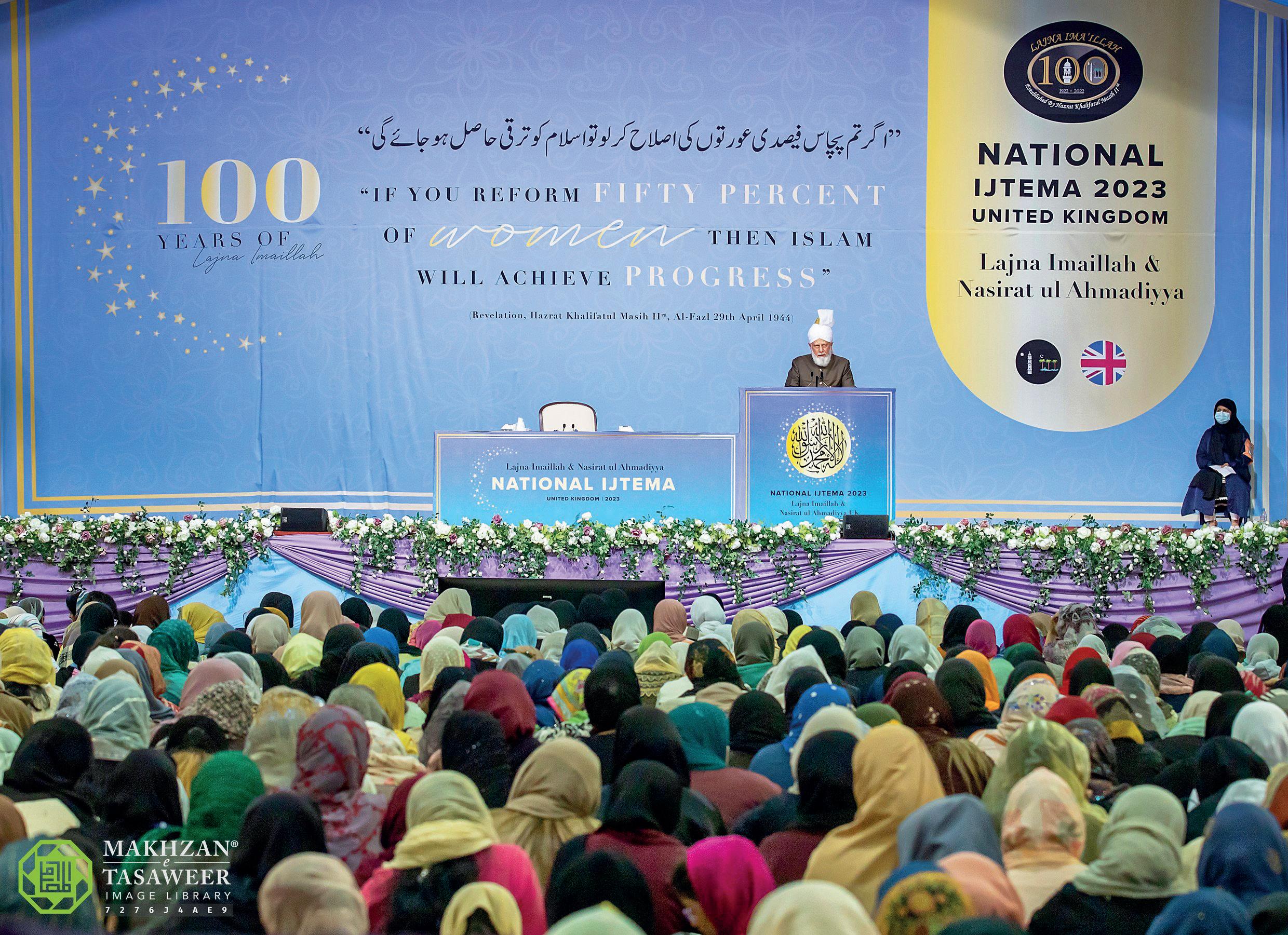
Huzooraa stressed: “You cannot rest easy until all members of Lajna seek to convey Islam’s teachings and fulfil their duties to ensure the moral and spiritual training of the next generation. Only when you reach such heights will you have fulfilled your objectives, and only then will you be truly able to celebrate 100 years of Lajna Imaillah. Otherwise, merely reaching 100 years is meaningless and not a measure of any success.”
“Furthermore, as you strive to achieve your religious objectives, never be embarrassed or fall prey to any inferiority complex. Instead, take pride in your faith and religious conviction.
“Likewise, if your husbands ever prove an obstacle in the fulfilment of your religious duties, you should tell them without any fear or hesitation that you will never take a backward step when it comes to the fulfilment of your religious obligations. If you manifest such courage and firm faith,
you will come to reform Ahmadi men so that they also prioritise their faith over all worldly matters.”
“As the ijtema concludes and you return to your homes, every one of you should inculcate within yourselves a firm determination to act upon Islam’s teachings at all times.
“As the page turns on the first century of Lajna Imaillah, a blank page now lies before you in the shape of the coming century. And your conduct and standard of faith will determine what is ultimately written upon it. May it be that your sacrifices and unwavering loyalty to your faith come to be recorded in the history of Islam, just like those women who accepted Islam in the time of the Holy Prophetsa. May it be that when the time comes to write the history of this era, the blank page of which I spoke is decorated with stories of countless Ahmadi women from this era who proved that they were ready for every sacrifice for the sake of their faith and who gloriously fulfilled their responsibilities to their religion. May it be that history bears witness to the fact that Ahmadi women were at the vanguard of establishing the Oneness of God in the world, and may we soon come to witness the momentous spiritual victory of the Holy Prophetsa Muhammadsa, where the people of all nations and races spiritually unite and embrace Islam’s true teachings. Surely, only in that lies the salvation of the world.
“May Allah the Almighty bless you all, and may the dawn of the second century of Lajna Imaillah prove a means of eternal progress for the Jamaat of the Promised Messiahas Amin.”
In the end, Huzooraa led everyone in a silent prayer, after which he announced the attendance according to the latest report at the time, which was 6,768. Lajna then had a chance to recite some choral poems.
(Report prepared by Al Hakam)
3 AL HAKAM | Friday 29 September 2023
This Week in History
A glimpse into the rich history of the Ahmadiyya
Muslim Jamaat
the people at this time. If, by witnessing your act, goodness is instilled in other people as well, it will certainly have a positive effect on the collective morale of the country.”
For more details, see “Hazrat Mirza Bashiruddin Mahmud Ahmad’s services to the Muslim cause: Nurturing the newly formed Pakistan”, Al Hakam, 12 March 2021, Issue 156, pp. 19-20.
1 October 2004: During his Friday Sermon on this day, inaugurating the Darul Barakat Mosque in Birmingham, UK, Hazrat Khalifatul Masih Vaa narrated the early history of the Jamaat in Birmingham and said that the Jamaat was established in Birmingham in 1960 and initially comprised of only five members.
29 September
29 September 1891: The Promised Messiahas reached Delhi and wrote a letter to Hazrat Munshi Rustam Alira on this day, saying that hopefully, in the next month, his address would be arranged in the two-story residence of Nawab Loharo, situated in Ballimaran Bazar. Huzooras instructed him to pay a visit there too. Huzooras also asked Munshi Sahibra to arrange for a suitable job for Sheikh Abdul Haq of Karachi, who was a devout follower of Huzooras (Maktubat-e-Ahmad, Vol. 2, p. 579)

29 September 1946: On this day, while addressing Majlis Khuddam-ul-Ahmadiyya Delhi, Hazrat Musleh-e-Maudra said: “No doubt, you must clean the streets and cities and be a source of tranquillity for others; however, spiritual filth is more dangerous than worldly filth. The Western world has strongly emphasised worldly cleanliness and made various means of physical cleanliness available, but they do not have any cure for attaining spiritual purity. Physical filth causes
the death of a body, but spiritual filth kills the soul. […] Therefore, without a doubt, you need to care about physical cleanliness, but you also need to take more care of spiritual purification […] and enhance your level of sacrifice.”
For more details, see “Practical efforts are needed for Islam’s progress: Hazrat Musleh-e-Maud’s guidance to Ahmadi youth”, Al Hakam, 22 July 2022, Issue 227, pp. 12-13.
30 September
30 September 1895:
On this day, the Promised Messiahas undertook a journey towards a place called Dera Baba Nanak. The sole purpose of this was to personally see the famous cloak of Hazrat Baba Nanakrh
(Tarikh-e-Ahmadiyyat, Vol. 1, pp. 532-533)
30 September 1930: Hazrat
Musleh-e-Maudra delivered a speech in Jammu and Kashmir on this day. Huzoorra stayed in Jammu for a day on his return from Srinagar. There, he delivered a speech in which he urged the seekers of truth to seek guidance from Allah the Almighty through
prayers in search of true Islam and community. (Tarikh-eAhmadiyyat, Vol. 5, p. 142)
30 September 1983: On this day, Hazrat Khalifatul Masih IVrh laid the foundation stone of the first Ahmadiyya mosque in Australia. Huzoorrh delivered a speech afterwards in English. A companion of the Promised Messiahas, Hazrat Maulvi Muhammad Hussainra especially attended this historic event. (Silsila Ahmadiyya, Vol. 4, p. 826)
30 September 2011: During his Friday Sermon on this day, inaugurating the Baitun Nasr Mosque in Norway, Hazrat Khalifatul Masih Vaa mentioned some of the facts and figures in relation to the construction of this mosque.
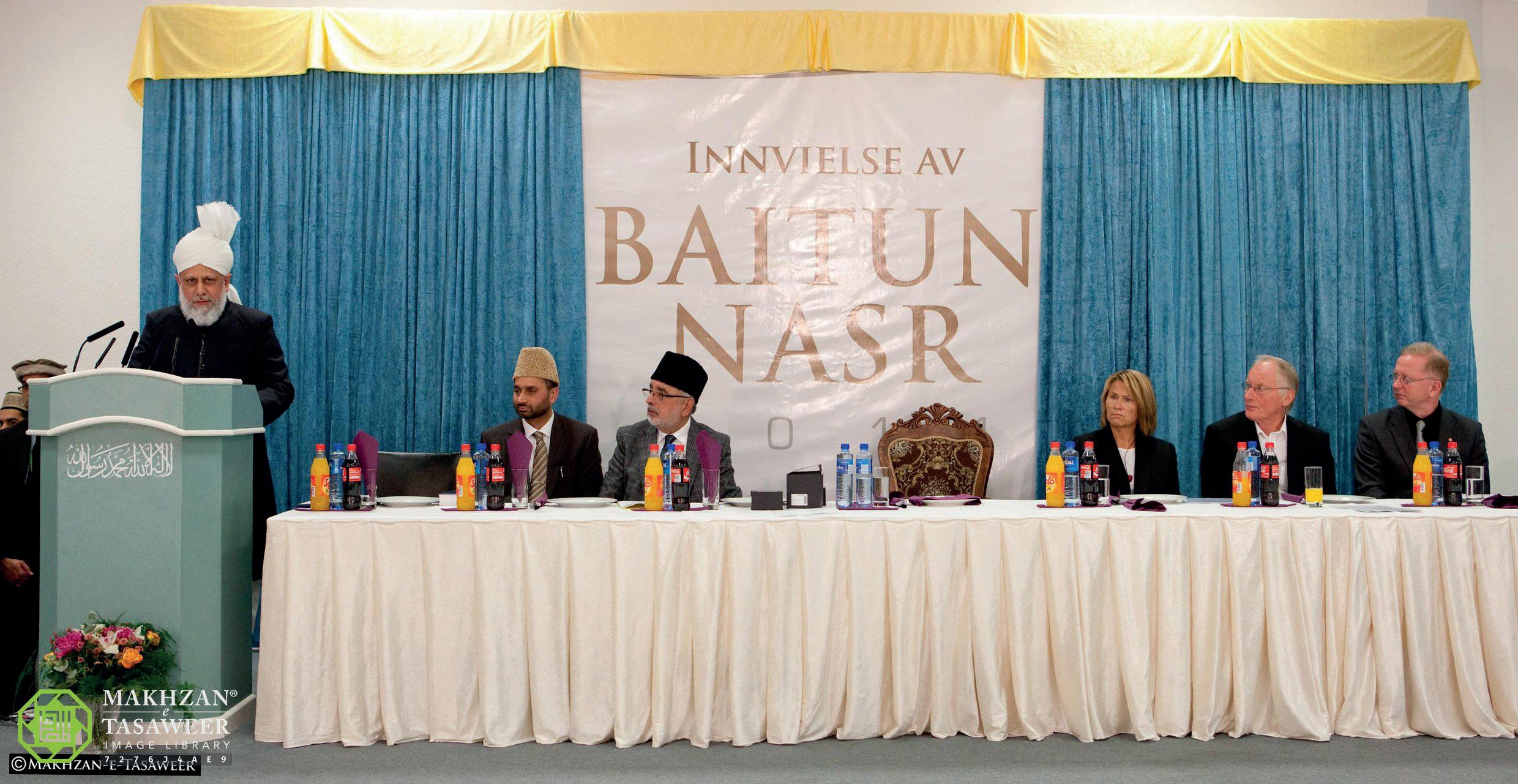
1 October
1 October 1954: During his Friday Sermon on this day, instructing Ahmadis to serve the people affected by the flood in Pakistan, Hazrat Musleh-eMaudra said:
“Members should not waste this opportunity to do good deeds; instead, they should serve
2 October
2 October 1928: Mirza Sultan Ahmad Sahib, the eldest son of the Promised Messiahas, announced his allegiance to Jamaat-e-Ahmadiyya through an announcement in Al Fazl on this day. Furthermore, he joined the Jamaat at the hands of his brother, Hazrat Musleh-e-Maudra in 1930. (Al Fazl, 2 October 1928, p. 1)
2 October 1928: On this day, the first part of Hazrat Muslehe-Maud’sra response to the Nehru Report was published in Al Fazl. The last part was published on 2 November 1928. It was later published in book form, titled Nehru Report aur Musalmanon ke Masaleh. Its English translation was published in March 1930, titled The NehruReport and Muslim Rights For more details, see “Hazrat Mirza Bashiruddin Mahmud Ahmad’s services to the Muslim cause: Guiding Muslims of the Indian Subcontinent amid religious and political conflicts” , Al Hakam, 26 February 2021, Issue, 154, pp. 17-20.
Friday 29 September 2023 | AL HAKAM 4
Hazrat Khalifatul Masih Vaa inaugurating the Baitun Nasr Mosque in Norway
29 September - 5 October


Crossing continents on two wheels: USA Ahmadis bike from Aachen, Germany, to Alton, UK
3 - 4 October
3 October 2003: On this day, with his Friday Sermon, Hazrat Khalifatul Masih Vaa inaugurated the Baitul Futuh Mosque in Morden, UK, and prayed that Allah the Almighty may make this mosque a source for spreading the beautiful and peaceful teachings of Islam in Europe.
4 October 1903: On this day, Hazrat Hakim Maulvi Nuruddinra travelled to Kapurthala to attend to a patient, Hazrat Muhammad Khanra. Hazrat Hakim Maulvi Nuruddinra also delivered a sermon during his short stay there. In this address, he preached to people of all schools of thought in a new way and quenched the spiritual thirst of the people by citing events and examples from his life. (Tarikh-e-Ahmadiyyat, Vol. 3, p. 163)
4 October 2013: On this day, Hazrat Khalifatul Masih Vaa was interviewed by the Australian Broadcasting Corporation TV and Radio. “ABC TV and Radio Conducts Interview with Head of Ahmadiyya Muslim Jamaat”, www.pressahmadiyya.com)
5 October
5 October 1902: The Promised Messiah’sas book Kashti-e-Nuh [Noah’s Ark] was published on this day. Its other name was An Invitation to Faith. (Tarikh-e-Ahmadiyyat, Vol. 2, p. 215)
5 October 1946: On this day, Hazrat Musleh-e-Maudra wrote to the then Viceroy of India, Lord Wavell, and stated that though Jamaat-eAhmadiyya is a religious Jamaat and is not a part of the Muslim League, its sympathies and support were with the Muslim League and the Indian Muslims during the ongoing political turmoil. For more details, see “The deadlock over Interim Government and Constituent Assembly for India: Its background and Hazrat Mirza Bashiruddin Mahmud Ahmad’s guidance”, Al Hakam, 15 July 2022, Issue 226, pp. 17-20.
5 October 1973: During his Friday Sermon on this day, Hazrat Khalifatul Masih IIIrh urged members of the
Jamaat to pay their chanda for the Nusrat Jehan Scheme, which they had promised, as soon as possible and said:
“As far as the blessings of this scheme are concerned, which Allah the Almighty has linked to it, they will continue to expand, insha-Allah. Allah the Almighty is the One Who always showers His mercy and love. [...] Our treasuries are filled with the mercy of Allah the Almighty, not with pounds, gold, silver or diamonds. The wealth of Allah’s mercy is immensely precious and more beneficial than any other asset – such as gold, silver, diamonds, and pearls – and it never shows disloyalty, but worldly wealth, ultimately, is disloyal.”
For more details, see “Nusrat Jehan Scheme: Khilafat’s impetus for ‘Africa to Leap Forward’ – A glimpse into the early years (1970-1982)”, Al Hakam, 27 May 2022, Issue 219, pp. 16-18.
5 October 2015: On this day, Hazrat Khalifatul Masih Vaa was interviewed by the Dutch News Agency, Omroep Gelderland On the same date, Huzooraa was also interviewed by RTV Nunspeet at the Baitun Noor Mosque complex in Nunspeet, the Netherlands. The radio interview was broadcast live and streamed worldwide. (“Blocs forming and risk of another World war – Head of Ahmadiyya Muslim Community”, and “Time for mankind to unite and work together – Head of Ahmadiyya Muslim Community”, www. pressahmadiyya.com)
5 October 2016: On this day, Hazrat Khalifatul Masih Vaa was visited by the late Mr John Honderich, Chairman of the Board at Torstar Corporation (media group) at the Baitul Islam Mosque in Peace Village, Canada. (“Utilise potential of refugees – Head of Ahmadiyya Muslim Community”, www.pressahmadiyya.com)
Shukoor Ahmed USA
Six members of Jamaat-e-Ahmadiyya USA joined the Germany cycling team for the first time for an extraordinary journey that took place from 24-27 July 2023. This expedition spanned from Aachen, Germany, to Hadeeqatul Mahdi in the UK, the location of the Jalsa Salana UK. There were a total of 40 cyclists, 33 of them from Germany, six from the United States, and one from the UAE.
After overcoming initial hurdles, including bike rentals, the team was able to make successful arrangements with prayer and persistence, securing bikes from a vendor in Hamburg.
The team formulated a plan involving cycling an average of 30 miles twice a week, with an extended ride on weekends. The captain played a pivotal role in executing and maintaining this disciplined regimen. Six bikers from the US practised regularly for over six months and tested their strength and stamina by riding 100 miles back to back on weekends to ensure they would be able to ride an average of 100 miles a day for four days continuously.
The team had several virtual meetings with Majlis-e-Sehat Germany’s cycling branch, for better preparation. They shared and monitored each other’s progress. USA members had conference calls to support and suggest tips to get to the required speed/ mileage. It is noteworthy that three members from the USA were ranked among the top ten on the leaderboard for the training mileage of all cyclists before the event.
Led by Amir Jamaat-e-Ahmadiyya Germany, Abdullah Wagishauser Sahib, the combined group, including nine missionaries and one doctor from Germany, covered an impressive distance of approximately 502 kilometres, or about 312 miles, over four days. Some cyclists initiated their journey from their places of
residence, i.e., Hamburg, Groß-Gerau and Cologne, adding several more kilometres to the total. Their route crossed four countries: Germany, the Netherlands, Belgium, France, and the UK. The expedition was marked by challenges such as inclement weather, traffic, and fatigue, yet it was equally enriched by breathtaking vistas, camaraderie, and the hospitality of fellow Ahmadi Muslims who hosted us at various mosques.
The cyclists were driven by their profound love for Allah and His Messengersa, and their aspiration to partake in the Jalsa Salana in the presence of their spiritual leader, Hazrat Mirza Masroor Ahmad, Khalifatul Masih Vaa. Additionally, the team aimed to raise awareness about peace, justice, and humanitarian efforts that cater to global communities in need.
The cyclists reached Hadeeqatul Mahdi on 27 July 2023, where they were warmly welcomed by Rafiq Hayat Sahib, Amir Jamaat-e-Ahmadiyya UK, and fellow Ahmadi Muslims who celebrated their arrival with slogans. The reception was followed by a brief ceremony where each cyclist was individually recognised and congratulated. An evening banquet was thoughtfully organised for the guests.
The cyclists expressed profound gratitude to Allah for their safe and successful completion of the journey. The team extended its appreciation to hosts, supporters, and families for their unwavering hospitality, encouragement, and prayers. Overwhelmed by a sense of achievement and elation, we found it challenging to articulate our emotions. The experience instilled vital life lessons such as patience, perseverance, teamwork, and unwavering faith in Allah.
The cyclists hope their historic expedition will inspire others to follow suit, encouraging participation in noble causes. Their ultimate aim was to convey a positive message of Islam Ahmadiyyat to the world—a message of peace, love, service, and unity.
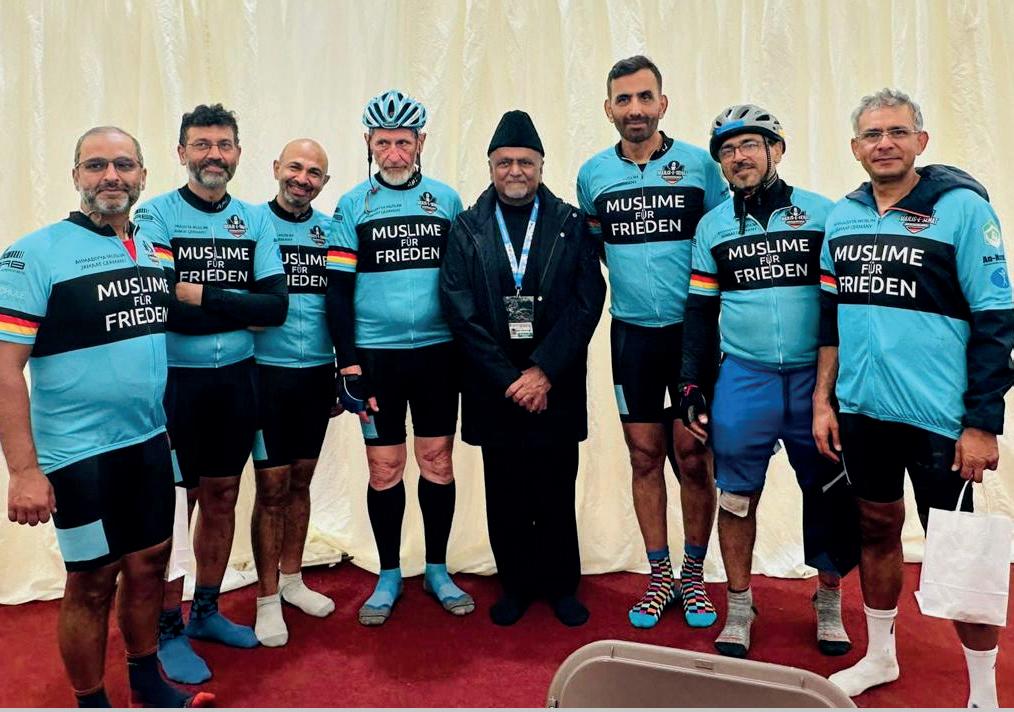



5 AL HAKAM | Friday 29 September 2023
Answers to Everyday Issues Part 61
Udhiyah, Qurabi, Hajj, faith and fate of Abu Talib
Guidance regarding basic Islamic issues – which Hazrat Amirul Momineen, Khalifatul Masih Vaa has given on various occasions in his written correspondence and during MTA programmes – is being officially published below for everyone’s benefit.


Udhiyah, Qurabi, Hajj
Someone from Canada wrote to Hazrat Amirul Momineen, Khalifatul Masih Vaa that Hazrat Khalifatul Masih IVrh had once stated that the obligation of sacrifice [qurbani] is only upon those who perform Hajj. He asked, if someone does not go for Hajj but has the means to offer a sacrifice, is it then not obligatory upon him? Huzoore-Anwaraa, in his letter dated 9 July 2022, provided the following answer to this question:
“Regarding the sacrifice on Eid alAdha, it is important to remember that the Holy Prophetsa would perform the sacrifice annually with great regularity, whether He had performed Hajj or stayed in Medina. At times, He even sent His sacrificial animals to Mecca from Medina with others for the purpose of the sacrifice. Hazrat Aishara recounts that Allah’s Messengersa had sent his sacrificial animals to Mecca with her father. (Sahih al-Bukhari, Kitab al-hajj, Bab man qallada l-qala’ida bi yadih) Similarly, Hazrat Abdullah bin Umarra narrates that the Holy Prophetsa stayed in Medina for ten years and performed the sacrifice every year. (Sunan at-Tirmidhi, Kitab al-adahi, Bab ad-dalil ‘ala anna l-udhiyyata sunnah) Moreover, it was also a sunnah of Holy Prophetsa to sacrifice more than one animal. Hence, Hazrat Abu Hurairara relates that when the Holy Prophetsa wished to perform the sacrifice, he would buy two rams that were fat, horned, and castrated. He would then slaughter one on behalf of his ummah and the other on his own behalf and on behalf of his household. (Sunan Ibn Majah, Kitab al-adahi, Bab adahiyyi rasulillahsa)

“The Holy Prophetsa also emphasised to his Companions the importance of sacrifice on various occasions. For instance, it is narrated by Hazrat Mikhnafra bin Sulaym that the Holy Prophetsa said, ‘O people! Every household should perform a sacrifice

every year.’ (Sunan at-Tirmidhi, Kitab aludhiyyah, Bab al-adhan fi uzuni l-mawlud) Similarly, it is related by Hazrat Abu Hurairara that the Holy Prophetsa declared, ‘Whoever, despite having the means, does not offer a sacrifice, should not come near our place of prayer.’ (Sunan Ibn Majah, Kitab al-adahi, Bab al-adahiyyi wajibatun hiya am la)
“In addition to this, the Holy Prophetsa also instructed Hazrat Alira to perform the sacrifice on his behalf every year. (Sunan Abi Dawud, Kitab ad-dahaya, Bab aludhiyyati ‘ani l-mayyit)
“In light of these narrations, some Islamic jurists [fuqaha], including Hazrat Abu Hanifahrh, have deemed the sacrifice on Eid al-Adha to be obligatory [wajib].
“Moreover, the Promised Messiahas has also declared sacrifice as obligatory [fardh] for those who can afford it.

“Hence, a gentleman presented a query to the Promised Messiahas as follows: ‘I had allocated a modest sum as my share in an animal sacrifice. However, due to my being Ahmadi, I was excluded from that share. Would it suffice as a sacrifice if I donate that amount to the Miskin Fund [i.e., a fund set up for the poor] in Qadian?’
“In response, the Promised Messiahas stated: ‘A sacrifice is accomplished only by actually partaking in the slaughter of an animal. A donation to the Miskin Fund does not fulfil the obligation of a sacrifice. If the amount you possess is adequate for the procurement of a goat, then proceed with the sacrifice. However, if the amount is insufficient and you are not granted the means to contribute more, then you are not obliged to make a sacrifice.’ (Badr, Vol. 6, No. 7, 14 February 1907, p. 8)
“Thus, for a person who has the means to perform a sacrifice, it becomes obligatory to do so according to their ability; for one who lacks the means, the sacrifice is not obligatory.

“As for the response regarding the issue of sacrifice given by Hazrat Khalifatul Masih IVrh, to which you referred through a YouTube clip—if you listen attentively to the entire response, it becomes evident that Huzoorrh emphasises the following point: In countries where people live in comfort and have abundant access to food throughout the year, offering sacrifices during Eid with the mindset that greater spiritual reward will be earned by personally performing the sacrifice within affluent countries, while
overlooking the people of impoverished nations, contradicts the true spirit of sacrifice. Yes, some sacrifices should be made in prosperous countries as a form of blessing, but the majority should be performed in impoverished countries to include their people in the joys of Eid. This approach aligns perfectly with the true spirit of sacrifice. Thus, in response to the question: ‘Is it not necessary, in the light of Islamic philosophy, for a person who can afford to make a sacrifice to do it himself rather than sending money and asking someone else to perform it? What is the correct way?’ Huzoorrh elaborated:
“‘As far as the matter of sacrifice is concerned, the sacrifice that is obligatory [fardh] is only for pilgrims at the time of Hajj within the sacred precincts of the Haram. For others, the Holy Quran has not explicitly mentioned the obligation of sacrifice. Therefore, others only perform the Hajj sacrifice with the intent of receiving that spiritual reward. While seeking this reward, one should bear in mind the concept of spiritual reward. Would it make sense to merely slaughter animals by one’s own hands at all costs in a society where people are already going crazy from excessive meat consumption and where Mad Cow Disease is prevalent? Conversely, in regions where impoverished Muslims or Africans are dying of hunger, should sacrifices not be performed there just for fear of forgoing the spiritual reward of carrying out the slaughter? In such circumstances, would one gain reward or invite punishment? If someone opts to perform some sacrifices here [in Europe] as a blessing, I am not against it. However, it is better for Muslims in affluent countries to perform sacrifices in their impoverished nations for their brethren who, throughout the year, might not even get meat to eat, except perhaps on the day of sacrifice. For Allah the Almighty states, and it is a verse of the Holy Quran, that neither meat nor blood reaches Allah; it is your piety that reaches Him. Thus, if you perform sacrifices in another country with piety, the piety will indeed reach Allah. The reward is for piety, not for the meat.’
(Question-and-Answer Session, 27 April 1997)”
Faith and fate of Hazrat Abu Talib
Someone from Canada wrote to Hazrat Amirul Momineen, Khalifatul Masih
Vaa, saying that Hazrat Khalifatul Masih IVrh had stated in a question-and-answer session that there is no evidence to confirm that Hazrat Abu Talib was a polytheist, nor is there any evidence to suggest that he was a Muslim; he had not proclaimed the kalimah. However, labelling him as a polytheist and damned is sinful.



The person wrote that, on the other hand, there is a hadith in Sahih al-Bukhari that states the Holy Prophetsa said that fire will reach Abu Talib up to his ankles, which will cause his brain to boil. These two statements appear contradictory. Hence, guidance on this matter is requested. Huzoor-e-Anwaraa, in his letter dated 19 July 2022, provided the following reply to this question:
“It is absolutely accurate to say that there is no evidence anywhere to substantiate that Hazrat Abu Talib was a polytheist. It is also true that Hazrat Abu Talib offered extraordinary support and assistance to the Holy Prophetsa, whether it was the gruelling period of confinement in the Sha‘b Abu Talib or the relentless opposition from the polytheists of Mecca; he never abandoned the Holy Prophetsa under any circumstance. Mentioning an incident involving the antagonism directed towards the Holy Prophetsa by the disbelievers of Mecca, and the support he received from Hazrat Abu Talib, the Promised Messiahas states:
“‘When these verses were revealed, declaring the polytheists as impure, foul, the worst of creation, foolish, and progeny of Satan, with their gods as fuel for the Fire and firewood of Hell, Abu Talib called the Holy Prophetsa and said, ‘O my nephew, your vilification has deeply angered the people. They are likely to kill you and me as well. You have called their intellectuals foolish and their elders the worst of creation. You have termed their revered gods as fuel for the Fire and firewood for Hell and their entire populace as impure and progeny of Satan. I counsel you with goodwill to restrain your tongue and desist from this vilification; otherwise, I have no strength to face the people.’ In response, the Holy Prophetsa said, ‘O uncle, this is not vilification but a statement of facts, presented in the most appropriate and befitting manner, and that is the very purpose for which I have been sent. If this leads to my death, I gladly accept it. My life is committed to this path. I cannot desist from expressing the truth out of fear of
Friday 29 September 2023 | AL HAKAM 6
Pixabay| wal_172619
death. O uncle, if you are concerned about your own vulnerability and inconvenience, then you are welcome to withdraw your support. By God, I have no need for it. I will never stop conveying God’s commands; they are dearer to me than life itself. By God, if I am killed in this path, I would wish to be resurrected and killed again and again. This does not cause me any fear; rather, I derive immense pleasure in facing hardship in this path.’ As the Holy Prophetsa was speaking, his face was radiating truth and luminosity, while he was also being overwhelmed by emotions. When he concluded, Abu Talib was moved to tears by the evident light of truth and said, ‘I was unaware of this lofty state of yours. You are indeed in a different realm and stature. Go, pursue your mission. As long as I live, and within my means, I will stand by you.’
“‘This entire content, although part of Abu Talib’s story recorded in books, is divinely inspired which God has revealed to this humble servant. Only a few phrases are added by me for explanatory purposes. This inspired statement clearly illustrates Abu Talib’s compassion and empathy; however, it establishes with absolute certainty that this empathy was born after witnessing the Holy Prophet’ssa prophetic light and steadfastness.’ (Izala-e-Auham, Ruhani Khazain, Vol. 3, pp.110 to 112 and footnote)
“Thus, Hazrat Abu Talib extended his utmost support to the Holy Prophetsa to the extent that he was willing to face the opposition of his own tribe for the sake of the Holy Prophetsa. However, he did not renounce the religion of his people, and despite the insistence of the Holy Prophetsa, he refrained from proclaiming the kalimah to affirm monotheism [Tawhid]. Hence, Hazrat Musleh-e-Maudra writes regarding what happened upon the complaint of the chieftains of Mecca, who had advised Hazrat Abu Talib to deter the Prophetsa from his mission, the Holy Prophet’ssa response thereto, and Hazrat Abu Talib’s eventual announcement of his support for the Holy Prophetsa:
“‘The significance of Abu Talib’s response cannot be fully comprehended by those who are not acquainted with history, for they are unaware of another incident that sheds light on Abu Talib’s emotional state and reveals how deeply he loved his tribe. When the time of his demise drew near, the Holy Prophetsa, who had immense love for him due to his sacrifices and benevolent conduct, was profoundly distressed that he would die without embracing Islam. The Holy Prophetsa would sit beside him, sometimes on his right, sometimes on his left, urging, ‘O Uncle! The time of death is near; please pronounce ‘هلإ ا


الإ’ [There is none worthy of worship except Allah and Muhammad is His Messenger.].’ However, Abu Talib remained silent and offered no response. Ultimately, the Holy Prophetsa insisted vehemently; being overwhelmed by emotions, and he would repeatedly urge, ‘O Uncle! Just pronounce the kalimah once, so that I may testify before God that you accepted Islam.’ However, in the end, Abu Talib replied that he could not abandon the religion of his people. In other words, his love for his tribe was so intense that he did not even desire Heaven without them. A man who held such intense love for his tribe was so affected by the courageous
response of the Holy Prophetsa that he declared, ‘Fine, if my tribe forsakes me, let them. I will not forsake you.’’ (Khutbat-eMahmud, Vol. 17, p. 264, 1 May 1936)
are answered and then request prayers for themselves.
“‘Therefore, there are categories of polytheists: some are adamant in their shirk [associating partners with God] and eventually become enemies of monotheism [Tawhid]. For such individuals, it is strictly prohibited to pray or seek forgiveness. This subject has been elaborated in these verses, stating that it is not appropriate for them to seek forgiveness for the polytheists, ي�وأ اوناك ول مهل نيبت ام دعب نم ىبر� (‘[…] even though they may be kinsmen, after it has become plain to them that they are the people of Hell.’) [Surah at-Tawbah, 9:113]
Muslim country or a Hindu one. Similarly, among Christians, who are also regarded as ‘People of the Book,’ shirk is prevalent. Yet, despite the shirk, interactions with them are still permissible as prescribed by the Holy Quran for the People of the Book.
al-Bukhari, Kitab manaqibi
“Thus, on the one hand, Hazrat Abu Talib supported the Holy Prophetsa until his final moments; yet, on the other hand, despite acknowledging the veracity of the Prophetsa and his faith, he refrained from pronouncing the kalimah to affirm the Oneness of God [Tawhid]. Considering this in the light of God Almighty’s justice and equity, the Prophetsa expressed the hope that on the Day of Judgment, his intercession might offer some benefit to Hazrat Abu Talib. He said it is hoped that Abu Talib will be placed in the intermediate level of the Fire, which will rise only up to his ankles, causing his brain to boil. Had I not existed, he would have been in the lowest level of Hell. (Sahih
“‘However, their polytheism was already evident. What, then, ‘became plain’ (نيبت)? If these individuals were well-known polytheists, were their children not aware that they were polytheists? So, when do they cease to pray for them? It is نيبت ام
مهل, i.e., after it has become plain to them that they are condemned to Hell.
“‘Commonly, it is understood that a polytheist is destined for Hell; however, a polytheist who becomes a believer shall not go to Hell. How can one discern that they are indeed doomed to Hell? The way to understand this has been elucidated through the example of Prophet Abrahamas by Allah the Exalted. He states:
“‘In light of these two verses, my understanding—regardless of the stance of Islamic jurists [fuqaha]—is that one should unhesitatingly recite the supplication taught by the Holy Prophetsa [to be recited at the end of salat, i.e., ىنلعﺟا بر ...]. This holds whether such a person is emerging from the Barelvi sect, known for seeking intercession from the deceased and prostrating before saints, because God has imposed a condition that only if it is proven that such people are enemies of God and detest Tawhid then it becomes impermissible to pray for them. However, since these people simultaneously declare themselves as muwahhidun (believers in the Oneness of God), while also initiating acts of shirk, they are in a state of ambiguity. In their case, there is no prohibition in offering the supplication taught by the Holy Prophetsa to be recited during salat
“In discussing Hell, one should remember that, as explicitly stated in the Holy Quran and ahadith of the Holy Prophetsa, it serves a function akin to that of a hospital, where sinners are sent for treatment. Now, just as in a hospital, patients seeking treatment for cancer are admitted alongside those receiving minor first aid; similarly, the statement of the Holy Prophetsa should be understood in the same vein. Those opponents of Islam who tirelessly worked day and night to counteract and eradicate it, applying all their might and resources in hostility, will go to Hell much like a person afflicted with a grievous illness goes to a hospital and stays there for an extended period. Conversely, Hazrat Abu Talib’s placement in Hell can be likened to a person who goes to a hospital for a minor wound, receives the necessary dressing, and then promptly returns home.
“In the exegesis of verses 113 and 114 of Surah at-Tawbah, Hazrat Khalifatul Masih IVrh elucidates the various categories of polytheists, stating:
“‘Allah, the Exalted, states that this injunction does not apply to every polytheist. Some of them engage in polytheism out of ignorance and are influenced by customs and traditions, yet they also fear Allah and do not engage in active enmity against Him. For instance, among Hindus, there are abundant examples of people who, while categorised as polytheists, possess the fear of God, seek prayers, and for whom believers also pray. Numerous Hindus frequently visited the Promised Messiahas acknowledging his piety and his evident and clear connection with Allah. They sought prayers from him, and he prayed for them, having borne witness to the fulfilment of his true dreams and revelations. As the Community’s reach expands, I increasingly receive letters from Hindus of India, and some Hindus even write to me after seeing me on television, expressing their impression that my prayers
“‘(‘And Abraham’s asking forgiveness for his father was only because of a promise he had made to him […]’) [Surah at-Tawbah, 9:114]
“‘His supplication for his father was solely based on a promise he had made to him. Knowing his father was a polytheist, Prophet Abrahamas still made the commitment to pray for him, a commitment that Allah Almighty allowed him to fulfil. Silence was maintained until Prophet Abrahamas had completed his promise. It was then that God Almighty informed him that that individual [his father] was not only a polytheist but also an enemy to Allah. God stated:
“‘[‘...but when it became clear to him that he was an enemy to Allah, he dissociated himself from him.’ (Ibid.)]
“‘Therefore, a polytheist who actively opposes Tawhid is in a different category compared to a simple-minded, goodnatured polytheist who merely follows in the footsteps of his parents. One distinction here is that if the latter seeks prayers in his lifetime, it is permissible to pray for him; it is not prohibited. This is evident from the interpretation of this verse. Secondly, his damnation is not conclusive. A polytheist who becomes an enemy of God is certainly destined for Hell. However, a polytheist who is not an enemy of God but is conventionally engaged in polytheism still has a chance.
“‘Another facet to consider is that if you separate the subject of shirk from religious labels—be it Muslim, Hindu, Jewish, or Christian—there are many Muslims who openly commit shirk, yet they are not enemies of God. Consequently, their funeral prayers are offered, and supplications for their forgiveness are also made. If you visit Multan [in Pakistan], for instance, the veneration of graves is so pervasive that one would be bewildered as to whether it is a
“‘Indeed, if there exists an individual who is aware that his parents are foremost in the act of shirk and are adversaries of Tawhid, then in such circumstances, my understanding is that one should abstain from offering this particular supplication for them. This is because that prayer would be in direct conflict with a clear injunction of the Holy Quran. Consequently, such an individual may complete his salat even without this supplication. One can still say,
[‘Our Lord, grant forgiveness to me … and to the believers’, thereby omitting the contentious part of the supplication during salat.]
“‘[...] In any case, this is a matter on which differing opinions hardly make any difference. I have made my stance clear: As far as I am concerned, a Muslim who knows that their parents engaged in polytheistic practices, or they were even such Hindus who were virtuous and devoted to God but were born into a polytheistic tradition and thus did not get the chance to convert to Islam, one can legitimately pray for their forgiveness.’ (Tarjamatul Quran Class, Hazrat Khalifatul Masih IVrh, Surah atTawbah, Verses 113 to 122).
“As for Hazrat Abu Talib, although he was born during a period of polytheism and despite his earnest endeavours and wishes, did not proclaim the Oneness of God, he was not ensnared in the kind of polytheism practised by those who were outright enemies of Tawhid and Allah the Exalted. These people would openly express their polytheism and were engrossed day and night in opposing Allah and His Messengersa. Therefore, due to his virtuous nature and his support and assistance to the Holy Prophetsa, Hazrat Abu Talib will neither serve as fuel for Hell like the enemies of Allah nor will he remain there for an extended period. Yes, for a brief period, just as one who suffers from a minor illness may go to the hospital for some time, Hazrat Abu Talib may also face the fire of Hell briefly for treatment. This fact has been articulated in the statement of the Holy Prophetsa.”
7 AL HAKAM | Friday 29 September 2023
هللا لوسر دمحم
هللا
l-ansar, Bab qissati abi talib)
دعب نم
هايا اهدعو ۃدعوم نع الا هيبال ميهربا رافغتسا ناك امو
هنم اربت هلل ودع هنا هل نيبت املف
نينمﺆملِلو ۔۔۔ ىِل ��ﻏا انبر’
(Compiled by Zaheer Ahmad Khan, Head of Records Department, Private Secretariat, London. Translated by Al Hakam.)
Wiki Commons
A re-examination of ijma‘ on the Finality of Prophethood
Al-Ghazali and apostasy charges against Ahmadis
Iftekhar Ahmed Ahmadiyya Archive & Research Centre
Abstract
In this paper, I explore the question of why the declaration of disbelief (takfir) by nonAhmadi Muslims against Ahmadis, based on their alleged rejection of the finality of the prophethood of the Messengersa of Allah, is both unjustified and implausible. I elaborate that such a declaration of disbelief can only be applied to those who violate something that is necessarily recognised as part of the religion (al-ma ‘lum min addin bi-d-darura). Drawing on a statement by Abu Hamid al-Ghazali (d. 505/1111), an Islamic scholarly authority, I argue that the view that there can be no specification or interpretation of the meaning of khatam an-nabiyyin or la nabiyya ba‘di, etc., is not among the matters necessarily recognised as part of the religion. The sole basis for that view is an alleged consensus (ijma‘). I then proceed to argue that al-Ghazali himself believed throughout his life that the kind of consensus supporting such views is not a definitive (qat‘i) consensus that can justify takfir, but rather a speculative (zanni) consensus, the rejection of which does not warrant takfir. Furthermore, I argue that even assuming al-Ghazali had expressed the opinion that disregarding such a consensus leads to disbelief (kufr), there is a wealth of well-founded opinions from recognised scholars regarding the very nature of consensus, which range from the view that all forms of consensus are purely speculative and therefore insufficient for takfir, or even for declaring someone a sinner, to the view that only the consensus of the Companionsra can be non-speculative (qat‘i) in nature or claim validity on its own. I present evidence that the Promised Messiahas accepted the consensus of the Companionsra as a principle, and then demonstrate that there was no consensus among the Companionsra on the absence of any semantic tension between the term khatam an-nabiyyin and the statement la nabiyya ba‘di. Finally, I undertake a critical reception history analysis of the discussed passage from alGhazali’s al-Iqtisad fi l-I‘tiqad and illustrate how scholars manipulated al-Ghazali’s text and unjustly used it against Ahmadis.
Keywords: Ahmadiyya, apostasy, ijma‘,
al-Ghazali, takfir, prophethood, khatam annabiyyin
Introduction
In examining why a significant proportion of non-Ahmadi Muslims consider Ahmadi Muslims to be non-Muslims, it becomes apparent that this perception of nonAhmadis regarding Ahmadis comes down to purported contradictions between the views held by Ahmadis and what is commonly referred to as al-ma‘lum min addin bi-d-darura – that is, what is known to be part of the religion by necessity.
Although there is no unanimity on those matters covered by this concept within the Islamic tradition, and different schools and their scholars differ on it, at times markedly, a fundamental aspect that does unanimously fall within this realm is the acceptance of certain nusus (sg. nass), i.e., sacred and authoritative reference texts that are mutawatir, i.e., that have been passed down from generation to generation through several reliable channels and form a continuous and widely accepted tradition.
Imam al-Ghazali, who will be extensively referenced throughout the paper (henceforth: al-Ghazali), said in alMustasfa, his main work on legal theory (usul al-fiqh):
“If it is said: What renders someone an infidel? We shall say: […] In sum, rejecting that which is known by tawatur and darura as part of shari‘a.” (al-Ghazali. 1993. al-Mustasfa min ‘ilm alusul. ed. Muhammad ‘Abd as-Salam ‘Abd ash-Shafi. Beirut: Dar al-Kutub al-‘Ilmiyya. p. 146)
The prevailing view among most nonAhmadi Muslims today is that Ahmadi Muslims, with their belief, as it is alleged, in a prophet who came after the Prophet Muhammadsa, contradict some of the nusus mutawatira found in both the Quran and the Sunnah, which are said to state explicitly that there could be no prophet after Prophet Muhammadsa
The most widely cited nass from the Quran is the so-called khatam annabiyyin verse, which states:
“Muhammad is not the father of any of your men, but he is the Messenger of Allah, and the Seal of the Prophets and Allah has full knowledge of all things.” (Holy Quran, Ch.33: V.41)
Similarly, the most widely cited nass mutawatir put forward from the Sunnah is the following prophetic statement:
“There is no prophet after me.” (Sahih alBukhari; Sahih Muslim)
For devout Muslims, there is no question that the entire Quran, and thus also the aforementioned verse, is mutawatir; in addition, there is also the dominant view that the above-mentioned prophetic tradition is also mutawatir. Hence, the medieval Maliki-Ash‘ari legal theorist and theologian Abu Bakr al-Baqillani (d. 403/1013) said in his at-Tamhid:
considered by the Muslim world to be the most influential Islamic philosopher and theologian after the prophet Muhammed[sa]” and is called “probably the most famous scholar in classical Islam” and “the most significant of all representatives of mainstream Sunni theology”. Renowned also as the “Authoritative Proof of Islam” (hujjat al-Islam), al-Ghazali’s theological and philosophical ideas still resonate with Muslims today, and he is widely regarded as one of the most important reformers of the Islamic faith. He left a rich legacy that continues to inspire generations today.
“And the entire umma has transmitted this statement, I mean his statement, ‘There is no prophet after me’, through a transmission along multiple paths continuously from generation to generation, the rejection of which is not possible.” (alBaqillani. 1987. Tamhid al-awa‘il wa-talkhis ad-dala’il. ed. ‘Imad ad-Din Ahmad Haydar. Beirut: Mu’assasat al-Kutub al-Thaqafiyya. p. 212)
In short, what Ahmadis are charged with is that they would contradict nusus that are mutawatir, thus contradicting what is al-ma’lum min ad-din bi-d-darura, which would, according to non-Ahmadi Muslims, unquestionably cast them out of the fold of Islam.
The authority of al-Ghazali
In the following discourse, I would like to get to the bottom of this issue, with particular emphasis on and reference to the statements and lines of thought of al-Ghazali, a polymath, born in 450/1058 in Tus, Khurasan, whose profound scholarship included theology, jurisprudence, and mysticism. He was one of the most revered figures of Islamic history and was, for instance, honoured with the title of Imam when he taught at the Nizamiyya College in Baghdad. He “is
On the topics of heresy and disbelief, al-Ghazali wrote three notable texts, each belonging to a distinct genre. The main aim of the first of these treatises, Fada’ih al-Batiniyya (“Infamies of the Esoterics”), which belongs to the genre of firaq literature, is to criticise the Isma‘ili beliefs, explain their errors and classify them as deviant from Islam. His second work, entitled alIqtisad fi l-i‘tiqad (“Moderation in Belief”), is a theological defence of the Sunni faith, focusing on the Ash‘ari school of theology, with the last chapter of this text being of particularly great importance, as it deals with the identification of positions whose adherents may or may not rightly be called followers of disbelief according to him. In his final contribution on the subject of heresy and disbelief, entitled Faysal at-tafriqa bayn al-Islam wa-z-Zandaqa (“The Criterion of Distinction between Islam and Clandestine Unbelief”), he presents, building on the foundations of his earlier works, a systematic method for distinguishing statements that do not warrant the accusation of disbelief against their utterers, and those that do deserve such an accusation.
Moderation in Belief (alIqtisad fil-I’tiqad)
The primary book by al-Ghazali that this paper will refer to in particular is his alIqtisad, or more precisely the fourth chapter of the fourth treatise, which is the very last chapter of this book. The title of the chapter is as follows:
“On explaining which among the sects must be charged with infidelity” (al-Ghazali. 1962. al-Iqtisad fi l-i‘tiqad. ed. Ibrahim Agah Chawbuqchi, Husayn Atay., Ankara: Nur
Friday 29 September 2023 | AL HAKAM 8
ام ركان� لةلجمباو ]…[ انلق هب رفكي يلذ� امو ليق ناف .ةعيشرل� نم ةروضرل�و رت�وتلبا فرع
تَماخو للَّه� لوسر نك لو كُملاجر نم دح� با� دمحم نكَا ام ايملع ءشَي كُلب للَّه� نكَاو ن يبنل�
يدعب يبن ال
)يدعب بِين لَا( لهوق نِيع� لوقل� �ذه ةملْأ� ةفكَا لقن دقو هعفد نكمي لَا �رت�وتم لاقن
قرفل� نم هيرفكت بيج نم نايب في
Mutbaasi. p. 246)
At the beginning of the chapter, al-Ghazali presents us with a clear, straightforward definition of unbelief:
“And the principle, which is conclusively determined, is that everyone who accuses Muhammadsa of lying (kadhdhaba) is an infidel (kafir)”. (Ibid. p. 248)
In his Faysal the same is presented as follows:
“Unbelief (kufr) is to deem anything the Prophetsa brought to be a lie.” (al-Ghazali. 1993. Faysal at-tafriqa bayn al-Islam wa-zZandaqa. ed. Mahmud Biju. Damascus: Dar al-Bayruti. p. 25)
In al-Iqtisad, he then goes on to divide those to be charged with disbelief into six different categories. After giving an overview of these six categories, I will undertake a comprehensive examination.
(1) The first category is that of Jews, Christians, Zoroastrians, polytheists, etc., and (2) the second category is that of the Brahmins and the materialists or atheists.
About (3) the third category al-Ghazali writes:
“The proof that imputing infidelity to them is not permissible is that what is definitive, according to us, on the basis of textual evidence, is to charge with infidelity the one who disbelieves the Messenger, and these clearly do not disbelieve. Furthermore, it is not established that an error in interpretation is grounds for the charge of infidelity. Hence a proof for it must be given. On the other hand, it is conclusively established that inviolability is attained by one’s statement that there is no deity but God. Therefore, there must be a conclusive reason to revoke this inviolability. This is sufficient for showing that the unrestraint of someone who exaggerates in imputing infidelity to others is not justified by any demonstration. A demonstration is either a principle or an analogy based on a principle; and the principle here is unequivocally disbelieving the Prophet. He who does not disbelieve is not described as an unbeliever in the first place; hence he remains sheltered by the general inviolability that is conferred by the declaration of faith.” (Ibid. p. 251.)
(5) The fifth category of those who are to be charged with unbelief are those who do not practise any of the above heresies but deny facts and reports that are mutawatir
widely transmitted [about consensus]. For instance, an-Nazzam denied that consensus, on its own, is a decisive argument. He said that there is no conclusive rational proof or widely transmitted proof for the impossibility of error on the part of people who reach consensus that cannot be interpreted non-literally. According to him, all the reports and Quranic verses that are presented as proof are subject to non-literal interpretation. In saying this, he has broken away from the consensus of the followers of the Prophet’s companions. For we know that they have agreed that the consensus of the Prophet’s companions is an established truth that cannot be opposed. Thus, he has denied [the validity of] consensus and broken away from the consensus.
for a prophet or messenger to be sent after the Prophet Muhammadsa falls into this category, and for such a one, he says, it is possible to avert a charge of infidelity.
It is made very clear by al-Ghazali that the view that no prophet can appear after the Prophet is based solely on the legal source of consensus (ijma‘) and not on tawatur, which would have meant that it belonged to al-ma‘lum min ad-din bi-d-darura, but according to al-Ghazali it definitely does not. He explains: عماجلَا�
“The one who denies this, therefore, only denies the consensus.” (Ibid. p. 255.)
“The third rank is those who believe in the Maker and prophethood, and believe the Prophet, but hold beliefs that conflict with the nusus of the sources of law (shar‘).” (al-Ghazali. 1993. al-Iqtisad. ibid. p. 249.)
From his subsequent explanations it becomes clear that he actually only means the philosophers.
The fourth, fifth and sixth categories that follow are the most significant in the context of this paper.
(4) The fourth category is about the Mu‘tazila and the anthropomorphists (mutashabbiha). About these, al-Ghazali says that they engage in an impermissible way of interpretation (ta‘wil). What is interesting here, however, is that he does not declare these two groups to be disbelievers because of this. The reason for including them in this classification, although they are not considered disbelievers, is indeed to issue a warning to the opponents of these two groups. Since, as he says, all those who turn their faces towards Mecca and proclaim the shahada cannot be called infidels at all. In contrast to his attitude towards the philosophers, al-Ghazali at this point shows himself moderate in his judgement of the two groups who, despite their inadmissible interpretation of the texts, continue to be part of the umma. Both the rational interpretation of the Mu‘tazila and the literal interpretation of the texts by the anthropomorphists are recognised and not subjected to the charge of kufr al-Ghazali writes:
(6) The importance of the sixth category to the present paper warrants its detailed reproduction. Therefore, I shall present a verbatim transcription of its main part, which is as follows:
“This is a matter of independent opinion, on which I have my own theoretical reflection. There are many difficult issues regarding whether consensus is a decisive argument. This fact could be the beginning of a rationale [for rejecting the principle of consensus]. However, if this door is opened, it would lead to repugnant matters. Someone might say that it is possible for a messenger to be sent after our Prophet, Muhammad (may God bless him and grant him peace); and he would avert a charge of infidelity. The evidence for the impossibility of this, upon reflection, derives inevitably from consensus; for reason does not deem it impossible. As for the Prophet’s reported statement “There will be no prophet after me” and the saying of the Exalted, “and the seal of the prophets”, that person is not unable to interpret them non-literally. He might say “‘the seal of the prophets’ is intended to designate the messengers of steadfast determination, for God’s saying ‘the prophets’ is a general term, and it is not unlikely to delimit what is general; and the Prophet’s statement ‘there will be no prophet after me’ is not intended to refer to a messenger, for there is a difference between a prophet and a messenger — a prophet has a higher degree than a messenger,” and the rest of such sort of babble.
“This and similar interpretations cannot be claimed to be impossible merely on the basis of the text, for we, in interpreting apparent anthropomorphic attributions, affirmed possibilities that reach farther than these interpretations, yet this did not nullify the texts. However, the correct response to this person is that the consensus of the Muslim community is to understand from this statement and his other affairs that he implied that there would never be a prophet after him, nor would there be a messenger, and that there is no room for interpretation or for specification. The one who denies this, therefore, only denies this consensus. At this point several interwoven and related issues spring up, each one of which needs theoretical reflection. The speculations of the one who engages in independent opinion regarding these matters are judged affirmatively or negatively.” (Ibid. pp. 253ff)
In this sentence, a construction with a complex negative particle has been employed. As regards its semantics, it was established by the ancient Arab grammarians that it is used to express what was called uslub al-hasr (‘restriction’) or uslub al-istithna’ (‘exception’). According to these grammarians, the construction in question is used to express two notions at once: the notion of negation and the notion of restriction. More explicitly speaking, in this kind of construction a certain property is negated with respect to some set of entities and restricted to one of these entities. In this nominal sentence at hand, the property of denying this doctrine is posited as not being tantamount to the denial of a certain potential set of entities, such as the denial of tawatur or darura, etc., and is restricted to being tantamount to the denial of only one of these entities, namely the denial of consensus.
To put it in simple terms: By discussing the rejection of mass-transmitted views and texts, and declaring someone an infidel for this reason, in an earlier category, the fifth category to be exact, and now subsuming the view of the possibility of the appearance of a prophet after the Seal of the Prophetssa under the category of the rejection of ijma‘, alGhazali makes it clear that in his opinion this view is not a rejection of what we know as al-ma‘lum min ad-din bi-d-darura, but merely a rejection of a position arrived at solely by consensus.
Other scholars have also reached the same conclusion regarding the understanding of this passage from alGhazali. For instance, the famous Maliki scholar Ibn ‘Arafa (d. 803/1401), a Tunisian scholar of Quranic exegesis, theology and jurisprudence, states:
هدنع تبث انم� ينيبنلل هتمخ ن� لىع ليلد �ذه لهوقف عماجلَابا
“And this saying of his [of al-Ghazali] is a proof that his [the Prophet’ssa] sealing of the prophets, in his [al-Ghazali’s] view, is only established through consensus.” (Ibn ‘Arafa. 2008. Tafsir Ibn ‘Arafa. ed. Jalal alAsyuti. Beirut: Dar al-Kutub al-‘Ilmiyya. Vol. 3. p. 301)
Takfir of the violator of consensus
“The sixth rank is someone who does not affirm unbelief nor does he disbelieve one of the principles of religion that is conclusively known through widely transmitted reports, but he denies something whose correctness is known through pure consensus and only through consensus. He does not even affirm what is
Now, there are some key aspects here, some of which also need to be illuminated in recourse to the other categories listed above.
al-Ghazali begins by saying that in this sixth category, he will talk about those who do not reject or deny what is known of the religion through qat‘ (i.e., darura) and tawatur. He then goes on to explain that someone who says that it is possible
The question that now arises is whether a person can be considered an unbelieving non-Muslim simply because they contradict a consensus. I argue that, according to alGhazali, this is not the case. To substantiate this point, we need only first refer to a relevant passage from the fifth category, the one just preceding the category under discussion. al-Ghazali states:
9 AL HAKAM | Friday 29 September 2023
الله لىص �دمحم بذك نم كل ن� هب عوطقلم� لصلْأ�و رفكَا وهف لمسو هيلع
هب ءاج امم ءشَي في ﷺ لوسرل� بيذكت وه :رفكل�
نوقدصيو ةوبنل�و عناصلبا نوقدصي نيلذ� :ةثلاثل� ةبترل� عشرل� صوصن فلاتخ �روم� نودقتعي نكلو ،بِينل�
يرفكت صن با نادنع تباثل� ن� هميرفكت نم عنلم� ليلدو تبثي لمو لاص� ينبذكم �وسيل ءلَاؤهو ،لوسرلل بذكلم� نم دب لاف ،يرفكتلل بجوم ليو�تل� في �طلخ� ن� ان له� لَا لوق نم ةدافت سم ةمصعل� ن� تبثو ،هيلع ليلد فكَا ردقل� �ذهو .عطاقب لَا� لكذ عفري لاف ،اعطق الله لَا� نع سيل يرفكتل� في غلبا نم ف�سر� ن� لىع هيبنتل� في ،لص� لىع سايق ام�و لص� ام� ناهبرل� ناف ناهرب سيلف بذكبم سيل نمو يحصرل� بيذكت � وه لصلْأ�و ةمكلب ةمصعل� موعم تتح ىقبف لاص� بذكل� نىعم في .ةداهشل�
امولعم �رم� اضي� بذكي لَاو بيذكتلبا حصري لَا ن� :ةسداس � ةبترل� لَا� هتصح لمع ام ركنم نكلو نيلد� لوص� نم رت�وت با عطقل� لىع عماجالا نوك ركن� ذ� ،لاثم ماظن كَا له دهشي لاف رت�وت � ام�ف ،عماجالا له� لىع �طلخ� لةاحت س� لىع لدي سيل :لاقو .لهص� في ةعطاق ةحج ماكلف ،ليو�تل� لتميح لَا رت�وتم يعشر لَاو يعطق ليقع ليلد عماجالا قراخ لهوق في وهو ،هعمزب ليو�ت له تيالْأ�و رابخلْأ� نم هب دهشتست قح ةباحصل� هيلع عجم� ام ن� لىع مهعماج� لمعن نااف ؛ينعباتل� عماجلَا عماجلَا� قرخو عماجلَا� ركن� دقف هفلاخ نكيم لَا هب عوطقم هجو في ةيرثك تلَاكاشالا ذ� ،رظن هيف ليو ،داتهجالا لمح في �ذهو �ذه حتف ول نكلو رذعلل دهملم� لكذ نوكي دكايف ةحج عماجالا نوك لوسر ثعبي ن� زويج :لاق ول لائاق ن� وهو ةعينش روم� لى� رنج� باب � دنتسمو هيرفكت في فقوتل� دعبيف ،لمسو هيلع الله لىص دمحم انيب دعب لَا لقعل� ناف لةامح لَا عماجالا نم دتم ست ثحب � دنع لكذ لةاحت س� ينيبن � تَماخ :لىاعت لهوق نمو يدعب بِين لَا :لهوق نم هيف لقن امو لهييح مزعل� ليو� هب د�ر� ينيبنل� تَماخ :لوقيف لهيو�ت نع لئاقل� �ذه زجعي لاف لَا لهوقو .ماعل� صيصتخ دعبي لاف ،ماع ينيبن � �ولاق ناف ،لسرل� نم ةبتر لىع� بِين �و لوسرل�و بِين � ينب قرفو ،لوسرل� هب دري لم يدعب بِي .نياذه � ع�ون� نم لكذ يرغ لى� لوسرل� نم في نااف ظفلل� درمج ثيح نم هتلاحت س� يعدن ن� نكيم لَا لهاثم�و �ذهف لكذ نكي لمو هذه نم دعب� تلَاتماحبا انيضق هيبشت � ره�وظ ليو�ت عماجلَابا تمهف ةملْأ� ن� لئاقل� �ذه لىع درل� نكلو ،صوصنلل لاطبم مدعو �دب� هدعب بِي مدع مهف� هن� له�وح� نئ�رق نمو ظفلل� �ذه نم نوكي لَا �ذه ركنفم صيصتخ لَاو ليو�ت هيف سي هن�و �دب� الله لوسر كل رقتفي ةكبتشم ةبراقتم لئاسم عرفتي �ذه دنعو ،عماجلَا� ركنم لَا� تاابث�و انيقي هنظ بجوبم كُميح لكذ عيجم في دتهلمج�و ،رظن لى� انهم دح�و
ركنم لَا� نوكي لَا �ذه ركنفم
“We also do not charge someone with infidelity if he opposes what has been agreed upon. We have an opinion regarding imputing infidelity to an-Nazzam, who rejected the principle of consensus. For there are many doubts about whether consensus is a decisive argument.” (al-Ghazali. 1993. alIqtisad. ibid. p. 253.)
Explaining al-Ghazali’s views on consensus as expressed in al-Iqtisad, Alladin M. Yaqub, Professor of Philosophy at Lehigh University, who translated al-Iqtisad into English and also added many insightful annotations, states in one of the footnotes:
“It seems that al-Ghazali is of the opinion that the charge of infidelity that was levelled against al-Nazzam by some Islamic jurists is unjustified. He says below that al-Nazzam’s view is a matter of independent opinion (ijtihad), since there are many difficulties that surround the issue of the conclusiveness of consensus as a religious argument. Al-Ghazali seems to affirm the conclusiveness of consensus on pragmatic grounds, for denying the principle of consensus ‘opens the door to many repugnant views.’” (Alladin M. Yaqub (trans.). 2013. Al-Ghazali’s Moderation in Belief. Chicago: University of Chicago Press. p. 248)
In the same way, Jaber Zaeid Eid AlSmiry, Professor of Creed (‘aqida) at the Faculty of Theology (usul ad-din) of the Islamic University of Gaza, in his paper al-Fikr at-takfiri fi nazar Abi Hamid al-Ghazali (505 AH): Bayanan wa-tahlilan (“Takfiri Thought in the View of Abu Hamid al-Ghazali (d. 505 AH): Elaboration and Analysis”), concluded the following after listing these six categories of al-Ghazali:
(mubtadi‘).’ [Faysal at-tafriqa] Hence, it can be said that these two ranks are excluded from the ranks of takfir and included in the ranks of tafsiq and the accusation of misguidance (tadlil). This becomes evident from al-Ghazali’s statement: ‘Therefore, we have progressed from mere accusation of error (takhti’a), which we acknowledge and confine to subsidiary matters […] to tadlil, tafsiq, and tabdi‘. However, we do not go as far as takfir.’ [Fada’ih al-Batiniyya]” (Jaber al-Smiry. al-Fikr at-takfiri fi nazar Abi Hamid al-Ghazali (505 AH): Bayanan watahlilan. In: An-Najah University Journal for Research – B (Humanities). 2006. 20 (2). p. 381)
Also commenting on precisely the sixth point from al-Ghazali’s al-Iqitsad discussed here, the contemporary Pakistani Sunni tafsir and hadith scholar Ghulam Rasul Sa‘idi (d. 2016) writes in his Quran commentary Tibyan al-Qur’an:
al-Ghazali’s views on the rejection of ijma‘
From his earliest to his latest works, alGhazali adopts a consistent stance regarding one important aspect concerning the status of a person who rejects an opinion derived solely from ijma‘: At no point does he accuse such a person of kufr
Already in al-Mankhul min ta‘liqat alusul, one of his earliest books, composed and published somewhere between circa 471/1078 and 473/1080, he states:
“If it is asked, ‘Do you declare the one who disagrees with the consensus to be a disbeliever?’ We say, ‘No,’ because the very basis of consensus is subject to much debate and different opinions among the people of Islam and the jurists. When they pronounce someone as a disbeliever for challenging the consensus, they mean a consensus that is based on an unequivocal textual evidence (nass) or a widely transmitted report (khabr mutawatir).” (al-Ghazali. 1998. al-Mankhul min ta‘liqat al-usul. ed. Muhammad Hasan Hitu. Beirut: Dar al-Fikr al-Mu‘asir. p. 406)
that upon which there was unanimous consensus (ijma‘), his case would be unclear. For knowledge of whether or not consensus is itself a definitive proof is fraught with ambiguities the likes of which only those who have mastered the discipline of legal theory (usul alfiqh) can bring into relief. Indeed, anNazzam denied the status of consensus as a valid proof altogether. Thus, the status of consensus as a valid proof is itself disputed (mukhtalaf fih). This, then, is the ruling regarding secondary issues. As for the three fundamental principles [i.e., Allah, the Prophetsa, and the Last Day) and those texts that are not in and of themselves open to figurative interpretation (ta’wil) and have been transmitted via diffuse congruence (tawatara naqluhu) and for which one cannot conceive of any logical proofs (burhan) that would contradict their content, to contradict these is to say that they constitute lies (takdhib), pure and simple”. (alGhazali. 1993. Faysal. ibid. pp. 63f)
He goes on to distinguish between those who disagree with the consensus due to their lack of evidence, and the mukadhdhib:
“Although Imam al-Ghazali believes that no other Prophet can ever come after Prophet Muhammadsa and he considers the interpretation (ta’wil) of this verse and the qualification (takhsis) of this hadith to be invalid and misleading, he hesitates to call him a disbeliever. He says that consensus is needed to call him a disbeliever, but in his opinion consensus is not definitive proof (hujjat-i qat‘i) and unless consensus is taken into account it cannot be proved from the term khatam an-nabiyyin alone that no other prophet can come after him. Yes, there is consensus among the entire umma on this, but according to him, consensus alone is not a hujjat-i qat‘i, in order that its denier could be called a disbeliever.” (Ghulam Rasul Sa‘idi. 2004. Tibyan al-Qur’an. Lahore: Farid Book Stall. Vol. 9. p. 473)
He continues:
Then, this view was also stated by him in his Fada’ih al-Batiniyya, which I mentioned previously. al-Ghazali most probably began writing this work in 487/1094 and completed it about a year later. He writes:
“However, upon careful examination of the fourth and sixth ranks, one does not find a clear criterion for the accusation of disbelief (takfir) in them. Therefore, we find that al-Ghazali designates them as criteria for the accusation of grave sins (tafsiq) and innovation (tabdi‘), which are lower in rank than takfir. We see him passing judgments of tabdi‘ on the Mu‘tazilis and many other sects, but he does not have a specific criterion for them except what he mentioned in the fourth and sixth ranks. The evidence for this is al-Ghazali’s statement: ‘However, regardless of the case, it is not appropriate to declare every opposing group as disbelievers just because they have a flawed argument (burhan). Yes, it is permissible to label them as astray (dall) or innovators
�
“Against the literal statement of Imam al-Ghazali, there is by all means the objection that he hesitates to consider the denial of the sealing of prophethood as disbelief. He argues that its being disbelief will be proved by consensus, and consensus is not considered by him as definitive proof (hujjat-i qat‘iyya).” (Ibid. p. 474)
Then he goes on to say:
“He [al-Ghazali] says that setting aside the consensus of the umma, the words of khatam an-nabiyyin alone do not prove the disbelief of its denier, and consensus is not a definitive proof (qat‘i hujjat) for him.” (Ibid.)
Some hold the position that al-Ghazali reflects views in al-Iqtisad that he later abandoned, however, as a matter of fact, he never repudiated the work and even referred the reader to it in his briefer account of the creed in his major work Ihya’ ‘ulum ad-din
“For us, it is not apparent that the one who opposes consensus is a disbeliever. Rather, there is disagreement among Muslims as to whether authoritative proof (hujja) is established on the basis of consensus alone. an-Nazzam and his group have gone so far as to deny the validity of consensus and claim that it is not a proof at all. So, if anyone finds this matter doubtful, we do not declare them a disbeliever because of it. We confine ourselves to stating that they are in error (takhti’a) and have gone astray (tadlil).” (al-Ghazali. 1964. Fada’ih alBatiniyya wa-Fada’il al-Mustazhiriyya. ed. ‘Abd ar-Rahman Badawi. Hawally, Cairo: ad-Dar al-Qawmiyya li-t-Tiba‘a wa-nNashr. p. 148)
In another work I also mentioned previously, Faysal at-tafriqa, which he wrote somewhere between 499/1106 and 504/1110, al-Ghazali writes:
“Indeed, Abu Bakr al-Farisirh, composed a book purportedly cataloguing the issues concerning which there was consensus, and he was severely criticised for many of the claims he made. In fact, regarding some issues, he was even contradicted. Therefore, one who contradicts the consensus when it has not yet been established in his view is ignorant and in error, but he is not one who charges [the Prophetsa] with lying, so it is impossible to tax him with unbelief.” (Ibid. p. 72.)
The Hanbali scholar Ibn Taymiyya (d. 728/1328), in his Dar at-ta‘arud, refers to al-Ghazali’s Faysal and comments on his position:
“And that is in his book, which he entitled [Faysal] at-tafriqa bayn al-Islam wa-z-zandaqa, in which he enumerated the types of interpretations, and in which he stated that the interpreter is definitively not an unbeliever, even if he breaks the consensus concerning an interpretation.” (Ibn Taymiyya. 1991. Dar ta‘arud al-‘aql wa-n-naql. ed. Muhammad Rashad Salim. Riyadh: Jami‘at al-Imam Muhammad b. Sa‘ud al-Islamiyya. Vol. 6. p. 225)
The Maliki jurist and Aristotelian philosopher Ibn Rushd (d. 595/1198) also commented on al-Ghazali’s stance regarding the one who violates consensus:
“To be sure, were a person to deny the truth of an isolated report (khabar ahadi), there would be no duty to brand him an unbeliever. Were he to deny
“Abu Hamid [al-Ghazali] and Abu l-Ma‘ali [al-Juwayni] and other authoritative thinkers claimed that nobody can be accused of unbelief who breaks the consensus concerning an interpretation”. (Ibn Rushd. 1972. Fasl al-maqal fi-ma bayna l-hikma
Friday 29 September 2023 | AL HAKAM 10 يرفكت في �رظن انل ناف ،عماجلَا� هفلاخبم هرفكن ان سلو نوك في ةيرثك هبسشل� نلْأ ،عماجلَا� لصلْأ ركنلم� ماظنل� ةعطاق ةحج عماجلَا�
ىري لَا ةسداسل�و ةعب�رل� ينتبترل� في لم�تلم� ن� لَا� لعيج لي�زغل� دنج �ذهلو يرفكتل� في اضح�و اطباض ايهف نم ةبتر لق� هيو عيدبتل�و قي سفتل� في ينطباض مانهم عيدبتلبا قرفل� نم يرثكو لةتزعلم� لىع كُميح هدتجو ،يرفكتل� ،ةسداسل�و ةعب�رل� ة بترلم� يـف هركذ ام لَا� اطباض له سيلو ن� يغبني لاف نكَا ام فيكو( :لي�زغل� لوق لكذ ناهربو معن ،ناهبرل� في اطلاغ ه�ري ن�ب همصخ قيرف كل رفكي لزعب لوقل� نكيم �ذھلو .)اعدتبم و� لَااض هيمسي ن� زويج بت�رم لى� ماهضمو ،يرفكتل� بت�رم نم ينتبترل� ينتاھ :لي�زغل� لوق نم لكذ حضتي دقو ،ليلضتل�و قي سفتل� صرتقنو اهقلطن تيل� ةدرلمج� ةئطختل� نم انيقرت لكلذو( عيدبتل�و قي سفتل�و ليلضتل� لى� … عورفل� في ايهلع .)يرفكتل� لى� ي�تهنت لَا نكلو
نبی روا کسی بعد کے ﷺ محمد نادسید �دنز کے لیاغز مماا کہ چند ہر سیا روا ناکر �وتا میں �آ سا روا ہے � ممکن بھی کبھی ناآ کا نا�ہذ روا طلبا �دنز کے نا ناکر ص ص�� میں �حد سا حطر � کہتے ہو ہے ملتا کو نا میں �د راقر فرکا کو سا لیکن ۔ہے حجت �دنز کے نا عجماا روا گیہو پر ءبنا کی عجماا ر� ف � کی سا کہ تمخا فصر ئےجا �ملا نہ تھسا کو عجماا تک جب روا ہے � قطعی نبی ئیکو روا بعد کے پآ کہ تاہو � بتثا � سے لفظ کے ����� ا �دنز کے نا لیکن ہے عجماا کا متا متما پر سا ںہا ‘سکتاآ � ۔ئےجا �د راقر فرکا کو منکر کے سا کہ ہے � قطعی حجت عجماا
کو نا کہ ہے تاہو ضاعترا � لحا بہر پر ترعبا ہرظا کی لیاغز مماا سکاا کہ � کہتے ہو ہے ملتا میں �د راقر کفر کو تنبو ختم رنکاا ہ�عطق حجت �دنز کے نا عجماا روا گاہو بتثا سے عجماا ناہو کفر ۔ہے
تمخا فصر کےکر نظر فصر سے متا عجماا کہ � کہتے � ہو عجماا روا گاہو � بتثا کفر کا منکر کے سا سے لفظ کے ����� ا ہے � حجت قطعی �دنز کے نا
نلْأ ،لَا :انلق ؟عماجلَا� قراخ نورفكت لهف :ليق ناف ءاهقفل�و ملاسلَا� لهلْأ عماجلَا� لص� في ثرك دق ع�نزل� دنتسي اعماج� هب �ود�ر� ،عماجلَا� قرالخ يرفكتل� �وقلط� �ذ� .رت�وتم برخ و� صن نم هب عوطقم لص� لى�
ينب ئماق فلالخ� لب رفكَا عماجلَا� قراخ ن� انل بني لمف بهذ دقو عماجلَا� درجبم موقت له ةجلح� ن� في ينملسلم� ةحج هب موقت لَا هن�و عماجلَا� ركان� لى� هتفئاطو ماظنل� ناصرتق�و هببسب هرفكن لم رملْأ� �ذه هيلع سبتل� نفم لاص� لهيلضتو هتئطتخ لىع
.رفكل� هب همزلي لاف ،داحلْأ� رابخ�ب تبث ام ركن� ول معن ةفرعم نلْأ ؛رظن هيف �ذهف ،عماجلَابا تبث ام ركن� ولو نولصلمح� هفرعي ضوغم هيف ،ةعطاق ةحج عماجلَا� نوك ،لاص� ةحج عماجلَا� نوك ماظنل� ركن�و .هقفل� لوص� لمعل .عورفل� كُمح �ذهف .هيف افلتمخ ةحج عماجلَا� نوك راصف ،هسفن في ليو�تل� لتميح لم ام كلو ،ةثلاثل� لوصلْأ� ام�و ،هفلاخ لىع ناهرب موقي ن� روصتي لمو ،لهقن رت�وتو .ضمح بيذكت هتفلاخفم
لئاسم في بااتك ،الله هحمر ،سيرافل� ركب وب� فنص دقو لكت ضعب في فلوخو ،هنم يرثك هيلع ركن�و ،عماجلَا� دعب هدنع تبثي لمو ،عماجلَا� فلاخ نم نذاف .لئاسلم� .هيرفكت نكيم لاف ،بذكبم سيلو ،ئطمخ لهاج وهف
،ةقدنزل�و ملاسلَا� ينب ةقرفتل� هماس يلذ� هباتك في لكذو ن� لىع هيف عطقو ،تلايو�تل�
هيف ددع هن� لكذو ليو�تل� في عماجلَا� قرخ ن�و رفكاب سيل لو�تلم�
فانص�
لَا هن� رظنل� ةئم� نم ماهيرغو لياعلم� وب�و دماح وب� لاق ليو�تل� في عماجلَا� قرخ نم رفكب عطقي
wa-sh-shari‘a mina l-ittisal. ed. Muhammad ‘Imara. Cairo: Dar al-Ma‘arif. p. 34f)
A few paragraphs later he explicitly refers to al-Ghazali’s Faysal and says:
theological realm, which he calls “entirely rational” (‘aqliyya mahda), such as faith in Allah, His messengers, His angels, etc., he does not even mention or discuss consensus at all, rather he holds that there is only one correct solution to every disputed question, and about the one who does not come upon it, he does not say that he becomes an unbeliever (kafir), but that he becomes a sinner (athim).
“Now, we say: It seems however that [al-Ghazali’s] charge of unbelief must not be understood in an absolute way, since in the book [Faysal] at-tafriqa he himself explains how the charge of unbelief for the breach of the community’s consent is only conceivable.” (Ibid. p. 37.)
Iysa Bello, Professor of Islamic Law at the Dept. of Common and Islamic Law, Osun State University in Osogbo, Nigeria, in his book The Medieval Islamic Controversy Between Philosophy and Orthodoxy and Frank Griffel, the Louis M. Rabinowitz Professor of Religious Studies at Yale University, in his book Apostasie und Toleranz im Islam argue that Ibn Rushd misunderstood al-Ghazali’s work, especially his position in Faysal. In their view, the last passage from Faysal quoted above indicates that someone who violates a consensus that has not yet reached him cannot be declared an unbeliever. However, they contend that it can be inferred in reverse that, in alGhazali’s view, someone who violates a consensus that has already reached him could be declared an unbeliever.
I respectfully disagree with this view for the following reasons. First, from the earliest works to the latest works, a very clear strand can be discerned in al-Ghazali’s view on not declaring the violator of consensus an infidel. The statement in the Faysal is anything but explicit, the suggested implication of which is not supposed to emerge except by the laborious route of an argumentum e contrario. al-Ghazali should have been very explicit, indeed he must have been. I have cited numerous works and quotations, and now a discussion based on one of alGhazali’s other works should serve as the nail in the coffin, making it clear that this matter is at least anything but clear or unambiguous. In his masterpiece of the usul al-fiqh genre named al-Mustasfa, which he wrote shortly after completing the Faysal, he again had the opportunity to be clear and explicit if he wanted to. Instead, he calls the principle of consensus: هيفن
“[A] great fundamental principle that necessitates the accusation of leading astray (tadlil) and the accusation of innovation (tabdi‘) against the one who has erred in negating and affirming it”. (al-Ghazali. 1993. al-Mustasfa. ibid. p. 139)
So, yes, tadlil and tabdi‘, fair enough, but no mention of takfir
Afterwards, when he discusses the realms of shar‘ia that are open for reasoning (nazariyyat), he divides them into two subsections: those based on speculative proofs (zanniyyat) and those based on definitive proofs (qat‘iyyat). He then further divides the qat‘iyyat into three parts: the theological realm (kalamiyya), the foundations of the law (usuliyya), and the norms of the applied law (fiqhiyya).
In his discussion on the doctrines of the
When he discusses the problems of usul al-fiqh, he mentions, that consensus has to be recognised as an authoritative proof (hujja). Then, after enumerating different categories of ijma‘ and other sources of law, such as qiyas and khabar al-wahid, he says:
“The proofs for these norms [of this realm] are cogent (qat‘iyya), and he who violates them is a mistaken sinner (athim mukhti’).”
Again, he accuses the violator – of consensus, among other things – not of unbelief, but of sin and error.
Lastly, when discussing the third realm, he says:
2015. 11 (2). p. 84)
After citing the quotation from alGhazali’s al-Mankhul, mentioned a few paragraphs earlier, in his work Takwin almalaka al-fiqhiyya, Muhammad ‘Uthman Tahir Shubayr, Professor and former department head of Jurisprudence (fiqh) and Legal Theory (usul) at several Shari‘a faculties such as the Qatar University and University of Sharjah, explains:
“If [the jurist] denies the purpose of what is necessarily known [and accepted] of the purpose (maqsud) of the sacred law, such as denying the prohibition of wine or of theft, or the obligatory character of praying and fasting, then he is an unbeliever (kafir). Such a denial is brought forward only by someone who attributes lies to the shari‘a However, if he [denies the norms] that are not known by necessity but by examination through speculative reasoning (nazar), such as consensus being a cogent argument (hujja), much as qiyas and khabar al-wahid, and also [if he denies] those fiqh norms that are known through consensus, because they too are categorical and indisputable (qat‘iyya), he is not an unbeliever, but he is a mistaken sinner (athim mukhti’).“ (Ibid. p. 348.)
From what al-Ghazali says in alIqitsad and Faysal, Ahmad Snobar, Assistant Professor of Hadith at the Istanbul 29 Mayıs University, in his paper entitled Fawda attafkir fi Baghdad fi l-qarn al-khamis al-Hijri, wa-mawqif al-Imam al-Ghazali minha (“The Chaos of Takfir in Fifth-Century Hijri Baghdad and the Perspective of Imam alGhazali”), extracts rules of prudence in the matter of takfir. According to him, the fifth rule, based on al-Ghazali, is as follows:
“And the fact of the matter in question – as is evident from the words of al-Ghazali – is that the agreement of the scholars to declare someone a disbeliever on the basis of denial of the consensus refers to agreed-upon things that are known from religion by necessity (i.e., by self-evidence). In such cases, the person is considered an infidel, like someone who denies the duty of prayer, almsgiving, the prohibition of adultery and other similar things. However, if someone denies a matter which is not known from religion by necessity, which is called speculative consensus, he is considered neither an unbeliever nor a sinner. This is because scholars differ in the validity of this kind of consensus, just as they differ in its occurrence.” (Muhammad ‘Uthman Shubayr. 1999. Takwin al-malaka al-fiqhiyya. Doha: Wizarat al-Awqaf wa-shShu’un al-Islamiyya. pp. 109f)
With al-Ghazali’s remarks in the last cited quote from Faysal and this statement by Dr. Shubayr, it is clear that al-Ghazali is among the scholars who distinguish between the definitive consensus that is paralleled by tawatur or darura and the speculative consensus that is not paralleled by it. (More on this under the relevant section below.)
However, as we have seen in al-Iqtisad, al-Ghazali already ticks off the point of tawatur in his fifth category and clearly states in the sixth category, which then also deals with those who consider a prophet after the Seal of the Prophetssa possible:
“It has become widespread on the tongues of jurists that the denier of consensus is an unbeliever. This is blatantly false, as the one who denies the consensus as a source (asl al-ijma‘) does not become an infidel. Calling someone a disbeliever and excommunicating them is not a trivial thing, and we have a comprehensive perspective on it that the seeker of knowledge should ponder upon. Yes, it is true that anyone who acknowledges consensus and affirms the sincerity of the establishers of consensus in transmission, but then denies what they unanimously agreed upon, this denial tends towards contradicting the teachings of the Legislatorsa. And whoever denies the teachings of the Legislator has committed disbelief. The correct position regarding this matter is that whoever denies a means of establishing the validity of shari‘a does not become an unbeliever. However, the one who acknowledges that something is part of divine law and then denies it, is considered to be rejecting the divine law. And denying a part of it is akin to denying the whole.” (al-Juwayni. 1997. al-Burhan fi usul al-fiqh ed. Salah b. Muhammad b. ‘Uwayda. Beirut: Dar al-Kutub al-‘Ilmiyya. Vol. 1. p. 280.)
According to al-Juwayni, refusal to accept a method of deriving rules of shari‘a is not kufr. Therefore, a person who does not accept the principle of ijma‘ as a valid source of rules is not a kafir, only a person who accepts the principle of ijma‘ and also accepts the truthfulness of the transmitters of it and then also recognises that a certain ruling is based on ijma‘ and afterwards refuses to accept it can be declared as committing kufr
Strangely, ‘Abd al-‘Aziz al-Bukhari (730/1329), a Hanafi jurist and commentator of al-Bazdawi (d. 493/1100), holds the exact opposite opinion in Kashf al-asrar. He says:
عماجلَا� سيل :لاق ن�ب عماجلَا� لص� ركن� نم رفكب كُميح لم :لاق ن�ب كُمح في عماجلَا� ققتح ركن� نم ام� ةجبح .لاف هيف فلتخ� يلذ� عماجلَا� ركن�و عماج� هيف تبثي
“Fifth Principle: No Tafkir of Those who Contradict Consensus
“al-Ghazali stated that merely contradicting the consensus does not warrant takfir. […]” (Ahmad Snobar. Fawda at-tafkir fi Baghdad fi l-qarn al-khamis al-Hijri, wa-mawqif al-Imam al-Ghazali minha. In: Jordan Journal of Islamic Studies
who does not affirm unbelief nor does he disbelieve one of the principles of religion that is conclusively known through widely transmitted reports, but he denies something whose correctness is known through pure consensus and only through consensus”. (al-Ghazali. 1993. al-Iqtisad. ibid. p. 253)
al-Juwayni: No takfir of consensus violator
As stated before, Ibn Rushd also mentioned that al-Juwayni (d. 478/1085), the mentor of al-Ghazali, was also of the opinion that the violator of consensus is not to be accused of disbelief. In his work al-Burhan fi usul alfiqh, for example, he said:
“One is deemed to be an unbeliever for denying the validity of consensus by saying, ‘Consensus is not a valid argument.’ However, for someone who denies the actual occurrence of consensus in a ruling by saying, ‘Consensus has not been proven in this case,’ and denies the disputed consensus, there is no disbelief.” (Kashf asasrar)
No “consensus” on consensus
The most astonishing realisation for me about consensus as a source of Islamic law is that there is not even the remotest consensus on what constitutes consensus.
To get an impression of the fundamental nature of the wide-ranging disagreements regarding ijma‘, consider the following statement by the Egyptian scholar and former Grand Shaykh of al-Azhar, Mahmud Shaltut (d. 1963), in one of his treatises on it:
11 AL HAKAM | Friday 29 September 2023
في ماهيا� هيرفكت سيل هن� لكذ في لهوق نم رهاظل� :انلق يرفكتل� ن� ةقرفتل� باتك في حصر دق ذ� ،اعطق لكذ لتماح� هيف عماجلَا� قربخ
في �طخ� نلم عيدبتل�و ليلضتل� هيف مزلي يمظع لص� هتابث�و
ئطمخ ثم� ايهف فلالمخ�و ةيعطق اتهلد� لئاسم هذه ناف
ركانكَا – عراشل� دوصقم نم ةروضر لمع ام ركن� ناف وهف – موصل�و ةلاصل� بوجوو ةقسرل�و رلخم� يمرتح ،عشرلبا بذكم نع لَا� ردصي لَا ركانلَا� �ذه نلْأ ؛رفكَا نوكك – ةروضرلبا لَا رظنل� قيرطب اعطق لمع ن�و لكذكو ةحج دح�ول� برخو سايقل� نوكو ةحج عماجلَا� سيل اهركنفم – ةيعطق ي�هف عماجلَابا ةمولعلم� تايهقفل� .ئطمخ ثم� هنكل ،رفكاب
:عماجلَا� فلايخ نلم يرفكت لَا :ةسمالخ� ةدعاقل� نم سيل عماجلَا� ةفلامخ درمج ن� لىع لي�زغل� صن .]…[ ،ت�رفكلم�
ن� – لي�زغل� مكلا نم رهظي ماك – لة�سلم� في قيقحتل�و هيلع عملمجبا قلعتي عماجلَا� قراخ يرفكت لىع ءمالعل� قافت� وهف )ةه�دبلبا ي�( ةروضرلبا نيلد� نم امولعم نكَا �ذ� يرغو نازل� ةمرحو ةكَازل�و ةلاصل� بوجو ركن� نكم ،رفكَا نم امولعم نكي لم امم هيلع عملمج� ركن� �ذ� ام�و ،لكذ رفكي لاف ،نِيظل� عماجلَابا ىمسي وهو ،ةروضرلبا نيلد� نم عون � �ذه ةيحج في نوفلتمخ ءمالعل� نلْأ ؛قسفي لَاو .هعوقو في �وفلتخ� ماك ،عماجلَا�
لىع امولعم �رم� اضي� بذكي لَاو بيذكتلبا حصري لَا ن� هتصح لمع ام ركنم نكلو نيلد� لوص� نم رت�وتلبا عطقل� عماجالا لَا� “[S]omeone
لطبا �ذهو رفكي عماجلَا� قراخ ن� ءاهقفل� ناسل في اشف في لوقل�و رفكي لَا عماجلَا� لص� ركني نم ناف اعطق .هبلاط لهم�تيلف عومجم هيف انلو ينهلبا سيل ؤبرتل�و يرفكتل� ثم لقنل� في ينعملمج� قدصب رق�و عماجلَابا فترع� نم معن عراشل� لى� لاي� بيذكتل� �ذه نكَا هيلع �وعجم� ام ركن� نم ن� :هيف طباضل� لوقل�و .رفك عراشل� بذك نمو ﷺ نوكب فترع� نمو رفكي لم عشرل� توبث في اقيرط ركن� هئزج ركان�و عشرلل �ركنم نكَا هركن� ثم عشرل� نم ءشيل� .هكل ركانكَا
can hardly think of anything that has become commonplace among people as a fundamental principle of Islamic legislation, and then opinions have befallen it and different schools of thought have differed about it from all sides, like this principle called consensus. They differed in its reality: […]. And those who said it includes everyone differed: […]. And those who said it is possible and its occurrence is imaginable differed: […]. And those who said it is possible to know it and ascertain it differed: […]. And those who said it is a legal proof differed: […]. And just as they differed in its reality and its proof, they differed in the rulings it contains: […]. Perhaps the scholars’ differing views on consensus in this way explains the widespread phenomenon in their books, which is the narration of consensus on many issues that have been proven to be subject to disagreement among scholars. This is because everyone who narrated consensus on an issue that is subject to disagreement has based their narration on what they understand or what their Imam or sect they belong to understand about the meaning of consensus and what is sufficient to confirm it.” (Mahmud Shaltut. al-Ijma‘ wa-thubut al‘aqida. In: ar-Risala. 1943. 11 (519). p. 464)
Shaltut effectively invalidates the traditional concept of ijma‘ by demonstrating its impracticability and inherent illogicality. In stating that there has been a distinct lack of ijma‘ on the subject of ijma‘ in all its aspects, he is virtually rewording what the Promised Messiahas already stated half a century before him:
“Now it is evident from this entire discourse that the scholars do not even have a consensus on the definition of consensus, and [thus] both the doors of denial and acceptance are open.” (Mirza Ghulam Ahmad. al-Haqq Mubahatha Ludhiyana. In: Id. 2021. Ruhani Khaza’in. Farnham: Islam International Publications. Vol. 4. p. 118)
No consensus at all
The Mu‘tazili Kalam scholar and philosopher an-Nazzam (d. 221/836) wrote an entire book entitled Kitab an-Nakth to address the single issue of consensus. He held that no kind of consensus would be at work anywhere at all, not even in the generation of the Prophet’ssa Companionsra. Rather, in his opinion, the Companionsra and their successor generation had constantly argued
with each other in every kind of matter. (Ibn Abi al-Hadid. 1959-1964. Sharh Nahj al-balagha. ed. Muhammad Abu al-Fadl Ibrahim. Cairo: Dar Ihya’ al-Kutub al‘Arabiyya. Vol. 6. p. 129)
Similarly, the Imami Shi‘ia also do not recognise ijma‘ as an independent source of Islamic law. (Muhammad Rida al-Muzaffar. 2012. Usul al-fiqh. ed. Rahmat Allah arRahmati al-Araki. 7th ed. Qum: Mu’assasat al-Nashr al-Islami. Vol. 3. pp. 103ff)
So, if the an-Nazzam and the Shi‘is are not considered non-Muslims because of the fact that they consider consensus to be null and void altogether, then, to be consistent, those who allegedly reject a consensus cannot be called non-Muslims either.
Consensus as mere speculation
In the Sunni tradition, there were scholars who held that ijma‘ as a source of Islamic teachings as a whole was speculative (zanni).
The Ash‘ari-Shafi‘i polymath Fakhr adDin ar-Razi (d. 606/1209), a truly universal scholar, said in al-Mahsul, his magnum opus of legal methodology that constituted the authoritative reference work of this genre for centuries to come:
an argument. Since he did not do so and did not specifically mention this issue during his life, we understand that knowledge of it is not essential to the essence of Islam. Therefore, if knowledge about the foundation of consensus is not considered essential in Islam, then knowledge about its branches should not be considered essential either.” (Ibid. pp. 409f)
In the same vein, Thaer b. Ali al-Hallak, Professor of Religions (adyan) and Creeds (‘aqa’id) at Damascus University, explains the following in a very detailed treatise on the subject of takfir entitled Dawabit attakfir fi l-fikr al-Islami: bayna n-nazariyya wa-t-tatbiq (“Principles of Takfir in Islamic Thought: Between Theory and Application”):
“And whoever claims that a reporter of consensus is capable to know all the scholars of the world who are considered therein, has exaggerated in his claim and has been reckless in his statement, due to the impossibility which we have set forth and which is clearly evident. May Allah have mercy on al-Imam Ahmad b. Hanbal, for he said: ‘Whoever claims the existence of consensus is a liar.’” (Ibid. p. 196)
In his Quran commentary, ash-Shawkani notes regarding consensus:
يدنع لكذ في ةحج لَاو
“And there is no conclusive evidence (hujja) in that, in my opinion.” (ashShawkani. 1998. Fath al-qadir. Damascus: Dar Ibn Kathir. Vol. 1. p. 594.)
Jumhur: Takfir only against violator of ijma‘ qat‘i
“We say that this matter [consensus] is speculative (zanniyya) in our opinion, and we do not acknowledge that there is any [kind of] consensus that is not speculative.
[…] We say that we do not declare someone who opposes consensus to be a disbeliever (takfir), nor do we declare him to be a sinner (tafsiq), and we also do not pass a decisive verdict on it, and how could we, since it is speculative (zanni) in our opinion.” (ar-Razi. 1997. al-Mahsul fi ‘ilm usul al-fiqh. ed. Taha Jabir Fayyad al-‘Alwani. Beirut: Mu’assasat ar-Risala. Vol. 4. p. 64)
He continues:
“Denying the agreed-upon ruling does not negate the essence of faith (iman) and Islam, because if faith is about accepting the Messengersa as true in what he is known to have brought by necessity, then disbelief is about not accepting him as true in that. The principle of consensus is not something that he is known to have brought by necessity, otherwise, there would be no disagreement about it. Since this is not the case, one who denies it is not a disbeliever, just as the Messengersa used to rule that the Islam of those who uttered the two testimonies of faith was valid without knowing from them that consensus is an argument. So how can one who denies it be considered a disbeliever?!” (Thaer al-Hallak. Dawabit attakfir fi l-fikr al-Islami: bayna n-nazariyya wa-t-tatbiq. In: Damascus University Journal for Economic and Legal Sciences. 2012. 28 (1). p. 451)
The enigma of consensus
The Yemeni scholar and mujtahid ashShawkani (d. 1250/1834) questions the conceptual possibility of consensus (fi nafsihi), presenting various arguments and counterarguments before he concludes:
The prevailing view among Sunni scholars of Islamic legal theory was that the accusation of disbelief was only permissible when someone violated a definitive consensus (ijma‘ qat‘i). Conversely, it was generally held that those who violate a speculative consensus (ijma‘ zanni) should never be accused of disbelief. As mentioned earlier, some scholars held that the concept of consensus as a whole was speculative. Nonetheless, the majority of scholars outlined a specific parameter of the definitive consensus.
Sayf ad-Din al-Amidi (d. 631/1233) explains:
“The ruling of consensus is either included in the concept of the name of Islam, such as the five acts of worship, and the obligation to believe in monotheism and the messengerhood, or it is not, […]. If it is the first case, then the one who violates it is a disbeliever because it contradicts the essence of Islam, and in the second case, he is not [a disbeliever].” (Sayf ad-Din alAmidi. 1981. al-Ihkam fi usul al-ahkam. ed.
‘Abd ar-Razzaq ‘Afifi. Beirut: al-Maktab alIslami. Vol. 1. p. 282)
‘Adud ad-Din al-Iji (d. 756/1355) states:
“The
of a universally agreedupon ruling is not considered a disbeliever, contrary to some of our jurists’ opinions. The evidence for the foundation of consensus does not provide certainty. What branches from it is most likely to be speculative rather than providing certainty. The one who denies something speculative does not become a disbeliever by consensus. And even on the assumption that the foundation on which consensus is considered a valid argument is known with certainty and not merely surmised, knowledge of this fact is nevertheless not essential to the essence of Islam; otherwise, it would have been the duty of the Prophetsa not to judge anyone as a Muslim until he knew that consensus was
“Assuming that it [consensus] is possible in itself, it would still be impossible to know it […] For if by knowledge we mean the agreement of the community, then this does not obtain without knowing each member [of this community], which is certainly impossible. […] Besides, some of those who count in consensus may be compelled to feign agreement and avoid revealing disagreement out of dissimulation or fear for oneself.” (ash-Shawkani. 1999. Irshad alfuhul ila tahqiq al-haqq min ‘ilm al-usul. ed.
Ahmad ‘Izzu ‘Inaya. Beirut: Dar al-Kitab al‘Arabi. Vol. 1. p. 195f)
He then contends:
“He [Ibn al-Hajib (d. 646/1249)] said: ‘Issue: Denying the ruling of definitive consensus, the third of which is chosen, that anything like [denying the obligation of] the five acts of worship constitutes disbelief.’
“I say: Denying the authority of speculative consensus is not disbelief
Friday 29 September 2023 | AL HAKAM 12 نم لص� هن� سانل� ينب رتهسش� ائيش فرع� دكَا� لَا ني� تفلتخ�و ء�رلْأ� هتلوانت ثم ،ملاسلَا� في عيشرتل� لوص� هنومسي يلذ� لصلْأ� �ذهك هتاجه عيجم نم به�ذلم� هيف فلتخ�و .]…[ :هتقيقح في �وفلتخ� دقف .)عماجلَا�( هنكامبا �ولاق نيلذ� فلتخ�و .]…[ :عيلجمبا �ولاق نيلذ� هتفرعم نكامبا �ولاق نيلذ� فلتخ�و .]…[ :هعوقو روصتو ةحج هن� �ولاق نيلذ� فلتخ�و .]…[ :هيلع علاطالاو �وفلتخ� هتيحج فيو هتقيقح في �وفلتخ� ماكو .]…[ :ةيعشر في ءمالعل� فلاتخ� لعلو .]…[ :مكاح� نم هيف نوكي يماف بتك في ةشرتنم ةرهاظ انل سرفي وحنل� �ذه لىع عماجلَا� تبث تيل� لئاسلم� نم يرثك في عماجلَا� ةيكاح هيو موقل� نم كل ن� ةجه نم لكذو ،ءمالعل� ينب فلاخ لمح انه� هتيكاح نىب دق فلاخ لمح هي لة�سم في عماجلَا� كيح ايهل� يتمني تيل� ةفئاطل� و� همام� همهفي و� وه همهفي ام لىع .هققحتل يفكي امو عماجلَا� نىعم في “I
پر �تعر کی عجماا سا کا ءعلما کہ ہے ہرظا سے �تقر متما سا با ئےہو کھلے ےزاورد ںنوود کے � روا رنکاا روا � عجماا بھی �
عماجلَا� داقعن� لمسن لَاو ةينظ لة�سلم� هذه ن� نادنع انلق يرفكتب لوقن لَا ننح انلق ]…[ ةينظ تسي انه� نع فيكو هب اضي� عطقن لَاو هقي سفتب لَاو عماجلَا� فلامخ نِيظ نادنع وهو
ءاهقفل� ضعبل فلاخ ،رفكي لَا هيلع عملمج� كُملح� دحاج عرفت افم لمعلل ةديفم تسيل عماجلَا� لص� لةد� ن� .انل نونظلم� ركنمو نظل� هتياغ لب لمعل� ديفي لَا ن� لىو� ايهلع نوك لص� نوكي ن� ريدقتبف اضي�و .عماجلَابا رفكي لَا في لخ�د يرغ هب لمعل� نكل ناونظم لَا امولعم ةحج عماجلَا� ﷺ لوسرل� لىع بج�ول� نم نكال لَا�و ملاسالا ةيهام المو .ةحج عماجلَا� ن� هفرعي تىح دح� ملاسبا كُميح لَا ن� هرعم لوط ايحصر لة�سلم� هذه ركذي لم لب لكذ لعفي لم �ذ�و ملاسلَا� ةيهام في لاخ�د سيل هب لمعل� ن� انملع ﷺ لَا ن� بجو ملاسلَا� في�برتعم عماجلَا� لص�ب لمعل� نكي لم .هيف لاخ�د هعيرافتب لمعل� نوكي
violator
نايملَا� ةيهام فياني لَا ،هيلع عملمج� كُملح� ركان� ن� لوسرل� قيدصت نع ةرابع نايملَا� نكَا �ذ� هنلْأ ،ملاسلَا�و ؛ةروضرلبا هب هئيمج لمع يماف – لمسو هيلع الله لىص –لص�و ،لكذ في هقيدصت مدع نع ةرابع رفكل� نوكيف فلالخ� عفترلَا لَا�و ،ةروضر هب هئيمج لمع امم سيل عماجلَا� نكَا ماك ،�رفكَا سيل هركنم نكَا لكذك نكي لم المو ،هيف ملاس� ةحصب كُميح – لمسو هيلع الله لىص – لوسرل� عماجلَا� ن� هنم فرعي ن� يرغ نم ةداهشل� تيمكلب ظفلتلم� ؟!هركنم رفكي فيكف ،ةحج
هب لمعل� نكام� عنم هسفن في هنكام� يملست ريدقت لىع كل ةفرعم دعب لَا� لصيح لَا ةملْأ� قافتبا لمعل� �ذاف ]…[ لميح دق :اضي�و ]…[ اعطق رذعتم لكذو ،منهم دح�و روهظل� مدعو ،ةقف�ولم� لىع عماجلَا� في برتعي نم ضعب هسفن لىع فولخ�و ةيقتل� فلالخبا
نم كل ةفرعم نم عماجلا لقان � نكتمي هن� ىعد� نمو فزاجو ىوعلد� في فسر� دقف ،اينلد� ءمالع نم هيف برتعي .اضح�و �رهاظ �رذعت لكذ رذعت نم انمدق الم لوقل� في دوجو ىعد� نم :لاق هناف لبنح نب دحم� ماملَا� الله حمرو .بذكَا وهف عماجلَا�
ملاسلَا� سم� موهفم في لاخ�د نوكي ن� ام� عماجلَا� كُمح و� ،لةاسرل�و ديحوتل� داقتع� بوجوو ،سلخم� ت�دابعلكَا لةي�زلم رفكَا هدحافج لولْأ� نكَا ناف ،]…[ لكذك نوكي لَا لاف نياثل� نكَا ن�و له ملاسلَا� ةقيقح
ن� راتلمخ� اثهلثا ىعطقل� عماجلَا� كُمح ركان� :لة�سم( :لاق .)رفكي سلخم� ت�دابعل� ونح ،اعماج� رفكب سيل نىظل� عماجلَا� كُمح ركان� :لوق� سيل :ايهنثا ،رفك :اهدح� به�ذم هيفف ىعطقل� ام�و لمع امم سلخم� ت�دابعل� ونح ن� راتلمخ� وهو :اثهلثا ،رفكب فى فلالخ� انم�و ،اقافت� رفكل� بجوي نيلد� نم ةروضرلبا رفكي لَا هن� قلح�و هيرغ
according to consensus, and as for [denying] the definitive [consensus], there are different opinions. The first of them is: [it is] disbelief, the second of them is: it is not disbelief, the third of them is, and this is the chosen view: matters like the five acts of worship, which are known to be from the religion by necessity, obligate disbelief according to unanimity [if denied]. The difference of opinion lies in [denying] matters other than these, and the truth is that [denying] such [other matters] does not constitute disbelief.” (‘Adud ad-Din al-Iji. 2004. Sharh Mukhtasar al-Muntaha al-usuli. ed. Muhammad Hasan Muhammad Hasan Isma’il. Dar al-Kutub al‘Ilmiyya. Vol. 2. p. 374)
The following two statements are very instructive in understanding the nexus between the concept of the definitive consensus and the concepts of tawatur or alma‘lum min ad-din bi-d-darura in the context of takfir within the Sunni majority perspective.
Ibn Daqiq al-‘Id (d. 702/1302) elaborates:
The Sunni majority opinion, shared by al-Ghazali, can be summarised as such:
A person can only be accused of unbelief if they contradict a definitive consensus, but not if they merely contradict a speculative consensus. The definitive consensus refers to one on a matter that is mutawatir or from al-ma‘lum min ad-din bi-d-darura. The act of declaring takfir due to the violation of this matter is not based on the definitive consensus itself, but solely on the fact that the matter is mutawatir or al-ma‘lum min ad-din bi-daraura
Therefore, it is evident that the subject under discussion, as previously mentioned, falls into the category of matters on which al-Ghazali asserts consensus, but they do not fall under the domain of tawatur or darura Consequently, passing a verdict of disbelief based on this matter is unwarranted.
Hanafis: Only rejection of ijma‘ of Sahabara leads to takfir al-Bazdawi (d. 493/1100), one of the leading Hanafi scholars of legal theory (usul al-fiqh), elaborates on the Hanafi position in this matter in his Kanz al-wusul:
“The consensus of the Companions is an authoritative proof that is never on misguidance.” (Mirza Ghulam Ahmad. Tiryaq al-Qulub. In: Ibid. Vol. 15. p. 421)
“[C]onsensus existed until the time of the Companionsra”. (Mirza Ghulam Ahmad. Lujjat an-nur. In: Ibid. Vol. 16. p. 315)
Ibn Hazm. Vol. 2. p. 10)
The view that one finds attributed to the Zahiris and that Ibn Hazm (d. 456/1064) identifies as the view of Dawud az-Zahiri (d. 270/884), the founder of the Zahiri school of law, and many of his fellows and followers, like himself, is that only the consensus of the Companionsra is valid. Ibn Hazm said:
“Abu Sulayman [Dawud az-Zahiri] and many of our fellows [from the Zahiri school] said: ‘There is no consensus except the consensus of the Companionsra.’” (Ibn Hazm. 1983. al-Ihkam fi usul al-ahkam. ed. Ahmad Muhammad Shakir; Ihsan ‘Abbas. Beirut: Dar al-Afaq al-Jadida. Vol. 4. p. 147)
And he also said:
“Thus, the matters of consensus are sometimes accompanied by mass transmission (at-tawatur bi-n-naql) of the lawgiver, such as the obligation of prayer, and sometimes they are not accompanied by a mass transmission. Thus, in the first case, their denier is charged with disbelief because of his violation of what has been transmitted by mass transmission, not because of his violation of consensus, and in the second case he is not charged with disbelief.” (Ibn Daqiq al-‘Id. 1987. Ihkam alahkam: sharh ‘Umdat al-ahkam. ed. Ahmad Muhammad Shakir. Beirut: ‘Alam al-Kutub. Vol. 2. pp. 217f)
Safi ad-Din al-Hindi (d. 715/1315) argues:
“This [i.e., consensus] has different levels: The consensus of the Companionsra is as strong as the Quran or a report attested by multiple chains of transmission (khabar mutawatir), and the consensus of those after the Companionsra is of the same level of reliability as a well-known hadith report (hadith mashhur), and a consensus that comes into being after dispute among the predecessors (salaf) is comparable to an authentic hadith report attested through a solitary chain of transmission.” (al-Bazdawi. 1980. Kanz al-wusul ila ma‘rifat al-usul. Karachi: Mir Muhammad Kutub Khana. p. 247)
Thus, according to the Hanafi definition, only the rejection of the ijma‘ of the Companionsra has the potential to render someone a disbeliever. Rejection of the other two types of ijma‘ does not lead to disbelief.
Did the Promised Messiahas reject ijma‘?
“None shall enter our community except those who […] practice everything that is established from the Sunna, the Quran, and the consensus of the noble Companionsra Whoever abandons these three has left himself in the Fire, and his destiny shall be perdition and destruction.” (Mirza Ghulam Ahmad. Mawahib ar-Rahman. In: Ibid. Vol. 19. p. 315.)
“The consensus of the Companions in that matter that cannot be denied.” (Mirza Ghulam Ahmad. Barahin-i Ahmadiyya. Pt. 5. In: Ibid. Vol. 21. p. 376)
“The valid argument per the law of the Shari‘a is only the ijma’ of the Companionsra.” (Mirza Ghulam Ahmad. Barahin-i Ahmadiyya. Pt. 5. In: Ibid. p. 410)
“‘[C]onsensus’ can only be limited to the Companionsra”. (Mirza Ghulam Ahmad. 2019. Malfuzat. Engl. trans. Farnham: Islam International Publications. Vol. 2. p. 158)
Sunni scholars and ijma’ assahaba
“It is not permissible for anyone to claim the validity of a consensus of the people from the time after the Companionsra, about [a matter on] which the Companionsra themselves had no consensus. Anyone who claims otherwise is undoubtedly a liar, for the generations that came after the Companions, from the tabi‘un and those who followed them, it is impossible to document and enumerate the statements of all of them, for they filled the world, praise be to Allah.” (Ibn Hazm. 1985. an-Nubdha al-kafiya fi ahkam usul ad-din. ed. Muhammad Ahmad ‘Abd al‘Aziz. Beirut: Dar al-Kutub al-‘Ilmiyya. p. 23.)
al-Juwayni, al-Ghazali’s mentor, was among those whose reservations on the possibility of the operation of ijma‘ in his own time nearly amounted to a denial of the doctrine:
“The denier of a universally agreed-upon ruling, in terms of it being unanimously agreed upon with a definitive consensus, is not charged with disbelief according to the absolute majority, contrary to the opinion of some jurists. However, we specifically mentioned “in terms of it being universally agreed-upon”, because whoever denies the obligation of the five daily prayers and everything that is comparable to it is charged with disbelief, and this is universally agreedupon. However, the reason they are charged with disbelief is not because it is universally agreed-upon, but rather because it is known to be part of the religion of Muhammadsaby necessity. We have confined ourselves only to the definitive consensus because one who denies a speculative consensus is not charged with disbelief according to unanimity.” (Safi ad-Din al-Hindi. 1996. Nihayat al-wusul fi dirayat al-usul. ed. Salih b. Sulayman alYusuf; Sa‘d b. Salim as-Suwayyih. Mecca: alMaktaba at-Tijariyya. Vol. 2. p. 2679)
After reading this discourse, one should not fall prey to the misconception that the Promised Messiahas rejected consensus as a source of Islamic law, far from it. Rather, he believed that the consensus of the Prophet’ssa Companionsra was binding. There are numerous statements on this matter by him:
The view of the Promised Messiahas that only the consensus of the Companionsra is an authoritative proof is not some innovation that he introduced, but there are numerous precedents in the history of Islamic scholarship, and specifically Sunni scholarship, for advocating this very view.
For example, the renowned hadith scholar Ibn Hibban (d. 354/965) was of the opinion that consensus was confined to the generation of the Companionsra. In his famous Sahih hadith collection, he said:
“Whoever thinks that the occurrence of consensus on some speculative question of law is easily conceivable in our time despite the absence of unifying motives does not know what he is talking about. The fact is that most of the questions on which there is a consensus go back to the Companionsra of the Messengersa of Allah, when they were united and close together.” (al-Juwayni. 1997. al-Burhan. ibid. p. 261.)
Fakhr ad-Din ar-Razi declared on the subject of the ijma‘ of the Companionsra:
“In my opinion, the word ‘consensus’ (ijma‘) can be applied on the condition that if prominent Companions from among the Companions express their opinion and the others do not oppose that opinion even though they have heard it, then this is ijma‘.” (Mirza Ghulam Ahmad. al-Haqq Mubahatha Ludhiyana. In: Id. 2021. Ruhani Khaza’in. Farnham: Islam International Publications. Vol. 4. p. 43)
“And consensus according to us is the consensus of the Companions who witnessed the descent of revelation and the sending down [of the Quran], and took precaution against distortion and alteration, until Allah preserved the religion through them for the Muslims and guarded it against the attacks of the detractors.” (Ibn Hibban.
2012. Sahih Ibn Hibban. ed. Muhammad ‘Ali Sunmaz; Khalis Ay Damir. Beirut: Dar
“In fairness, there is no way for us to know of the existence of a consensus, except during the time of the Companionsra, when the believers were few and could all be known specifically.” (ar-Razi. 1997. alMahsul. ibid. Vol. 4. p. 34)
The Shafi‘i scholar Shams ad-Din al-Isfahani (d. 688/1289), who wrote a
13 AL HAKAM | Friday 29 September 2023
نع لقنلبا رت�وتل� ابهحصي ةرتا :ةيعماجلَا� لئاسلماف ابهحصي لَا ةرتاو ،لاثم ةلاصل� بوجوك ،عشرل� بحاص لَا ،رت�وتلم� هتفلالمخ ،هدحاج رفكي :لولْأ� مسقلاف ،رت�وتل� رفكي لَا :نياثل� مسقل�و .عماجلَا� هتفلالمخ
عماجبا هيلع عمجم هن� ثيح نم هيلع عملمج� كُملح� دحاج انم�و .ءاهقفل� ضعبل افلاخ يرهالجم� دنع رفكي لَا يعطق ركن� نم نلْأ »هيلع عمجم هن� ثيح نم« انلوقب ناديق عمجم وهو رفكي اه�رمج يريج امو سلخم� ت�ولصل� بوجو هن� ةروضرلبا مولعم هنلْأ لب ،هيلع عمجم هنلْأ لَا نكل ،هيلع دحاج نلْأ ؛عطقلبا عماجلَا� ناديق انم�و ﷺ دمحم نيد نم .اقافو رفكي لَا نِيظل� عماجلَا� كُمح
رت�وتلم� برلخ�و ةيلْأ� لثم ةباحصل� عماجاف بت�رم لىع �ذه راص �ذ�و ،ثيدلح� نم روهشلم� لةنزبم همدعب نم عماج�و .داحلْأ� نم حيحصلكَا نكَا فلسل� في �دتهمج عماجلَا�
کہ ہے سکتاآ قدصا پر لتحا سا لفظ کا عجماا �دنز ےرمیر روا �کر ئعشا کو ئےار پنیا �ا بہصحا �مشا سے میں بہصحا جب � تو �ومافر نہ ہرظا لفتمخا کے ئےار سا سننے دجووبا ےسرود ۔ہے عجماا
یںہن رپ تللاض ی�ھبک وج ہے تحج عماج� كَا ہباصح ۔تاوہ
ةباحصل� نمز لى� نكَا دق عماجلَا�
تبث ام كُلب لمعيو ]…[ يلذ� لَا� انتعماج في لخدي لَا كرت نمو .م�ركل� ةباحصل� عماج�و ن�رقل�و ةن سل� نم بابتل� له�م نكَاو ،رانل� في هسفن كرت دقف ةثلاثل� هذه .راملد�و
وہ یںہن ركان� سے سج ہے یزچ ہو عماج� كَا ہباصح ۔اتکس
۔ہے ؓہباصح عماج� فصر تحج یعشر
ہے کت یہ ؓہباصح عماج�
طوبه �ودهش نيلذ� ةباحصل� عماج� نادنع عماجلَا�و تىح ليدبتل�و فيرحتل� نم �وذيع�و لينزتل�و حيول� لمث نع هناصو ينملسلم� لىع نيلد� مبه الله ظفح .ينحداقل�
عماج� لَا� عماج� لَا :انباصح� نم يرثكو نيمالس وب� لاق منهع الله ضير ةباحصل�
دعب ام صرع له� عماج� ةصح لىع عطقل� دحلْأ زويج لَا ةباحصل� هيلع عميج لم ام لىع منهع الله ضير ةباحصل� راصعلْأ� نلْأ كش لاب باذكَا لكذب عطق نم نوكي لب لَا همدعب نفم ينعباتل� نم منهع الله ضير ةباحصل� دعب اينلد� �وئلم منهلْأ اهصرح لَاو مهعيجم ل�وق� طبض نكيم دلحم� للهو
داح� في ان امز في اعوقو عماجلَا� روصت ن� نظ نمو سيلف ينه ةعمالج� يع�ولد� ءافتن� عم ةنونظلم� لئاسلم� ىرج عماجلَا� لئاسم مظعم معن .هرم� نم ةيرصب لىع .نوبراقتم و� نوعتممج همو ﷺ الله لوسر بصح نم
عماجلَا� لوصح ةفرعم لى� انل قيرط لَا هن� :فاصنلَا�و نكيم :ينليلق نونمؤلم� نكَا ثيح ؛ةباحصل� نامز في لَا� .ليصفتل� لىع همسر�ب متهفرعم
commentary to ar-Razi’s al-Mahsul, also restricted the contingency of consensus to the Companionsra:
Shu‘ba: ‘May Allah bless Muhammad, the Seal of the Prophets, after whom there is no Prophet.’ al-Mughirara replied, ‘Suffice it to say, ‘the Seal of the Prophets’, for we have been told that Jesusas will appear, so when he appears, he would be [a prophet] before him and after him [i.e., Muhammadsa].” (Ibid.)
the religion [of Islam], and despite the profusion of the Muslim scholars, would be making a false claim.” (Ibn al-Amir asSan‘ani. 2003. Tathir al-I‘tiqad ‘an adran al-ilhad. ed. ‘Abd al-Muhsin b. Hamad al‘Abbad al-Badr. Riyadh: Dar al-Mughni lin-Nashr wa-t-Tawzi‘. p. 80)
him. When Jesusas descends, he will follow the shari‘a of Muhammadsa and perform the prayers towards his Qibla as if he were one of his umma.’” (az-Zamakhshari. 1986. alKashshaf ‘an haqa’id ghawamid at-Tanzil Beirut: Dar al-Kitab al-‘Arabi. Vol. 3. pp. 544f.)
“The truth is that it is impossible to know of consensus except in the case of the consensus of the Companionsra, where the establishers of consensus – and they were the scholars among them – were few. Now, however, after the spread of Islam and the increase of scholars, there is no prospect of knowing it.” (Badr ad-Din Muhammad az-Zarkashi. 1994. al-Bahr al-muhit fi usul al-fiqh. Cairo: Dar al-Kutubi. Vol. 6. p. 383)
The medieval Hanbali scholar Ibn Taymiyya (d. 728/1328) takes Ahmad b. Hanbal’s (d. 241/855) statement, “Whoever claims consensus is a liar” (man idda‘a al-ijma‘ fa-huwa kadhib), at face value. He sees in it a condemnation of the claim of ijma‘ after the generation of the Companionsra (or perhapts the tabi‘un). Ibn Taymiyya thus comes close to the Zahiri position that would restrict the working of ijma‘ to the first generation of Muslims. (Ibn Taymiyya. 1964. al-Musawwada fi usul al-fiqh. ed. Muhammad Muhyi d-Din ‘Abd al-Hamid. Cairo: Matba‘at al-Madani. p. 316.)
Was there a consensus that no Prophet could appear after Prophet Muhammadsa?
No, there was no such consensus, neither in the time of the Companionssa nor afterwards.
Ibn Abi Shayba, for instance, even dedicated a separate chapter to this fact in his work al-Musannaf, which reads:
“Those who disliked saying, ‘There is no Prophet after the Prophetsa’” (Ibn Abi Shayba. 2015. al-Musannaf. ed. Sa‘d b. Nasir b. ‘Abd al-‘Aziz Abu Habib ash-Shathri. Riyadh: Dar Kunuz Ishbiliya li-n-Nashr wat-Tawzi‘. Vol. 14. p. 521)
Therein we find the authentic statement of ‘A’ishara in which she puts the two main sources, which are also exclusively listed by al-Ghazali in his discussion in the sixth category of the fourth chapter of the fourth treatise of his al-Iqitsad, into a relationship of mutual tension and says:
“Say: ‘The Seal of the Prophets’! And do not say: ‘There is no prophet after him!’” (Ibid.)
In the same chapter we find another tradition by al-Mughirara b. Shu‘ba. (Some have labelled it weak, which on closer examination is a misjudgement, but cannot be addressed here):
Incidentally, it is quite interesting to note that al-Mughirara did not use the word descent (nuzul) here, but the word appearance or emergence (khuruj).
Moreover, there are other clear indications in subsequent generations that there was no consensus that no messenger or prophet could come after the Messengersa of Allah.
For example, the Tunisian exegete alBasili (d. 830/1425) says in his Nukat watanbihat fi tafsir al-Qur’an al-majid:
Do Ahmadis do the alleged ta’wil and takhsis concerning the finality of prophethood?
“Abu Usama narrated from Mujalid, who said: ‘Amir informed us and said: A man said in the presence of al-Mughirara b.
“And al-Qadi Abu l-Walid al-Baji [d. 474/1081], in a work on the fundamentals of religion that he named at-Talkhis, reported on a group of innovators who claimed the possibility of a messenger being raised after himsa. This group was known as al-Khuwayzmindadiyya.” (al-Basili. 2008. Nukat wa-tanbihat fi tafsir al-Qur’an al-majid. ed. Muhammad at-Tabarani. Rabat: Wizarat al-Awqaf wa-sh-Shu’un alIslamiyya. Vol. 2. p. 418f.)
According to al-Basili, al-Baji did not refer to this group as infidels or apostates, but as innovators (mubtadi‘a). Abu ‘Abd Allah (also Abu Bakr) Muhammad b. Ahmad (b. ‘Ali) b. Ishaq al-Basri al-Maliki, known as Ibn Khawaz Mandad and Ibn Khuwayz Mindad (d. c. 390/1000), was an Iraqi Maliki jurist. He is frequently cited in later Maliki works and Ibn Farhun (d. 799/1396) names him as a disciple of the famous alAbhari (d. 375/985). It is reasonable to conclude that the group mentioned in this quotation not only derived its name from him but that even this belief might possibly be traced back to his teachings.
Can there be a new consensus in the present age?
For those who say a new consensus has been formed, for example, that Ahmadi Muslims are non-Muslims and outside the fold of Islam, then this statement by the Yemeni scholar Muhammad b. Isma‘il asSan‘ani (d. 1182/1768), better known as Ibn al-Amir as-San‘ani, should suffice:
An important subject that al-Ghazali discussed in Faysal is the limits of interpretation. While a full rendering would be inappropriate here, in summary, he says that when it comes to a matter that is of the primary matters of religion (usul al-‘aqa’id), anyone who deviates from the literal meaning of a text and instead proposes a figurative meaning without fulfilling the requirement of providing logical proof (burhan) of the impossibility of the literal meaning becomes an infidel. He goes into great detail about this rule, which he calls the law of interpretation (qanun at-ta’wil), but what is particularly relevant to what we are looking at are those limits of interpretation that turn one into an unbeliever. He says, for example:
Here az-Zamakhshari, like countless other scholars who have commented on this verse in the context of the Second Coming of Jesusas, has clearly engaged in an interpretation, i.e., ta’wil. The assumed questioner asks a legitimate question, pointing out a genuine contradiction in the literal understanding of the texts, which az-Zamakhshari then resolves by employing ta’wil
Now, if az-Zamakhshari is indeed engaging in ta’wil here, then those who say that the Prophetsa was the last of the law-bearing (tashri‘i) and independent (mustaqill) prophets are also engaging in nothing more than ta’wil. However, if one were to assume that az-Zamakhshari is not engaging in ta’wil here, then the logical conclusion must be that those who qualify the sealing of the prophethood in the above-mentioned manner are not engaging in ta’wil either.
al-Basili (d. 830/1427) points out an important aspect that he discerns from alGhazali’s al-Iqtisad:
“Hear now the rule of interpretation: You learned that with regard to interpretation (ta’wil) the different groups [of Islam] agree upon these five levels of being, and that none of these levels falls within the scope of ‘deeming a statement to be a lie’. They also agree that allowing [a reading that deviates from the literal meaning] depends on the production of a demonstration (burhan) that the literal meaning (az-zahir) is impossible.” (al-Ghazali. 1993. Faysal. ibid. p. 47)
The question that arises is whether or not there is such an impossibility of literal interpretation in the verse that declares the Prophetsa to be the last of the Prophets (khatim an-nabiyyin). And quite undoubtedly it becomes clear that indeed there is. For, if the Messengersa of Allah is the last of the Prophets in the literal sense, then Jesusas cannot appear after him as a prophet. This contradiction between the Prophetsa being the last of the prophets and the appearance of Jesusas after him was wellknown to the scholars of Islam very early on, which is why various scholars presented different interpretations to resolve this contradiction.
For example, the Mu‘tazili exegete azZamakhshari (d. 538/1144), whose exegesis enjoyed utmost acclaim among Sunnis of all bearings and eras, wrote:
“And as for al-Ghazali, he said in alIqtisad that the term khatam is among the words that are open to interpretation.” (al-Basili. 2008. Nukat wa-tanbihat fi tafsir al-Qur’an al-majid. ed. Muhammad atTabarani. Rabat: Wizarat al-Awqaf wa-shShu’un al-Islamiyya. Vol. 2. p. 415)
In Kashf al-Asrar, the most widely acclaimed commentary to al-Bazdawi’s (d. 493/1100) Kanz al-Wusul, the Hanafi jurist ‘Abd al-‘Aziz al-Bukhari (d. 730/1329) makes a crucial point under this rubric:
“Interpretation is a preventive (mani‘) to accusing someone of disbelief (ikfar), such as the interpretation of definitive texts by the adherents of heterodoxies (ahl al-ahwa’).” (‘Abd al-‘Aziz al-Bukhari. 1974. Kashf al-asrar ‘an Usul Fakhr al-Islam al-Bazdawi. Beirut: Dar al-Kitab al-‘Arabi. Vol. 3. p. 262)
As mentioned earlier, Ibn Taymiyya gathered from al-Ghazali’s Faysal that he rejected takfir of someone who employs ta’wil, even if there is an ijma‘ about it.
Commenting on the Quranic statement in Ch.16: V.107 “but such as open their breasts to disbelief” (wa-lakin ma sharaha bi-l-kufri sadran), the Yemeni theologian and legal theorist Ibn al-Wazir (d. 840/1436) says:
“Our certain opinion, however, is that the occurrence of ijma‘ is impossible, since the umma of Muhammadsa has filled the horizons, and is now in every territory and under every star; therefore, its [the community’s] established scholars are innumerable, and it is not feasible that anyone would be able to know their whereabouts. So, one who claims that there is consensus after the expansion of
“If you say, ‘How can he be the last of the prophets when Jesusas will descend at the end of time?’ I answer, ‘The meaning of his being the last of the prophets is that no one will be appointed as prophet after him, whereas Jesusas was among those who were appointed as prophet before
“This supports the notion that those who engage in interpretation are not
Friday 29 September 2023 | AL HAKAM 14
ةباحصل� عماج� لَا� عماجلَا� لىع علاطلَا� رذعت قلح� ،لةق في – منهم ءمالعل� همو – نوعملمج� نكَا ثيح عمطم لاف ءمالعل� ةثركو ملاسلَا� راشتن�ِ دعبو ،نلْأ� ام�و .هب لمعلل
بِينل� دعب بِين لَا :لوقي هن� هرك نم
هدعب بِي لَا :�ولوقت لَاو ينيبنل� تَماخ :�ولوق
لاق :لاق رماع نابرخ� :لاق لدامج نع ةماس� وب� انثدح تَماخ دمحم لىع الله لىص :ةبعش نب ةيرغلم� دنع لجر :تلق �ذ� كب سح :ةيرغلم� لاق ،هدعب بِين لَا ،ءايب لْأ� وه ناف ،جراخ سىيع ن� ثدنح انك نااف ،ءايبنلْأ� تَماخ .هدعبو لهبق نكَا دقف جرخ
لوص� في له فيل�ت في جيابل� ديلول� وب� ضياقل� كىحو ةعدتبلم� نم ةعماج نع – “صيخلتل�” هماس – نيلد� ؛– لمسو هيلع الله لىص – هدعب لوسر ةثعب زيوتج .ةيد�دنمزيولخ� ةفئاطل� هذه ىسمو
ةيدملمح� ةملْأ� ناف .لامح هعوقو عماجلَااف هققنح ام لىعو ،منج كل تتحو ضر� كل في تراصو ،قافلْأ� تلأم دق ةفرعم دحلْأ تمي لَاو ،نوصرحني لَا نوققلمح� اهؤمالعف ةثركو نيلد� راشت � دعب عماجلَا� ىعد� نفم ،مله�وح� ةبذكَا ىوعد انهاف ينملسلم� ءمالع
لىع قرفل� قافت� تملع دقف ،ليو�تل� نوناق نلْأ� عسماف لكذ نم ائيش ن�و ،ليو�تل� في ،سلخم� تاجرلد� هذه لكذ ز�وج ن� لىع اضي� �وقفت�و .بيذكتل� یزح نم سيل .رهاظل� لةاحت س� لىع ناهبرل� مايق لىع فوقوم
رخ� في لنزي سىيعو ءايبنلْأ� رخ� نكَا فيك :تلق ناف دح� �بني لَا هن� ءايبنلْأ� رخ� هنوك نىعم :تلق ؟نامزل� لىع لاماع لنزي لنزي ينحو ،لهبق بئن نمم سىيعو ،هدعب .هتم� ضعب هنكأ ،هتلبق لى� ايلصم ،دمحم ةعيشر
ظافللْأ� نم تَماخ ن� داصتقالا في لاقف لي�زغل� ام�و .ليو�تلل لةتملمح�
صوصنل� ء�وهلْأ� له� ليو�تك رافكلَا� نم عنام ليو�تل�و ةعطاقل�
حشرنت لم همرودص نلْأ رافك يرغ ينلو�تلم� ن� ديؤي دهشي دقو .لَاتماح� و� �زيوتج و� انظ و� اعطق رفكلبا قداصل� وهو ملاسل� هيلع يننمؤلم� يرم� مكلا لكذب مله جر�ولخ� رفك نع لئ س ثيح هنع روهشلم� في قودصلم� له� نم ليو�تل� له� عيجم لكذكف �ورف رفكل� نم لاقف لهلج�و عدبل� شفح� في �وعقو ن�و لةلم�
disbelievers, because their breasts have never been opened to disbelief, either definitively, speculatively, possibly, or potentially. There is evidence in their favour in the words of the Commanderra of the Faithful [‘Ali b. Abi Talibra], the truthful and trustworthy one, who is well-known to have been questioned about the disbelief of the Khawarij, and he said, “They fled from disbelief.” Likewise, all the people of interpretation, from the people of the community, can be testified for in this regard, even if they have fallen into the worst of innovations and ignorance.” (Ibn al-Wazir. 1987. Ithar al-haqq ‘ala al-khalq fi radd al-khilafat ila al-madhhab al-haqq min usul al-tawhid. Beirut: Dar al-Kutub al-‘Ilmiyya. p. 395)
Criticism of al-Ghazali
In the aftermath of his work al-Iqtisad, alGhazali was vigorously opposed by various scholars for raising this very issue about the sealing of prophethood, and, unlike other scholars who claimed this was a case of nass or nass sarih, i.e., an unambiguous text, for having claimed that it was indeed an ambiguous text.
The Maliki Andalusian scholar Ibn ‘Atiyya (d. 546/1151), for instance, says in his influential Quranic exegesis al-Muharrar al-wajiz, commenting on the khatam annabiyyin verse:
terms, nass and sarih (or even nass sarih), describe an expression that allows for only one definitive meaning and does not admit of any secondary or figurative interpretations.
According to al-Baqillani and alGhazali, this verse and this hadith are thus ambiguous, and therefore the word khatam, as mentioned in the previously cited statement of al-Basili, is open to interpretation.
Consequently, if al-Ghazali had meant something other than what has been detailed in this treatise, as some antiAhmadi scholars put forth, and even put words in al-Ghazali’s mouth that he never uttered, he would never have been so vehemently denounced and accused of godlessness.
Tahrif: Distortion and misattribution of al-Ghazali’s words
Let us now move on to an episode that is particularly perfidious. This passage of the sixth category of the fourth chapter of the fourth treatise of al-Ghazali’s al-Iqtisad has been and continues to be invoked by nonAhmadi scholars against the positions of Ahmadi Muslims.
However, as far as has been elaborated, there is nothing in this passage that can actually be used against what Ahmadi Muslims believe. How then could this passage be used against Ahmadi Muslims? Unfortunately, the answer is: By altering and falsifying it.
specification.”
The highlighted part is nowhere to be found in any edition or manuscript of alIqtisad, rather it is a patchwork, where fragments have been thrown together to create a distorted and reframed misinterpretation.
The question that comes to mind is whether these so-called scholars invented these words themselves and whether what they have done is tahrif, as Qadi Muhammad Nadhir Lyallpuri claims in some of his works?
The answer is yes and no, for these words are indeed to be found, only not by al-Ghazali, but by a scholar named al-Biqa‘i (d. 885/1480) who spelt out these words in his tafsir work Nazm ad-durar fi tanasub al-ayat wa-s-suwar. After having produced this alleged quotation, he goes on to write:
Biqa‘i, that all the above-mentioned South Asian scholars then copied it.
Something that points to this fact is a clear idiosyncrasy. al-Biqa‘i wrote:
ةملْأ�
That he actually wrote this expression in this way is made clear by the fact that in one of his other works, namely Tahdim alarkan fi Laysa fi l-imkan abda‘ mimma kan, he himself repeats and quotes verbatim the wording of this passage of his with reference to his exegetical work Nazm ad-durar
In contrast, al-Khatib ash-Shirbini transformed this expression into:
ةملْأ� تعجم� in his quotation. All of the above scholars quote this expression in the way alKhatib ash-Shirbini wrote it down in his asSiraj al-munir
“This is his [al-Ghazali’s] statement in the book al-Iqtisad, which I have quoted directly from him without any mediation or embellishment. Beware of listening to anyone who quotes him differently, for that is a distortion (tahrif) that [al-Ghazali] the authoritative proof of Islam is far removed from.
“And what al-Qadi [Abu Bakr] Ibn at-Tayyib [al-Baqillani (d. 403/1013)] mentioned in his book titled alHidaya about the possibility (tajwiz) of alternative meanings (ihtimal) in the words of this verse is weak, and what al-Ghazali mentions about this verse and meaning in his book called al-Iqtisad is, in my opinion, godlessness (ilhad). It is a malicious attempt to disturb the faith of Muslims in the sealing of the prophethood by Muhammadsa. So be cautious, be cautious of it, and may Allah be the Guide with His mercy.” (Ibn ‘Atiyya. 2001. al-Muharrar al-wajiz fi tafsir al-Kitab al-‘Aziz. ed. ‘Abd as-Salam ‘Abd ash-Shafi Muhammad. Beirut: Dar al-Kutub al‘Ilmiyya. Vol. 4. p. 388.)
Many other exegetes quote or refer to this exact passage by Ibn ‘Atiyya later on, e.g., al-Qurtubi (671/1273), Abu Hayyan (745/1344), Ibn ‘Arafa (803/1401), al-Ubbi (d. 827/1424), etc.
To better understand Ibn ‘Atiyya’s somewhat unclear statement about alBaqillani, we can turn to the explanations provided by Ibn ‘Arafa and al-Basili, which are quite helpful. When it comes to the category that al-Baqillani assigns this verse to, both Ibn ‘Arafa and al-Basili use the term zahir. The term zahir means that in a specific context, an expression has a clear and obvious meaning that the listener immediately grasps, even though other interpretations are also possible. Now, regarding the category that alBaqillani believes this verse does not belong to, Ibn ‘Arafa uses the term sarih, and al-Basili uses the term nass. These
A number of modern-day staunch antiAhmadi scholars from South Asia, such as Ahmad Riza Khan (d. 1921), the founder of the Barelvi movement, in an epistle of April 1908 entitled al-Mubin khatm annabiyyin, Anwar Shah Kashmiri (d. 1933), in his work Ikfar al-mulhidin fi darudiyyat ad-din, which he completed in 1924, his disciple Mufti Muhammad Shafi‘ (d. 1976), in his work Khatm-i nubuwwat, also first published in 1924, or Abu l-A’la Maududi (d. 1979), in his book Qadiani mas’ala, published in 1953, quote this passage allegedly verbatim from al-Iqtisad, and astonishingly some editions of these works even give references to page numbers and editions of al-Iqtisad. However, all of them produce the following words:
“How often do they find fault with correct speech; the only problem is but feeble understanding.” (al-Biqa‘i. 1984. Nazm ad-durar fi tanasub al-ayat was-suwar. Cairo: Dar al-Kitab al-Islami. Vol. 15. p. 367)
However, we can be sure that these are not the words of al-Ghazali. If we look at the 1962 critical edition of al-Iqtisad, we will find that it is based on some very old manuscripts, all variants of which are clearly shown page by page in the footnotes.
In addition to other manuscripts that are contemporary to or later than al-Biqa‘i, a large number of manuscripts on which the critical edition is based pre-date al-Biqa‘i:
• A manuscript from the holdings of the Faculty of Language, History and Geography at Ankara University, copied by al-Mubarak b. Muhammad al-Jazari, dates from 563/1168.
• Another manuscript from the holdings of the Hagia Sophia Library, copied by al-Mahdi al-Ja‘far b. al-Ja‘far, dates from 570/1175.
• Another manuscript from the holdings of the Süleymaniye Library, copied by ‘Ali b. Abi Bakr al-Qurashi, dates from 809/1406.
Regardless, all these so-called scholars can at least be accused of intellectual dishonesty due to this false attribution and lack of proper citation. When quoting from a secondary source, and in this case even from a tertiary source, it is imperative to give a proper citation. Moreover, it is puzzling that despite the availability of printed editions of al-Iqtisad as early as the first decade of the twentieth century, the original source was disregarded. This indicates either a careless mode of operation or a conscious decision on the part of the scholars who, well aware of their actions, might have preferred the forged version since the original could not help them achieve their intended goal.
Conclusion
In this study, I have tried to show convincingly that the declaration of takfir against Ahmadi Muslims is untenable according to the principles of Islamic legal theory (usul al-fiqh). Imam al-Ghazali and most Sunni scholars agree that only the denial of a definitive consensus (ijma‘ qat‘i), not a speculative consensus (ijma‘ zanni), can possibly justify takfir. However, the view that forbids specification (takhsis) or interpretation (ta’wil) of the sources regarding the finality of the prophethood does not constitute a definitive consensus, as it lacks support from tawatur or darura
Ahmadi Muslims affirm the incomparable status of the Prophet Muhammadsa as khatam an-nabiyyin, coherently interpreting relevant source texts in a manner that does not warrant takfir according to Sunni jurisprudence.
“The umma has understood from this statement and his other affairs that he implied that there would never be a prophet after him, nor would there be a messenger, and that there is no room for interpretation (ta’wil) or for specification (takhsis). And whoever interprets it as specifying the prophets with the messengers of steadfast determination and the like, his speech is of the types of babble, and it does not prevent him from being considered a disbeliever (takfir) because he is a denier (mukadhdhib) of this text (nass) about which the umma has unanimously agreed that it is not subject to any interpretation or
• Then there is a so-called archetypal manuscript (an-nuskha al-umm), which was written down in 517/1123, only a decade after the death of al-Ghazali.
It can therefore be said with absolute certainty that al-Biqa‘i either corrupted this text himself, or had a corrupted manuscript before him, or mistook a summary or gloss for the original.
And a few centuries later, al-Khatib ash-Shirbini (d. 977/1570), in his exegetical work al-Siraj al-munir fi l-i‘ana ‘ala ma‘rifat ba‘d ma‘ani kalam Rabbina al-Hakim alKhabir, quoted this passage from al-Biqa‘i, while clearly referencing him by name. It was from this very text of al-Khatib ahShirbini, which he had copied from al-
Unfortunately, opponents have distorted al-Ghazali’s statements to falsely assert his authority against Ahmadis, even though his actual principles clearly show that this takfir is unfounded. Thus, the Ahmadis’ belief is well within the bounds of Islam.
This study seeks to dispel misconceptions about the identity of Ahmadi Muslims that arise from the misapplication of takfir and to highlight the crucial need for a nuanced engagement with Islamic legal theory when it comes to navigating sensitive theological differences. Ultimately, by upholding the legitimacy of Ahmadi as Muslims, this study aims to promote the Quranic ideal of unity among Muslims.
15 AL HAKAM | Friday 29 September 2023
ةي�دهلبا ىمسلم� هباتك في بيطل� نب� ضياقل� هركذ امو امو ،فيعض ةيلْأ� هذه ظافل� في لتماحالا زيوتج نم يلذ� هباتك في نىعلم� �ذهو ةيلْأ� هذه في لي�زغل� هركذ شيوشت لى� ثيبخ قرطتو يدنع دالح� داصتقلَابا هماس رذلح� رذلحاف ،ةءوبنل� ﷺ دمحم تمخ في ينملسلم� ةديقع هتحمرب يداهل� اللهو هنم
ﷺ له�وح� نئ�رق نمو ظفلل� �ذه نم تمهف ةملْأ� ن� ،�دب� هدعب لوسر مدعو ،�دب� هدعب بِي مدع مهف� هن� صيصختب لهو� نمو .صيصتخ لَاو ليو�ت هيف سيل هن�و نم همكلاف �ذه ونحو لسرل� نم مزعل� ليو�ب ينيبنل� �ذهل بذكم هنلْأ ؛هيرفكتب كُملح� عنيم لَا نياذهل� ع�ون� لَاو لوؤم يرغ هن� لىع ةملْأ� تعجم� يلذ� صنل� .صوصمخ
ةطس�و يرغب هنم هتلقن ،داصتقالا باتك في همكلا �ذه ،�ذه يرغ هنع لقن نم لى� يغصت ن� كيااف ،ديلقت لَاو هنع ملاسلَا� ةحج شَيايح فيرتح هناف يمقسل� مهفل� نم هتف�و … احيصح لَاوق بئاع نم كمو
عجم�
Apostasy in Islam: PBD Podcast’s ‘Religious Roundtable’ has Muslims distort Islamic teachings
During a recent episode of the popular PBD Podcast, which featured a debate between Christians and Muslims, the topic of punishment for apostasy in Islam was brought up by a Christian convert to Islam. Surprisingly, the two Muslim participants, who one might expect to be staunch defenders of their faith, appeared to align with the Christian’s perspective, openly and unequivocally endorsing the concept of the death penalty as a punishment for apostasy within Islamic law. (Watch the full discussion here: www.youtube.com/ watch?v=VzjoHtYN05k)


The Muslims involved in the discussion seemed to assert – rather disconcertingly – that apostates deserved capital punishment, a sentiment they reiterated proudly throughout the debate. This position, which they championed, has since stirred considerable controversy, both within and beyond their faith community.
It is baffling to witness this idea amongst such Muslims living in the West, where they enjoy absolute religious freedom and rights, which the Holy Quran also affords, yet assert that leaving Islam in an “Islamic country” would result in immediate death.
Unfortunately, such views are not isolated. On 2 March 2023, Rotana Khalijiya TV in Saudi Arabia aired a show in which Saudi Islamic scholars discussed the Islamic punishment for apostasy.
During the discussion, Abd Al-Rahman
Abd Al-Karim from the Saudi Fiqh Association insisted, despite opposition from a fellow guest and Islamic scholar, that the Quran prescribes the death penalty for apostates, and affirmed that there was a “consensus” amongst Islamic jurisprudents on the subject. (www.memri.org/reports/ saudi-islamic-scholar-ahmed-al-ghamditv-debate-islam-does-not-sanction-killingapostates)
Does the Holy Quran support any punishment for apostasy?
In the recent podcast by PBD, not a single verse was presented to show that apostates deserve to be killed – nor will they find such a verse. In fact, we find numerous verses that present the contrary. Here, for the sake of brevity, we shall only discuss a few fundamental verses.
The following verse is fundamental to understanding the Quranic perspective on apostasy. Allah the Almighty states:
“Those who believe, then disbelieve, then again believe, then disbelieve, and then increase in disbelief, Allah will never forgive them nor will He guide them to the way.”
(Surah An-Nisa’, Ch.4:V.138)
It is abundantly clear that if an apostate is killed after his declaration of disbelief, he cannot revert to belief. Therefore, even after repeated acts of apostasy, the door of repentance remains open. That door is closed only when, after apostatizing, an apostate goes on “increasing in disbelief,” as the verse clearly puts it. Even then, Allah the Almighty does not grant any human the power to punish such a person.
This is not the only verse that rejects a punishment for apostasy. For example, the Holy Quran states:
a state of disbelief will indeed face severe consequences in the hereafter. Yet, the verse does not advocate for any death penalty for apostasy. It emphasises that only God Almighty possesses the authority to judge and punish apostates, reaffirming the principle that the power of retribution lies solely with Him.
If someone who does not adequately understand Islam decides to leave it, how can any man judge him for reverting to his previous religion? The matter of faith, belief and disbelief is such that Islam does not allow any human to declare someone a believer or a disbeliever, and those who end up leaving Islam are also not allowed to take any action to oppose them in any way.
Again, another detailed verse reads:
understand not.” (Surah al-Munafiqun, Ch.63:V.2-4)
These verses address such hypocrites, who first accepted Islam but then disbelieved and tried to hinder others from converting. The Holy Prophetsa and the companions knew who these disbelievers were because, two verses later, we read:
“And when it is said to them, ‘Come, that the Messenger of Allah may ask forgiveness for you,’ they turn their heads aside, and thou seest them keeping back while they are full of pride.”
This illustrates that Holy Prophetsa and his Companions were aware of certain individuals reverting to disbelief. However, their response was not to execute them. Instead, these individuals were offered an opportunity for redemption, as they were invited to repent and seek forgiveness from the Holy Prophetsa
“And whoso from amongst you turns back from his faith and dies while he is a disbeliever, it is they whose works shall be vain in this world and the next. These are the inmates of the Fire and therein shall they abide.” (Surah al-Baqarah, Ch.2: V.218)
This verse addresses the fate of apostates both in this world and in the hereafter. It unequivocally states that those who die in
“When the hypocrites come to thee, they say, ‘We bear witness that thou art indeed the Messenger of Allah.’ And Allah knows that thou art indeed His Messenger, but Allah bears witness that the hypocrites are surely liars. They have made their oaths a shield; thus they turn men away from the way of Allah. Evil surely is that which they have been doing. That is because they first believed, then disbelieved. So a seal was set upon their hearts and consequently they
The emphasis here is not on the Holy Prophetsa taking their lives, rather, it’s an invitation for them to amend their ways. It’s noteworthy that despite these apostates actively discouraging others from embracing Islam and displaying arrogance, the Holy Prophet did not advocate for their execution.
Furthermore, when we examine the Holy Quran, we find that it addresses those who disbelieve after having believed, and notably, there is no mention of the death penalty for apostasy in this context. In fact, Allah states: “except those who repent and
Friday 29 September 2023 | AL HAKAM 16
Asif Munir, Missionary New Zealand and Jazib Mehmood, Student Jamia Ahmadiyya International Ghana
مل ا��ﻛ اودادزا مﺛ او��ﻛ مﺛ اونمآ مﺛ او��ﻛ مﺛ اونمآ نيذلا نإ اليبس مهيدهيِل الو مهل ��غيِل هللا نكي
تﻄبح ك�لوأف ر�اك وهو تميف هنيد نع مكنم ددتري نمو اهيف مه رانلا باحصأ ك�لوأو ۃر��لاو ايندلا يف مهلامعأ نودِلاخ
ملعي هللاو هللا لوسرل كنإ دهشن اولاق نوقفانملا كءاﺟ اذإ اوذﺨتا نوبذا�ل نيقفانملا نإ دهشي هللاو هلوسرل كنإ نولمعي اوناك ام ءاس مهنإ هللا ليبس نع اودصف ةنﺟ مهناميأ نوهقفي ال مهف مهبولق ىلع عبﻄف او��ﻛ مﺛ اونمآ مهنأب كِلذ
Lajna Imaillah Netherlands holds its 40th ijtema
Attia Aslam Sadr Lajna Imaillah, the Netherlands
Aeysha Nusrat Jahan Sahiba reports that Lajna Imaillah of the Netherlands held its 40th annual ijtema on 9-10 September 2023 in Vierhouten, a few kilometres away from the Baitun Noor Mosque, Nunspeet. The theme for this year’s ijtema was “Vie with each other in good deeds”.
The event officially started with the recitation from the Holy Quran, followed by the Lajna pledge, a poem, and an address by Sadr Lajna Imaillah of the Netherlands, who emphasised the importance of attending Jamaat events and good company and reminded everyone to spend time in the remembrance of Allah during these blessed days. She then led the congregation in silent prayer, marking the start of the ijtema
Various academic competitions were held. A report and analysis of Lajna Imaillah and Nasirat-ul-Ahmadiyya activities and progress throughout the year were presented through video presentations. A separate session was held for student Lajna, which included presentations on balancing studies and Jamaat work, and a special session was
thereafter and amend […]” which clearly shows apostates do not get killed after leaving Islam, rather, the doors are always open for them to re-enter the fold of Islam.
(Surah Aal-e –Imran, Ch.3: V.87-90)
Similarly, in Surah Al-Baqarah, Ch.2: V.257, the Quran states there should be “no compulsion in religion”:
نيدلا يف هاركإ ال
In yet another verse, Allah clearly states, “wherefore let him who will, believe, and let him who will, disbelieve.” (Surah Al-Kahf, Ch.18: V.30)
Nowhere in the Quran is there any prescribed punishment in this life for apostasy, as religion is fundamentally a personal matter between individuals and God. People have the freedom to believe in any religion and to change their beliefs without facing any punishment from fellow humans. Their accountability for their beliefs rests solely with God.
An example of the Holy Prophetsa from early Islam
After verses of the Holy Quran, let us take a brief look at what the blessed model of the Holy Prophetsa has said regarding hypocrites and apostates.
The following incident mentioned in a hadith of Sahih al-Bukhari definitively resolves the matter that, according to the shariah, there is no punishment for an apostate for simply abandoning their faith.
Once, a bedouin came to the Holy Prophetsa and accepted Islam by pledging allegiance. The next day in Medina, the Bedouin developed a fever. Thrice, he came to the Holy Prophetsa and said to take back his pledge.
Each time, the Holy Prophetsa ignored
held for student Lajna who had recently moved to the Netherlands to explain to them the educational system here. The elections for president of the Ahmadiyya Muslim Women Students’ Association (AMWSA) were also carried out.
The Department of Health and Fitness also held a very interesting interactive seminar.
Along with a food bazaar, a variety of stalls were set up on behalf of Wasiyyat, Rishta Nata, Mosques Fund, Lajna Property Fund, and a bookstall by the Ishaat Department. In order to strengthen our bond with Khilafat, a special quiet area was set up for Lajna to be able to write letters to Hazrat Khalifatul Masih Vaa
The Trade & Industry Department had set up an exhibition displaying the history of Lajna Imaillah through paintings, photographs, and crafts in both Urdu and Dutch. They also held competitions for sewing, knitting, embroidery, calligraphy, painting, and model building of mosques built around the world with contributions by Lajna and a project on Qadian in pictures.
The Nasirat-ul-Ahmadiyya ijtema was held in a separate marquee, which
his request. Then the bedouin left Medina. Upon hearing that he had left the city, the Holy Prophetsa merely stated: “Medina is like a furnace – it expels impurities and leaves behind the pure.” (Sahih al-Bukhari, Kitab fazaili l-madinah, Bab al-madinatu tanfi l-khabatha, Hadith 1883)
The absence of a specified punishment for apostasy during that time is evident from the bedouin’s actions. He repeatedly sought the Holy Prophet’s counsel, which suggests he did not fear a predetermined penalty for leaving Islam. If Islamic law dictated death as the punishment for apostasy, the bedouin might have clandestinely renounced his faith to avoid detection.
One might wonder why the Holy Prophetsa did not caution this individual about the supposed consequences of apostasy. If death were indeed the prescribed penalty, logic would dictate that he should have been warned. The Prophetsa could have instructed his companions to apprehend the individual, ensuring that he faced the death penalty. However, notably, the Holy Prophetsa refrained from taking such measures. On the contrary, his words were to the effect that “it is better that he has left as he was not worthy enough to remain amongst the Muslims; God Almighty has removed him from us by His own Hand.”
Thus, the example of this bedouin is categorical proof that there is no punishment in Islam for an apostate, and there was no such practice amongst the Muslims that they would kill apostates simply on the basis of them abandoning their faith. (Qatle-Murtad awr Islam, Maulvi Sher Alira, pp. 109-111, 1925)
Aside from this, there are many other incidents that make it clear that during the lifetime of the Holy Prophetsa, a few people became apostates, but they were never
was beautifully decorated with banners and flags. Nasirat participated in various academic competitions. A quiz programme was held for nasirat on this year’s theme: Five Basic Moral Values. The nasirat also held their own arts and crafts competitions. Children younger than seven were also given the opportunity to recite poems between competitions. Sweet treats were distributed among all attendees. Around 15 nasirat took part in water distribution and discipline duties.
During the last session of ijtema, prizes were distributed amongst the winners of the competitions by Sadr Lajna Imaillah. This was followed by Sadr Sahiba’s concluding address, reminding Lajna members of the importance of sacrifice in order to achieve spiritual improvement, learning and understanding the Holy Quran, reading the books of the Promised Messiahas and learning the vernacular. The ijtema concluded with a word of thanks to all attendees and duty-holders and a silent prayer led by Sadr Sahiba.
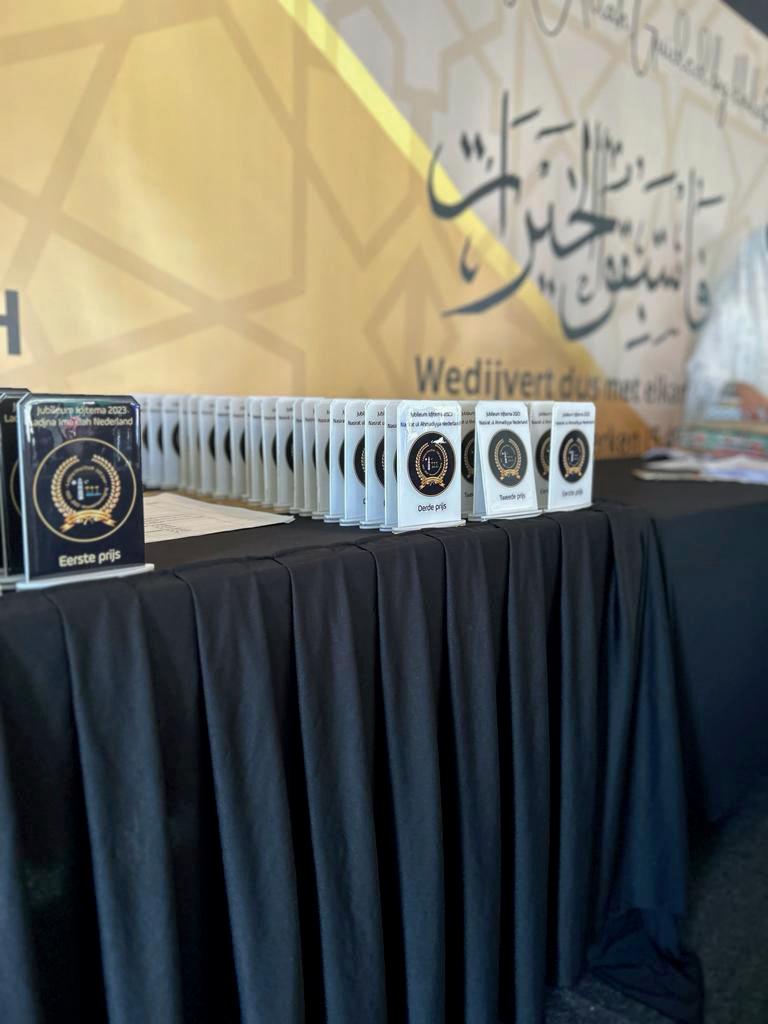
The opening and concluding sessions were simultaneously translated into Dutch. Accommodation was provided at the ijtema
punished owing to their apostasy, and it was only in the case that they rebelled and were guilty of waging war.
A logical fallacy
Hazrat Mirza Bashirudin Mahmud Ahmadra has elaborated on this issue in light of another verse of the Holy Quran, which states:
نيبملا غالبلا الإ لوسرلا ىلع امو
“And the Messenger is not responsible but for the plain delivery of the Message.”
(Surah al-Nur, Ch.24: V.55)
Hazrat Mirza Bashiruddin Mahmud Ahmadra states:
“This is the summary of the entire Quran in that religious people use the power of their argument to convince others and not through compulsion. It is a pity that up till now the world has failed to understand this point, and even amongst the Muslims, death as the punishment for apostasy is considered lawful.”
He continues to write that regardless of which religion is right or wrong, the adherent of every faith considers his faith to be true. Therefore, if it is deemed lawful for one to take someone’s life simply on the basis of considering their faith to be true and the other’s false, then why can a Christian not kill another Muslim or why does a Hindu not have the right to compel others to adopt the Hindu faith or else they will kill them?
He writes, “Why does the USA not have the right to force the Muslims living in their country to accept Christianity? Why does Russia not have the right to force people to become Christians or communists? If Muslims have the right to force people to adopt the same faith as theirs, then, logically, others also have the right to do the same.
“However, could there be any peace in
site for duty holders and at the Baitun Noor Mosque for guests. Transport arrangements were made between the two sites, and pickup was arranged from local train and bus stations.
Attendance on the first day was 454, and 386 on the second.
the world if such a right were established? By establishing this right, can anyone tell their sons or wives that this is a correct practice in that Christians have the right to force Muslims to become Christians? Likewise, the Muslims have the right to force the Christians to become Muslims; the people of Iran have the right to force the followers of the Hanafi school of thought to become Shia; and the Hanafis have the right to force everyone to become Sunni.
“Thus, this is such an illogical notion that no one can even accept it for a minute. Whenever the nations of the earlier prophets refused to accept divine guidance, God Almighty addressed them, stating:
نوهراك اهل متنأو اهومكمزلنأ
“Meaning: ‘[if you do not wish to accept guidance] shall we force it upon you, while you are averse thereto?’ (Surah Hud, Ch.11: V.29) […]
“If the world were to understand this point, then most surely cruelty and injustices in both religious and political spheres will come to an end. People will neither forcefully impose their faith on others, nor will they try to impose their political agendas on other countries.” (Tafsir-e-Kabir, Vol. 7, pp. 606–607)
Although there is a plethora of proof in the corpus of primary and secondary sources of Islamic literature to prove that there is no punishment for apostasy in Islam, we cannot discuss all of them here. In any case, the few references discussed here are enough to remove all doubt regarding this subject.
For further reading, see The Truth about the Alleged Punishment for Apostasy in Islam by Hazrat Mirza Tahir Ahmad, Khalifatul Masih IVrh: www.alislam.org/library/ books/Apostasy-in-Islam.pdf
17 AL HAKAM | Friday 29 September 2023
Photo courtesy of AMJ Netherlands
Prophets of Allah
Prophet Ahmad: The perfect follower of Muhammad
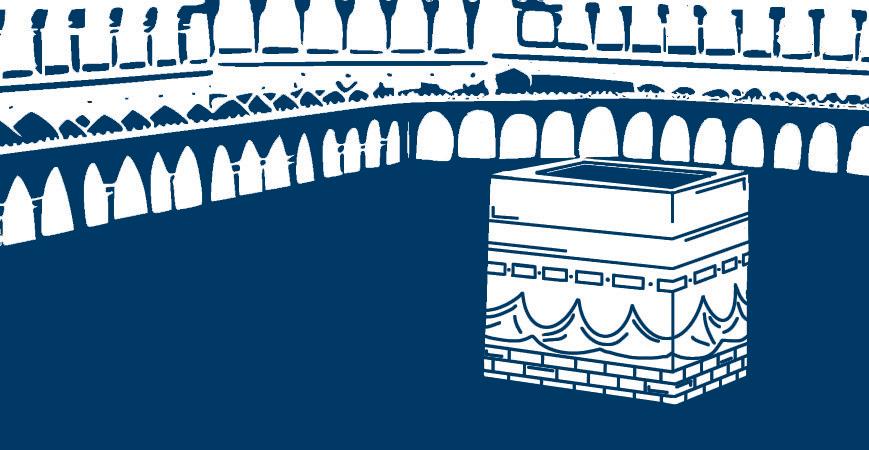

Jalees Ahmad
Al Hakam
Ahmadas was a Prophet of Allah and the awaited Promised Messiah and Mahdi. Prophet Muhammadsa, in Sahih Muslim, addressed the coming of the Latter-Day Messiah as “Nabiullah,” which means Prophet of Allah. (Sahih Muslim, Kitab alFitan w ashrat al-Saa’ah, Hadith 2937a)
Ahmadas, who was born in Qadian, a small town in India situated to the east of Damascus, had been deeply devoted to the Islamic faith since his early childhood. In fact, from a very young age, he was known as a maseetar, a term used to describe someone who dedicated their entire time to the mosque, engaging in religious practices and devotion.
Persian roots of Ahmadas
His lineage can be traced back to Haji Barlas, the uncle of Amir Timur, who was closely associated with the renowned Barlas tribe. This tribe had a rich history in the region of Kish, a part of ancient Sogdiana, with Samarkand as its capital. Notably, the Sogdians were of Iranian origin. The names “Samarkand” and “Barlas” themselves have Iranian roots, and Samarkand is recognised as an Iranian-derived term. Furthermore, Mirza Hadi Baig, an ancestor of Hazrat Mirza Ghulam Ahmadas, hailed from Samarkand and migrated to India, possibly with Babar, the first Mughal Emperor. These historical connections and the Iranian heritage of the Barlas tribe strongly indicate that Hazrat Mirza Ghulam Ahmadas was of Persian descent, despite being commonly referred to as a Mughal in India. For a deeper read, please see Life of Ahmad, pp. 8-25.
Surah al-Jumu‘ah and the prophecy about ‘Ahmad’
In Surah al-Jumu‘ah, Allah states:
“He it is Who has raised among the Unlettered [people] a Messenger from among themselves who recites unto them His Signs, and purifies them, and teaches them the Book and wisdom, although they had been, before, in manifest misguidance; And [among] others from among them who have not yet joined them. He is the Mighty, the Wise.” (Surah al-Jumu‘ah, Ch.62: V.3-4)
The verse and a renowned and often quoted saying of the Holy Prophetsa both allude to the Second Coming of the Holy Prophetsa, which will manifest in the form of the Promised Messiah during the Latter Days. The following incident has been mentioned in Sahih al-Bukhari, Muslim,
Jami‘ at-Tirmidhi.
Hazrat Abu Hurairara narrated: “While we were seated with the Holy Prophetsa, Surah Jumu‘ah was revealed to him. When the verse, ‘wa akharina minhum lamma yalhaqu bihim’, that is, ‘And others from among them who have not yet joined them’, was recited by the Holy Prophetsa, I enquired, ‘Who are they, O Allah’s Messengersa?’
The Holy Prophetsa did not respond until I repeated my question three times. At that moment, Salman al-Farisira was among us. Allah’s Messengersa then placed his hand on Salmanra and said, ‘Even if faith ascended
Hadith 2641)
The decline of Islam in light of this hadith is crucial to understand. Why did Prophet Muhammadsa say that his Ummah would follow the same path as the Children of Israel? To truly comprehend these prophetic words, we must look at the actions of the Children of Israel that the Holy Quran describes and how Muslims have similarly erred and followed the same path, as stated in the above hadith.
One of the most well-known actions taken by the Children of Israel was their rejection of the Messiah of their time. By rejecting Jesusas, who was a Prophet sent to Bani Israel, they continue to await the coming of the Messiah. The reason for their rejection was their belief that Elijahas had ascended physically, and they anticipated his physical return.
Now, when we examine the Muslim ummah, what do we observe? We find that they too rejected the Messiah of their era, Hazrat Ahmadas, just as they await the physical descent of Jesusas, a Prophet sent to the Children of Israel.
(Lecture Sialkot [English], p. 69)
His deep devotion to the Holy Prophet is clearly evident in the following excerpt:
“I swear by God, if these people had murdered my children before my eyes, and cut my sincere friends into pieces, and had killed me with great humiliation and had possessed themselves with all my possessions, I would still have not been so pained and my heart would not have been so grieved as compared to the pain that I feel by the insults thrown at the Holy Prophetsa.” (Aina-e-Kamalat-e-Islam, Ruhani Khazain, Vol. 5, p. 15)
Another incident is as follows:
“Once I received a revelation that indicated that there was a vigorous discussion in the High Assembly in Heaven. That is, God’s will for the revival of the Faith was surging, but the appointment of the man to revive the Faith was not yet disclosed to the High Assembly, and this is why they were in disagreement. It was at this time in the dream that I saw people searching for a revival. A man appeared before my humble self, and, pointing towards me, he said:
to the Pleiades [completely disappearing from the earth], there would be some from his people [in another version, “one man” is mentioned instead of “some people”] who would restore faith [back] to earth.’” (Sahih al-Bukhari, Kitab at-tafsir, Hadith 4897)
Additional teachings from the Prophet Muhammadsa indicate that the Messiah’s arrival would coincide with a period when only the words of the Quran would remain, and the essence of Islamic teachings, represented by its name, would be lost:
Defender of Islam and devotee of Prophet Muhammadsa
Hazrat Ahmadas claimed to be the Promised Messiah and Mahdi, who was destined to come in the Latter Days. In his book, Kitabul-Bariyyah, Hazrat Ahmadas recounts a dream he saw in which a holy figure suggested fasting as a tradition in preparation for receiving heavenly light.
“This means that, this is the man who loves the Messenger of Allah.” (Barahin-eAhmadiyya, Part 4, p. 379)
همسر ا إ نآ��لا نم
ىقبي ال Prophet Muhammadsa is reported to have said: “A time is soon coming to mankind when nothing of Islam but its name will remain and only the written form of the Quran will remain.” (Mishkat alMasabih, Kitab al-‘ilm, Hadith 276)
Then, we also read:
“What befell the children of Isra’il will befall my ummah, step by step, such that if there was someone who had intercourse with his mother in the open, then there would be someone from my ummah who would do that. Indeed, the children of Israel split into 72 sects, and my Ummah will split into 73 sects. All of them are in the fire except one.”
The Holy Prophetsa was asked which sect it was, to which he replied: “What I am upon and my Companions.” (Jami‘ at-Tirmidhi,


Hazrat Ahmadas states that he followed this practice for an extended period and experienced numerous visions, including encounters with past Prophets and revered Muslim saints. (Kitabul-Bariyyah, Ruhani Khaza’in, Vol. 13, pp. 197–200, footnote)
Hazrat Ahmadas spent much of his youth defending Islam against allegations raised by Christian missionaries who frequently delivered open-air speeches. Abundant literature from eyewitnesses attests to his noble character, even before he was commissioned as a Prophet of Allah. Before receiving prophethood, he would have dreams that would later come true, just as did his master, the Holy Prophet Muhammadsa
His love for the Holy Prophetsa was profound; in fact, on many occasions, he stated that Allah bestowed prophethood upon him because of his utmost devotion to Prophet Muhammadsa
Hazrat Ahmadas once wrote:
“Next to God, I am inebriated with the love of Muhammadsa; if this be disbelief, then by God I am a great disbeliever.”
Hazrat Ahmadas: The defender of Islam and author extraordinaire Hazrat Ahmadas authored over 80 books, each providing Muslims with compelling arguments to defend the faith of Islam while also expounding upon its beauties. His book, Barahin-e-Ahmadiyya, is replete with such arguments. He received immense praise for his works, with some even asserting that the service Hazrat Ahmadas rendered to Islam is unparalleled.
After being commissioned as the reformer, Mahdi, and Messiah, he continued to produce more books, championing the glory of Islam, which, as prophesied by the Holy Prophet, was in dire need of revival. Thus, Hazrat Ahmadas was raised as the reformer of his era.
Divine dreams, revelation and being commissioned
Hazrat Ahmadas, in his book, stated: “In early youth, when one’s natural bent is towards play and sport, I saw in my dream that I entered a house in which there were several people who were my servants and attendants. I said to them: ‘Set up my house and clean up my bed, because my time has come.’ Then I woke up in fear of my life, as the impression on my mind was that I was
Friday 29 September 2023 | AL HAKAM 18
هللا لوسر ﺐحي لﺟر اذه
ﻰﻓ ﺎﻨﺜﻌﺑ ﺪﻘﻟﻭ ﻻﻮﺳﺭ ﺔﻣﺃ ﻞﻛ
“And We did raise among every people a Messenger”
ﺪﻤﺣا
ىقبي الو
همسا الإ مالس�لا نم
ليﰱار�إ ي�ب ىلع ىتأ ام ي�مأ ىلع نيتأي
ﻡﻼﺴﻟﺍ ﮫﯿﻠﻋ
about to die. [A’ina-e-Kamalat-e-Islam, p. 548, Ruhani Khazain, Vol. 5, p. 548]” (Tadhkirah, p. 7)
Hazrat Mirza Bashir Ahmadra explained: “From the words: ‘my time has come,’ the Promised Messiahas understood that he was about to die. However, as subsequent events showed, it meant that the time of his being commissioned as reformer was imminent.” (Tadhkirah, p. 7)
It was in 1882 that it was revealed to Hazrat Ahmadas that he was the reformer of the age. Then, in his book, The Victory of Islam, which was published in 1891, Hazrat Ahmadas writes:
“I shall proclaim it time and time again— the declaration of which I cannot refrain from—that I am the very one who was sent at the appointed time for the reformation of mankind so that the Faith might be firmly planted afresh within the hearts.” (The Victory of Islam, p. 10)
In his book, Izala-e-Auham, published in 1891, Hazrat Ahmadas stated that Allah revealed to him that the Messiahas of Nazareth had passed away. The revelation revealed was:
“Masih Ibn-e-Maryam [Messiah, son of Mary], Messenger of Allah, has died and you have come in his spirit according to promise” (Tadhkirah, p. 240)
He also said, in the same book under discussion: “We have made you Masih IbneMaryam [Messiah, son of Mary]. [Urdu] Tell them: I have come in the footsteps of Jesus. They will say: ‘We have not heard any such thing from our ancestors’ Respond to them that: Your knowledge is limited; God knows best. You are content with the letter and obscurity. The true reality has not been disclosed to you. He who realises that the foundation of the Ka‘bah was a design of divine wisdom is very wise, for he has partaken of the mysteries of the universe. One of high resolve will be born. He will be like you in beauty and benevolence. He will be of your progeny. [Persian] [Son, delight of the heart, high ranking, noble;] [Arabic] [A manifestation of the True and the High, as if Allah had descended from heaven. You will pass through different periods with different companions and will behold distant progeny. We shall bestow upon you a good life; eighty years or thereabouts.]”
([Izala-e-Auham, pp. 632–635, Ruhani Khazain, Vol. 3, pp. 441–443], Tadhkirah, pp. 242-243)
In light of his prophethood, Hazrat Ahmadas issued a leaflet titled A Misconception Removed, in which he stated:
“Wherever I have denied being a Prophet or Messenger, it has only been in the sense that I have not brought an independent law nor am I an independent Prophet. I am a Messenger and Prophet only in the sense that I have received spiritual grace from the Messengersa whom I follow, and, having received his name for myself, and through him, I have received knowledge of the unseen from God. But I have not come with a new law. I have never denied being called a Nabi (Prophet) in this sense. Indeed it is in this very sense that God has addressed me as Nabi and Rasul; and it is in this sense that I do not deny being a Nabi or Rasul.” (A Misconception Removed, p. 10)
‘Our Mahdi’: The lunar and solar eclipses
Prophet Muahmmadsa prophesied:
“For our Mahdi [Spiritual Reformer], there are two signs that have never appeared before since the creation of the Heavens and the Earth, namely that the Moon will be eclipsed on the first night in Ramadan [i.e., on the first of the nights on which a lunar eclipse can occur] and the Sun will be eclipsed on the middle day [i.e., on the middle one of the days on which a solar eclipse can occur]. And these signs have not appeared since God created the Heavens and the Earth.” (Sunan ad-Daraqutni, Kitab al-eidain)
The arrival of the Promised Messiah in the last age is undisputed, and one of the signs of the Latter Days is the convergence of the Sun and the Moon, as stated in the Holy Quran:
“He asks, ‘When will be the Day of Resurrection?’ When the eye is dazzled, And the moon is eclipsed, And the sun and the moon are brought together,” (Surah alQiyamah, Ch.75: V.7-10)
This refers to a solar and lunar eclipse that occurred during the time of the LatterDay Messiah, Hazrat Ahmadas, aligning with the prophecy in a hadith in the month of Ramadan.
In light of the Hijri Calendar, lunar eclipses occur on the 13th - 15th days, and solar eclipses on the 27th - 29th days. As per the prophecy, lunar eclipses fall on the 13th of Ramadan, and solar eclipses on the 28th. Thus, in 1894, lunar and solar eclipses occurred on March 21 (13th Ramadan) and April 6 (28th Ramadan). In 1895, again, it occurred on March 11 and March 26, aligning with the same Ramadan dates in Qadian, although not visible there.
Prophecies about the Latter Days in the Holy Quran
Surah at-Takwir, chapter 81 of the Holy Quran, was revealed in early Mecca, most likely in the 6th year of the Prophet Muhammad’ssa mission. This Surah primarily focuses on the concept of the Final Resurrection, which has two phases: the first occurred with the advent of Prophet Muhammadsa and the revelation of the Quran, and the second is to happen with the coming of the Promised Messiah and Mahdi, as hinted at in 62:4. This is why the Latter Days, the Messiah, and the Mahdi are interconnected.
This Surah addresses the anticipated revival of Islam under the Promised Messiah and the profound global changes it would usher in. The Surah commences by depicting these forthcoming transformations and briefly alluding to the moral decline among Muslims at the time and its underlying causes. The message of the Surah also implies that Islam, being God’s final message, will ultimately prevail and herald a dawn of success.
Below are a few examples:
“When the sun is wrapped up.” (81:2)
A simple study of the Holy Quran shall reveal that it refers to the Holy Prophet Muhammadsa as the “Bright Sun” (25:62). Hence, this verse can be interpreted as follows: When there is spiritual darkness prevailing globally, signifying the dimming or complete disappearance of the light of the
Spiritual Sun as mentioned in the hadith of Mishkat al-Masabih, Kitab al-‘ilm, Hadith 276. Then, we read:
“And when the stars are obscured.” (81:3)
The word nujum, which is the plural of najm, means stars. It is often used to refer to religious scholars. Hence, there’s a famous saying:
متيدتها
متيدتقا مهيأب موجنلاك ىباحصأ
Meaning: “My Companions are like stars; whoever you follow among them, you will be rightly guided”. In this context, the verse means that when religious leaders lose their influence.
Further, we read:
“And when the she-camels, tenmonth pregnant, are abandoned.” (81:5)
This verse highlights how camels, which were once the main mode of transportation, will be replaced by modern means like trains, steamships, cars, and aeroplanes. There’s a clear indication of camels being replaced by other forms of transportation in a saying of Prophet Muhammadsa:
“Camels will be abandoned and not used for travelling.” (Sahih Muslim, Kitab aliman, Hadith 155c).
These are just a few of the signs mentioned for the Latter Days. When we contemplate the Islamic state of the world and witness the fulfilment of these prophecies, we naturally find ourselves asking: Who is the reformer and messenger of the Latter Days alluded to in the Holy Quran and mentioned in that hadith? Who is the individual destined to rescue the Muslim world from the pervasive darkness it has fallen into? Who will rejuvenate the teachings of Islam? Hazrat Ahmadas is indeed the promised one foretold by Prophet Muhammadsa, who received divine revelations from God. He is the “Khalifah of Allah”, of whom the Holy Prophetsa spoke, saying that in the advent of the Messiah, one should go to him and pledge his allegiance, “even if you have to crawl over snow, for he is the Khalifah of Allah, the Mahdi.” (Sunan Ibn Majah, Kitab al-fitan, Bab khuruj almahdi, Hadith 4084)
Hazrat Ahmadas instructed by Allah to take bai‘at
During the time of Hazrat Ahmadas, prior to him being commissioned – though when he had written books in favour Islam – certain devout and honourable Muslims, including Hazrat Sufi Ahmad Jan, noticed the declining standards of morality and spirituality within the Muslims. He expressed a wish and approached Hazrat Ahmadas, urging him to accept their allegiance (bai‘at). They held a strong belief that Islam needed a revival to prevent Muslims from becoming engulfed in the increasingly materialistic world. However, Hazrat Ahmadas would respond with the following words:
“I have not been commissioned.”
The Promised Messiahas would add, “Since the Almighty Allah has not conveyed anything to me in the matter of bai‘at, it is not proper that I should do so on my own initiative.” (Hayat-e-Ahmad, Vol. 2, p. 150)
When Hazrat Ahmadas was divinely instructed to take bai‘at and start a jamaat, he published an announcement on 1 December 1888, saying:
“I have been commanded to take an oath of allegiance [bai‘at] from seekers of truth who wish to acquire true faith and purity; who yearn to find the path to Allah’s love; who want to give up their foul, slothful and false existence.
“Whosoever finds in themselves the willingness to do this must come to me. I will be their comforter and will do my best to ease their burden. God will bless them through my prayers and my attention, provided they are ready with heart and soul to abide by His conditions. This is a divine command, which I have hereby conveyed. The actual words of the revelation in Arabic are as follows:
[“When you have made up your mind, you must have trust in God. Make an ark under Our eyes and under Our command. Those who will take bai‘at at your hands will really be giving their hands into the hand of God. The hand of God is over their hands.”]
“Peace be on him who follows the guidance.
“Ghulam Ahmad, 1 December 1888”. (Majmuah-e-Ishtiharat, Vol. 1, p. 205) Significance in the Ahmadiyya Jamaat
It is clear from the sirah and hadith that Prophet Muhammadsa had two names, Muhammad and Ahmad. (Sahih Muslim, Kitab al-faza’il, Hadith 2354b)
The name Muhammad represented a phase of glory, exemplified in Medina, where his enemies were dealt with through warfare. In contrast, the name Ahmad symbolised a phase of beauty, exemplified in Mecca, where his second advent would emphasise peace, love, and non-violence. Thus, it was fitting for the Jamaat to be associated with the name “Ahmadiyya” as it aligned with the mission of peace.

Much can be said about Prophet Ahmadas. However, I have limited myself to a few topics only. For a more in-depth study of the life and character of the Mahdi and Messiah of the Latter Days, please refer to the following sources:
- Life of Ahmad by A. R. Dardra
- Life of the Promised Messiah, by AbdulKarim of Sialkotra
- Claims of the Promised Messiah (as) by Hazrat Mirza Tahir Ahmad, Khalifatul Masih IVrh
- Ahmad The Guided One by Iain Adamson
19 AL HAKAM | Friday 29 September 2023
،ضرألاو تاوامسلا قلخ ذنم انوكت مل نيتيآ انيدهمِل نا سمشلا فسكنت و ،ناضمر نم ةليل لوأل رمقلا فسكنت ضرألا و تاوامسلا هللا قلخ ذنم انوكت ملو ،هنم فصنلا يف
اهيلع ىعسي الف صالقلا نكرتتلو
اننيعأب كلفلا عنصاو هللا ىلع لكوتف تمزع اذإ قوف هللا دي هللا نوعيابي امنإ كنوعيابي نيذلا نإ ۔انيحوو مهيديأ
An old view of Qadian
‘The sun does not set on Jamaat-e-Ahmadiyya’
Hazrat Musleh-e-Maud’s address at 1957 Khuddam Ijtema
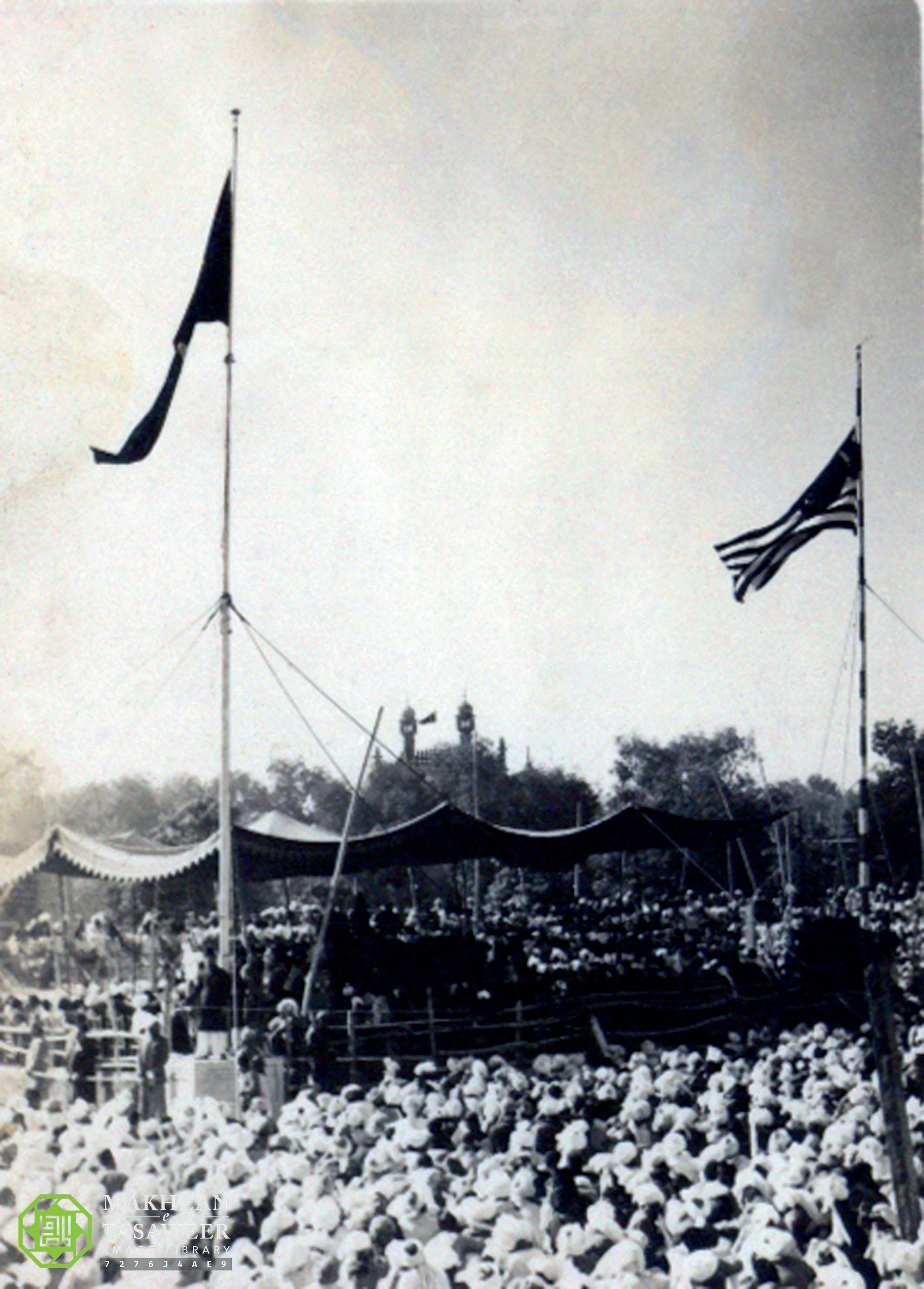
Ata-ul-Haye Nasir
Al
Hakam
On 13 October 1957, Hazrat Musleh-eMaud, Mirza Bashir-ud-Din Mahmud Ahmadra delivered the concluding address at the annual Ijtema of Majlis Khuddam-ulAhmadiyya.
During his address, Huzoorra reminded the Ahmadi youth about the sacrifices and efforts of the Holy Prophet’ssa Companionsra, while fulfilling their duties and responsibilities, despite facing extreme hardship and opposition.
After reciting the beginning verses of Surah an-Nazi‘at, Huzoorra said:
“The verses of Surah an-Nazi‘at which I have just recited, mention the duties of the believers. There are many who call themselves a ‘believer’, however, mere verbal claims are not an achievement. As far as verbal claims are concerned, Musaylimah Kazzab and Aswad Ansi had also claimed prophethood. However, there was a huge difference between their claim and the claim of prophethood made by the Holy Prophetsa The claims of Musaylimah and Aswad did not create any impact, not even equal to the movement caused when a pebble is thrown into water. However, when the Holy Prophetsa proclaimed his prophethood, and the nations of Nazi‘at joined him, it was as if the earth had shaken. There was the Battle of Badr, which was followed by the Battle of Uhud and the Treaty of Hudaibiyah, and then the conquest of Mecca. Meanwhile, many other wars also took place. In short, it was a time of great commotion. [...] The current era is of a similar kind as well, since God Almighty is creating means to once again make Islam victorious over the world, and Ahmadis have been given the responsibility to serve Islam.” (Al Fazl, 15 October 1957, p. 1)
Huzoorra continued by saying that just as the Promised Messiahas earned the status of burooz (spiritual reflection) of the Holy Prophet Muhammadsa by truly following in his footsteps, Ahmadis are also entitled to become the burooz of the Companionsra of the Holy Prophetsa by following in their footsteps:
“Considering the apparent means, it may seem beyond your capacity to fulfil the responsibility that has been devolved on you, however, since the help and succour of God are with you, it will not be a difficult task.” (Ibid.)
Huzoorra further said that members of the Jamaat are required to continue their tabligh [preaching] efforts, to build mosques around the world, and to never lose heart considering the limited amount of means:
“Therefore, it is very crucial for you to never get disheartened, but rather, you ought to recognise your status; that God Almighty has chosen you to fulfil this duty. Hence, it is your duty to accomplish this task. You must realise your responsibilities and busy yourselves in prayers [du‘a]. You should never lose heart, no matter how much effort you may need to exert or have to endure severe hardships. In fact, these sufferings and hardships, while serving Islam, should make you pleased and proud. If you inculcate within you this spirit, you shall receive the opportunity to serve Islam till the Day of Judgement.” (Ibid., p. 8)
Huzoorra went on to narrate some incidents that exhibited the sacrifices and selflessness of the Holy Prophet’ssa Companionsra. Huzoorra said that they showed great selflessness and had a passion to offer every possible sacrifice for the service of Islam. They endured many pains and sufferings in the way of Allah and deemed it a source of pleasure and pride. Whenever there was any danger to the Holy Prophetsa, his companions were not hesitant to even sacrifice their lives.
“Thus, whenever you have to endure hardships and sufferings in the way of Faith, it should never make you disheartened, but rather, you are required to consider those hardships and sufferings as a blessing from God Almighty and to continue fulfilling your duties with even greater passion and sincerity. It has been stated in the words اقرغ تعزنلاو [By those who draw {people to true faith} vigorously. (Surah an-Nazi‘at, Ch. 79: V. 2)] that upon facing hardships, a believer begins to fulfil their duties with more vigour, and immerse in their responsibilities so much that they forget about the whole world. Therefore, inculcate within you sincerity, get ready with the passion of truthfulness, and devote your heart, wealth and life to fulfil the duties given to you.” (Ibid.)
While shedding light on the importance of building mosques in Europe, America, and other parts of the world, Huzoorra said:
“At present, we have built only three mosques in Europe [Fazl Mosque in London, Fazl-e-Omar Mosque in Hamburg, and Mubarak Mosque in the Hague]. However, we should not be satisfied by building only three mosques, since they cannot be enough to spread Islam in Europe. My wish is that we should build at least ten more mosques as soon as possible in some big European cities. It does not mean that those ten mosques would be enough to fulfil our objectives; rather, we would need to increase that number to 50, then to 5,000, and so forth. You are the followers of that person
who has been commissioned by God to establish mosques all over the world.” (Ibid.)
Huzoorra continued by saying that at the time, building 50 mosques required around 10 million rupees, which was a huge amount considering the available means; however, if Ahmadis exhibit a great passion for sacrifice, this amount could surely be raised:
“If we are able to build 2,500 mosques in Europe, the slogans of takbir [supremacy of Allah] could be raised in all corners of Europe, [...] and the calls of Allahu-Akbar [Allah is Great] will simultaneously echo throughout Europe. [...] In addition to Europe, we will build mosques in America as well, and the calls of Allahu-Akbar [Allah is Great] will echo in all of its corners as well.” (Al Fazl, 16 October 1957, p. 3)
Huzoorra further said:
“There was a time when it was
proclaimed that the sun did not set on the British Empire. Now, Jamaat-e-Ahmadiyya is spreading to faraway places in the East and West, and we can say that the sun does not set on Jamaat-e-Ahmadiyya. [...] My desire is to build mosques in all parts of the world so that the name of the One God may echo in the world, where the call of the Trinity has been echoing for a long time. It will be possible only when you continue to pray [du‘a] and fulfil your responsibilities enthusiastically with true zeal and sincerity.” (Ibid.)
Huzoorra concluded by saying that Ahmadi youth are required to make every possible effort to achieve this goal, and if they do so, the day is not far away when the victory of Islam shall be acknowledged throughout the world.
Friday 29 September 2023 | AL HAKAM 20
100 Years Ago...
Ahmadi missionaries spread Islam in London
Al Fazl, 2 October 1923
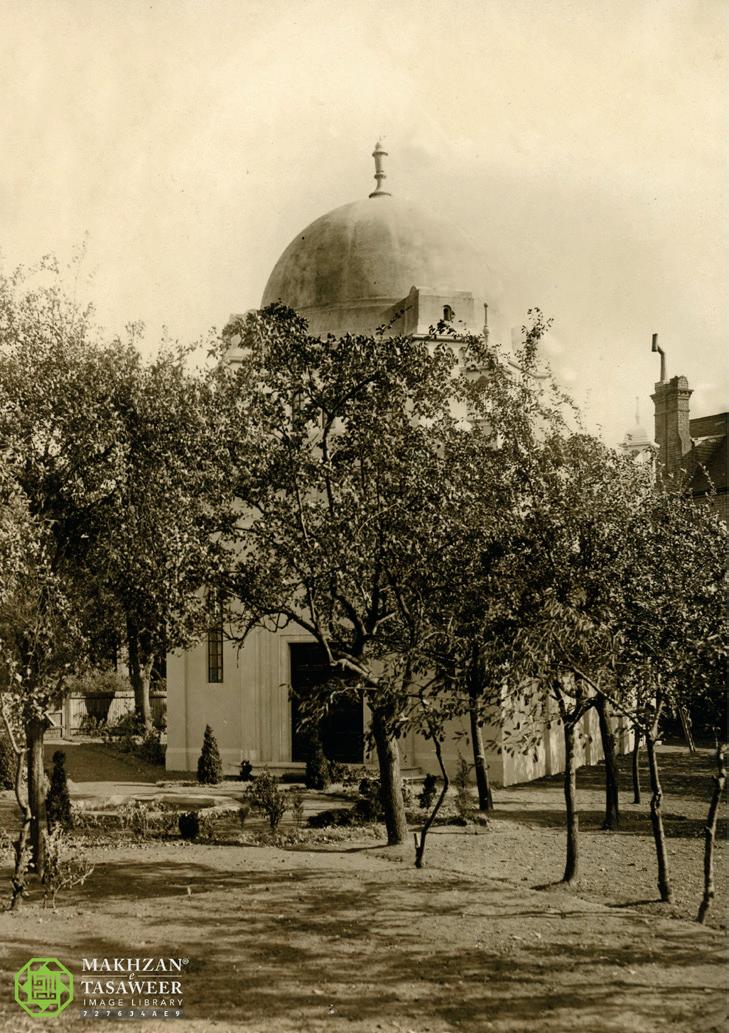
Hazrat Maulvi Abdur Rahim Nayyarra (1883-1948)
Surprisingly, summer is a blessing in these cold regions [of Europe]. The sun that produces scorching heat in the plains of Northern India during the hot summer days is called the pleasant summer sun over here, and, in this season, everyone tries to spend as much time as possible in the fresh air. We are trying our best to take advantage of this natural tendency of the people and spread the [message of] truth to the general public here.
The missionary of the Ahmadiyya Jamaat, wearing a green turban, fulfils his duty to preach the religion [of Islam] founded by Muhammadsa of Arabia by infiltrating the ranks of Christian preachers right in the middle of London. The Christian missionaries working in the surrounding areas are becoming aware of the manner in which Ahmadis present their arguments. Many useful and interesting discussions are held at every single gathering. “You are our strongest rival” is a phrase used by Christian preachers here. But at the same time, our English friends are obliged to say, “You are very intelligent and well-mannered.”
We are performing our duty of tabligh [preaching] and observing with clear insight that, on the one hand, there is apparently indifference to religion and the churches are empty, but on the other, the feeling of the need for religion is also
growing stronger. The Christian faith founded on the crucifixion [of Jesus] and preached in churches is crumbling. On the other hand, people are accepting the actual details of the crucifixion mentioned in the Holy Quran. Though today the wise Englishman laughs at the words of the old Dravid, the day is well nigh when they shall witness the Promised Messiahas in his full glory and openly accept that the Messiah has come.
they will start calling me Jesus. The days are few in being called the Antichrist.”]
Opposition
Hostility towards the Ahmadiyya Jamaat is nothing out of the ordinary, as the truth has always been opposed, and it ought to be [for its spread]. However, the opponents continue to secretly plot against us. By the grace of Allah the Almighty, their [vile schemes] do not have any effect on us. Our opponents used to sugarcoat quinine [i.e., hide the truth] and then present it to the people, but they quickly forgot the real quinine [truth]. Soon they will realise that the fever [of evil] will only dimmish through quinine [i.e., the truth] itself. And then Islam – yes, the real and true Islam –will spread through the efforts of Prophet
Ahmadas, the Promised Messiah, and his Jamaat, by respecting and honouring the institution of Khilafat, which is required to be obeyed. Unless the troops of Ahmadiyyat gather at Chatalja under one leader, it is difficult to protect the Muslims and reconquer Oran.
Miscellaneous
The series of weekly meetings and preachings on an individual basis are being carried out unabated by the grace of Allah. Last week, Dr Sulaiman Yusuf Ahmadi of South Africa gave a lecture on Surah alFatihah, in which he mentioned the arrival of the chosen one of God Almighty, the Promised Messiah and his miracle of the exceptional tafsir [interpretation] of Surah al-Fatihah in an excellent and most effective manner.
Chaudhary Maula Bakhsh Janjua BA of Oxon (Barrister-in-law) is currently busy preparing for London University’s LLB examination and is living in Darul Tabligh [mission house] along with his wife. Shaikh Zafar Haq Khan Sahib, BSc of Wales, is engaged in assisting in correspondence work and helping set up the mission library. He is aiming to appear in the Indian Civil Service Examination.
Mr Gabrial Martin, former General Secretary of the Nigeria Jamaat, is preparing for the Cambridge University Entrance Examination.
Prayer
All these friends who are staying in Darul Tabligh and all the Ahmadi students who are studying in and outside of London, including Sahibzada Abdul Rahim Khan Sahib, Syed Hafiz Mahmudullah Shah Sahib, and Seth Ali Muhammad Abdullah Sahib, request [members of the Ahmadiyya Jamaat to] pray for their success.
(Translated by Al Hakam from the original Urdu, published in the 2 October 1923 issue of Al Fazl)
4th Jalsa Salana held in Mexico
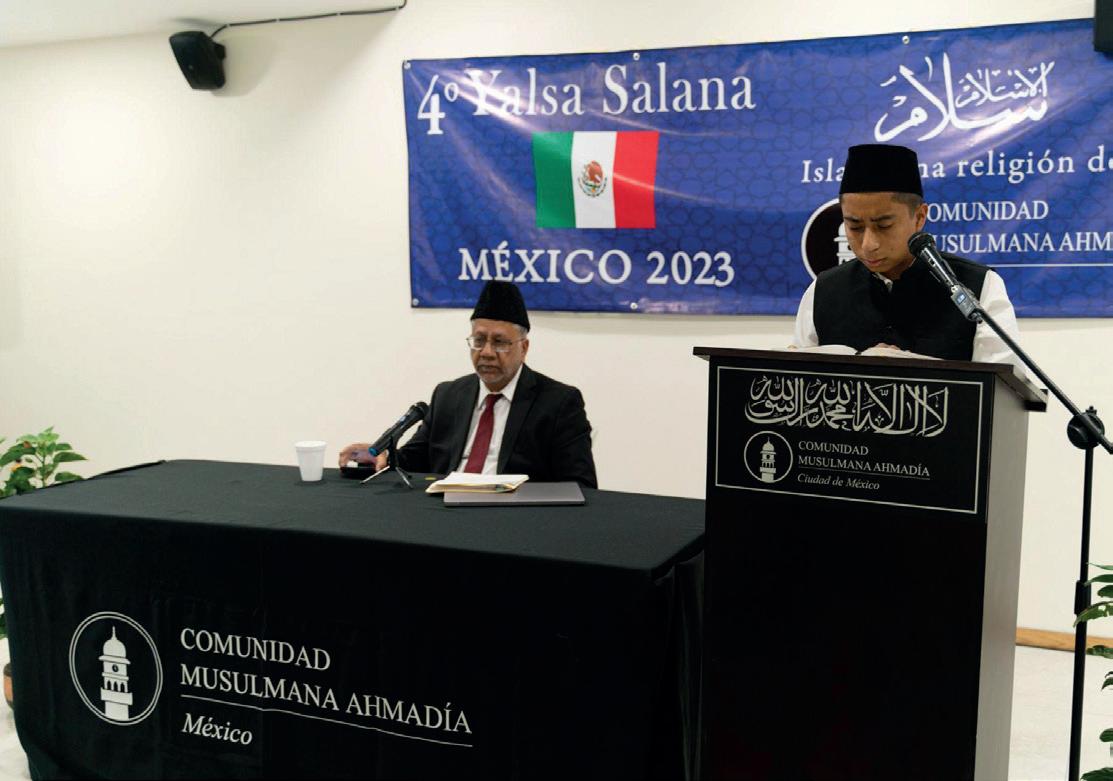 Amen Aqeel Haider Mexico Correspondent
Amen Aqeel Haider Mexico Correspondent
Jamaat-e-Ahmadiyya Mexico held its 4th Jalsa Salana on 18 and 19 August 2023, at the headquarters of the Jamaat in the Baitul Afiyat Mosque. The theme for this year’s Jalsa Salana was “Islam – the Religion of Peace”. 86 people attended the Jalsa Salana this year. There were also guests present from the United States of America.
Along with the five daily prayers, congregational Tahajjud prayers were also offered each morning throughout the Jalsa Salana.
Jalsa Salana proceedings commenced as usual on Friday, 18 August, however, before
any speech, a letter from Hazrat Khalifatul Masih Vaa with a special message for all attendees was read out in Spanish. As Mexico Jamaat consists primarily of new converts, out of three sessions, two concluded with an open question-and-answer session for all guests, which was greatly beneficial and appreciated.
On Saturday, Lajna Imaillah Mexico held their own separate programme focused on the topics of the rights and responsibilities of Ahmadi Muslim women and the importance of purdah
Saturday afternoon concluded with a guest session, in which various government officials, religious leaders and educators were present. A few guests also shared
their thoughts and sentiments during the concluding session and expressed that they were delighted to be invited to a Muslim gathering, as they had never had this kind of opportunity before.
Jalsa Salana Mexico was also streamed live on various platforms. The event concluded with a silent prayer.
21 AL HAKAM | Friday 29 September 2023
مجھے گے �رپکا ٰیس�ع جب ہے تیآ یگھڑ ہو ند کے نےکہلا لا�د گئے ہر ےڑتھو تو با [“The time is nigh when
Photo courtesy of AMJ Mexico
Pedaling with Ansar Journeying to Germany Jalsa on two wheels
In August 2023, I embarked on an 850-kilometre cycling journey with fellow Ansar brothers across various terrains. This expedition was not merely a test of physical endurance but a journey for the sake of Allah that culminated in the Jalsa Salana Germany 2023.
Preparation
In anticipation of this voyage, I dedicated weeks to preparation, whether it was through outdoor cycling or immersive indoor sessions on platforms like Zwift. My preparations extended to stockpiling energy bars, gels, recovery supplements, bike accessories, and clothing sufficient for two individuals. As I stood at the threshold of this adventure for the second time, a blend of nervousness and excitement coursed through me. This time around, a notable distinction marked the journey – I was now part of an Ansar team.
In the lead-up to our journey, I trained diligently, conscientiously avoiding the risk of pre-trip injuries by refraining from overexertion. With a heightened awareness of the importance of health amidst the looming spectres of COVID-19, flu, and colds, I diligently practised self-isolation in the days leading to our commencement.
Fajr behind Huzooraa and the beginning of an amazing journey
On the morning of 26 August 2023, I embarked on my journey, setting out around 4:30 am for Islamabad. My mission was to observe Fajr prayer behind our beloved Huzooraa. This served as the ultimate source of motivation and blessing, setting the stage for our formidable 850-kilometre journey, complete with a gruelling 3500-metre ascent and a relentless 40 hours of riding over six days.
Our voyage commenced as we arrived at Dunkirk. We methodically cycled out of the ferry, securely clipped into our pedals, and charted our course towards Ostende. This leg of the journey, characterised by flat terrain, stood out as the shortest among our tour routes. For the most part, we pedalled in two groups, occasionally reuniting as one cohesive unit. This marked the beginning of an opportunity to build enduring friendships among our Ansar brothers. Our primary objective was to provide support to each other, ensuring the successful completion of each day’s ride. Riding as a group proved more manageable than traversing the path alone. We paused on several occasions, receiving attentive care from the Belgian
support team, our steadfast companions for the initial three days as we journeyed towards Germany. Our first evening was spent at a hostel in Ostende, where we methodically loaded our bikes into the van. We dined alfresco on the cobbled roadside, adjacent to the hostel, before indulging in refreshing showers, culminating in a welldeserved night’s rest.
Route to Bait-us-Salaam, Dilbeek, Belgium
The following morning marked the inception of our route to Dilbeek – a lengthier journey, albeit one characterised by relatively flat terrain. Our day commenced with a departure from the cobblestone-laden centre, navigating our way towards the picturesque canal-side bike paths. Initially, we encountered a roadblock due to ongoing construction on our designated route. Fortunately, we crossed paths with a benevolent elderly cyclist who guided us through a detour, reuniting us with our intended path. At the midpoint of our journey, we paused at a rest area adorned with park benches, partaking in homemade baguettes thoughtfully provided by the Belgian support team. It was on this day that a niggling pain began to take shape on the right side of my knee. My initial impulse was to persist despite the mounting discomfort, forgoing any consideration of its intensity. Given the extensive mental and physical preparation invested in this journey, I refused to entertain the notion of sidelining myself at any point. We soldiered on as a united front, with me positioned at the rear, a role I personally favoured, as it allowed for a smooth, cadence-preserving ride and mitigated the risk of major flareups in my ailing right knee.
On the evening of the second day, after reaching Bait-us-Salaam Mission House, we endeavoured to clean our bikes, utilising a provided hose pipe and applied lubrication to our bike chains in anticipation of smoother rides in the days ahead. This collective activity served to bring us even closer together, fostering reflection on our previous rides and kindling anticipation for the challenges and adventures looming over the next four days of riding. The subsequent morning marked the commencement of the first 100-mile leg of our tour – a day featuring a demanding ascent, unlike the initial two days.
100-mile leg to Mansoor Mosque, Aachen, Germany
Our journey began promptly at 7:30 am to ensure that we would reach our destination during daylight hours, accounting for both planned and unforeseen stops. Following our morning meal, a daily ritual, all Ansar UK cyclists meticulously inspected their tires, bottles, and bike accessories, adhering to the customary routine. Just as we were poised to embark on our day’s ride, a member of our team discovered the first puncture of the tour. Our strategy dictated adherence to our carefully crafted schedule, with a couple of cyclists staying behind to rectify the puncture and rejoining us shortly along the route. Beyond the daunting length and challenges of the day, this marked our inaugural encounter with punctures and cleat changes. Cleats, the disposable components that facilitate engagement with the bike pedal, took centre stage. Amidst these activities, I ensured an ample supply of Ibuprofen and Paracetamol, providing a semblance of relief from the pain that dogged me throughout the ride.
This particular ride evolved into the most physically arduous and painful experience I had encountered in all my cycling endeavours. As I approached the culmination of this gruelling 100-mile journey, I experienced a curious paradox—I felt as physically robust as ever, yet my ailing knee posed an insurmountable hurdle. Contemplating alternative options that would serve both myself and the team, I found solace upon reaching Mansoor Mosque in Aachen. There, I made the decision to move from the saddle to the support van, determined to contribute to the team’s overall experience during the remaining three days of cycling— an undertaking poised to be the most demanding of all. The ensuing days promised wet and muddy terrains, making it imperative to afford our bikes a swift cleansing in preparation for another 100mile ride the following morning, albeit with slightly less elevation than the present day. The gracious hosts at Mansoor Mosque orchestrated an evening meal that was both hearty and delectable. Following Maghrib and Ishaa salat, we all found solace in relaxation. Some devoted their time to swift bike checks, while others busied themselves with last-minute puncture repairs.

The subsequent morning bore witness to a myriad of emotions stemming from my decision to support the team rather than ride. However, an irrefutable realisation swept over me: before being an avid cyclist, I was a nasir—an Arabic term denoting a helper or supporter. My role had transitioned from trailing the group on a bicycle to persistently leading from the support van, navigating the path for both myself and the support team. Utilising a suite of apps, including Strava, Komoot, and Google Maps, we endeavoured to maintain our position ahead of the cyclists, halting every 30-40 kilometres. This position afforded us proximity in the event assistance was required—be it to aid a struggling rider, repair a roadside puncture, or as a last resort, secure swift bike servicing at the nearest shop.
Journey to Tahir Mosque in Koblenz
The fourth day commenced as the cyclists set out at 7:30 am, adhering to their meticulously planned schedule. Departing from Mansoor Mosque in Aachen, their ultimate destination lay at Tahir Mosque in Koblenz. In the predawn hours, we collectively rose for Fajr prayer, transitioning into our cycling attire before partaking in a hearty breakfast. The departure was imbued with warmth and well-wishes, a lovely send-off from the mosque culminated in a silent prayer, earnestly beseeching for a
Friday 29 September 2023 | AL HAKAM 22
Masood Nawaz Malik UK
Unsplash| Andrew Gook
safe, incident-free, and accident-free ride. Assuming our roles as the support team, we meticulously tied up loose ends, ensured the van was loaded, and departed around 8 am, setting our sights on rendezvousing with the riders approximately 40 kilometres into their journey – a mere two hours after their departure. This newfound responsibility involved orchestrating navigation from the van, coordinating with the respective support teams from the German Jamaat, and, most critically, forging a camaraderie with our driver. Our harmonious collaboration was paramount, combining our unique skills to deliver an exceptional support service to the cyclists. Although this role had not been a part of my initial preparation, I had grown passionate about ensuring that I executed it to the best of my abilities.
The fourth day unfurled with its fair share of challenges – a roadside puncture necessitated repair, another bike was conveyed to a local repair shop, and we restocked supplies for the cyclists, ranging from painkillers to herbal medicine. Additionally, we acquired a new pair of cleats. The day was a whirlwind of activity, dedicated to resolving all bike-related issues and ensuring an even distribution of nutrition along the route. Our support van managed to arrive ahead of the cyclists at Tahir Mosque in Koblenz, where we were poised to receive them and capture footage of their arrival, marking the conclusion of the fourth day of riding.
Tahir Mosque to Ehsan Mosque in Mannheim
The morning of the fifth day dawned, bringing with it the longest ride of our tour – a daunting 110 miles in distance, coupled with an average elevation that diverged from our previous rides. This ambitious journey saw us pedalling from Tahir Mosque in Koblenz to Ehsan Mosque in Mannheim. The paramount challenge of the day lay in the imperative to complete this formidable ride during daylight hours. This task assumed even greater complexity given the mixed abilities of our cyclists, whose ages spanned from the early 40s to the late 60s. Our day commenced with a solemn prayer,
with the support van departing shortly after the riders. Prior to our rendezvous with them on the route, we assumed the role of procurement, acquiring essentials for the cyclists as per their requests – these included bandages, additional painkillers, and Voltarol gel. Further, we coordinated with the local German support team, slated to accompany us for a segment of the route. Today’s journey promised to be the most scenic yet, weaving together dedicated bike paths and scenic roads tracing the picturesque River Rhine. The day unfolded with remarkable intensity, involving shuttle services for a select few riders, a strategic move aimed at enabling the entire team to maintain an optimal pace for a timely finish. While a handful of unexpected pit stops punctuated our journey, one of note was our pause to replace a broken spoke. The ride culminated under a gentle shower of rain, with one final puncture testing our mettle. We promptly retrieved the affected cyclist and arrived at Ehsan Mosque just in time to receive the rest of the riders. Despite the lateness of the hour, the anticipation of one more day of riding and the warm welcome extended by the hosts at Ehsan Mosque in Mannheim invigorated the entire team, infusing them with renewed strength and determination for the final leg of their extraordinary journey.
Final leg to Jalsa Salana Germany 2023 in Stuttgart

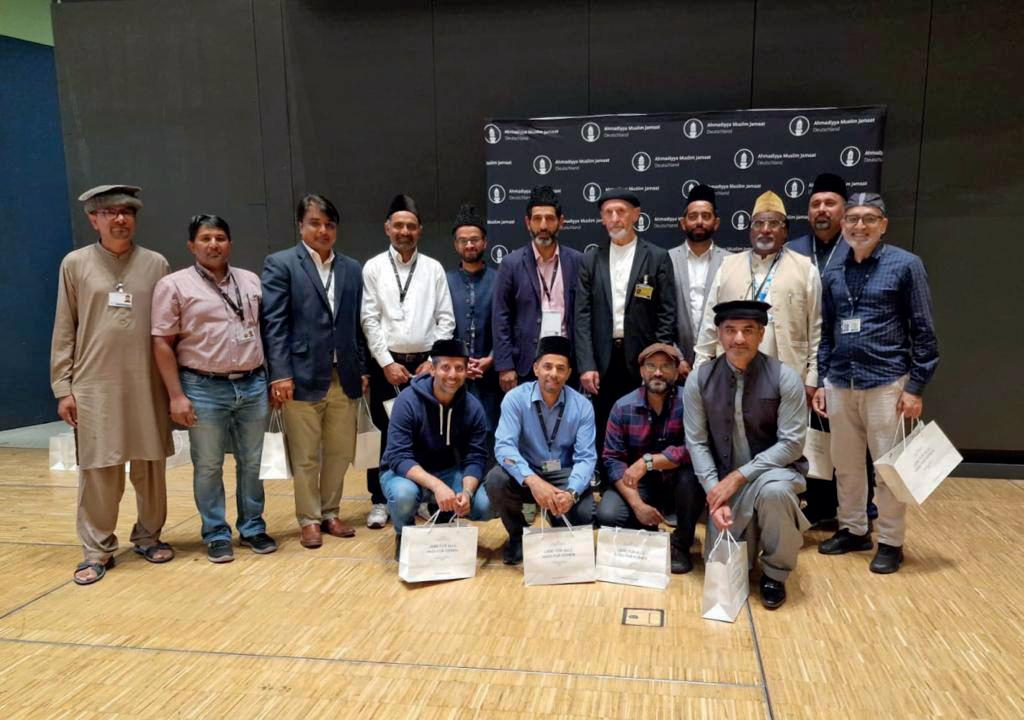
The concluding leg, although the fourth longest of the tour, presented the greatest elevation gain, exceeding 1000 metres. This terrain mirrored the elevation of bike routes around Islamabad and posed a reasonable challenge for seasoned cyclists, yet it may have posed a mild struggle for beginners. Departing from Mannheim, our ultimate destination was the site of Jalsa Salana Germany in Stuttgart. To accommodate this leg, we enlisted an additional support car, replete with extra seats that would prove invaluable for ferrying newer riders up challenging ascents.
On the final day of our journey, we observed some riders grappling with saddle sores, while others contended with bikes that
were showing signs of wear and tear, owing to the demands of the tour. The overarching goal remained constant – to ensure that every participant crossed the finish line before the inauguration of Jalsa Salana Germany 2023. Irreparable bikes were loaded into the back of the support van, with a select few riders availing themselves of our shuttle services in the final moments, determined to soldier through the last few miles of the tour, even as their bikes presented a greater challenge than ever before. The fruits of our collective determination and effort bore witness as every cyclist successfully crossed the finish line, arriving safely at Jalsa Salana Germany 2023 to be greeted by our beloved Huzoore-Aqdasaa – a remarkable conclusion to a historic ride that left an indelible mark on all who participated. Alhamdulillah
This remarkable achievement stands as a testament to the collaborative endeavours of a diverse group of ansar from the United Kingdom, each contributing with varying levels of ability. Personally, I discovered deep inspiration in witnessing the profound accomplishments of the senior members of our team. Their achievements resoundingly validate the words expressed by Huzoor-e-

Aqdasaa on 12 May 2023, during his address to Majlis Ansaruallah Australia, wherein Huzooraa emphasised in these words, “[…] So, ansar can cycle, but you underestimate them […].”
Furthermore, this ride truly embodied the words of Hazrat Khalifatul Masih IIIrh, “[…] In a short time, I want 100,000 ‘Ahmadi Cycles’. An ‘Ahmadi Cycle’ is that which is ridden by an Ahmadi. And these 100,000 Ahmadi Cycles should have the ability to cycle up to 100 miles in a day.” (Mash‘al-e-Rah, Vol. II, p. 384)
This journey was a testament to the power of determination, the bonds of brotherhood, and the unwavering faith that guided every pedal stroke. As the sun set on this epic cycling adventure, it left an indelible mark on the hearts of all those who participated – a journey that proved Ansar can achieve far more than one might ever estimate.

The invaluable life lessons gleaned from this tour underscore the necessity of adapting and embracing newfound responsibilities in times of adversity, all in harmony with our team goal.

23 AL HAKAM | Friday 29 September 2023
Photo courtesy of the Author
Friday Sermon
Messe Stuttgart, Germany

1 September 2023
Jalsa Salana Germany 2023: Best ways to celebrate the centenary
After reciting the tashahhud, ta‘awwuz and Surah al-Fatihah, Hazrat Khalifatul Masih Vaa stated:
Today, after four years of [Covid-19] restrictions, the Jalsa Salana [annual convention] of Jamaat-e-Ahmadiyya Germany is taking place on a large scale. May Allah the Almighty enable all the attendees to fulfil the objectives of the Jalsa. They should not rejoice at the mere fact that He has granted them an opportunity to gather once again and to socialise with one another and that is all. In fact, the Jalsa has a very lofty purpose, which the Promised Messiahas has informed us of and has expressed it in a very heartfelt manner. It is that those who pledge initiation to him should acquire religious knowledge; progress in spirituality; increase their relationship with Allah the Almighty; increase their love for Him; completely follow the Holy Prophetsa and develop a relationship of love with the Holy Prophetsa. Their love for the world should fade, and they should give precedence to their faith. The Promised Messiahas states on one occasion:
“It should be clear to all those sincere individuals, who pledge allegiance to this humble servant, that the objective of the initiation [bai‘at] is that the love for the world decreases and that the love for your Benevolent Master and the Holy Prophetsa prevails.” (Asmani Faisla [The Heavenly Decree], Ruhani Khazain, Vol. 4, p. 351)
Hence, those who pledge initiation to the Promised Messiahas should first and foremost try to be counted among those devotees, who are overcome by the love of Allah the Almighty and His Messengersa. Furthermore, each word and deed of ours should manifest this as well. This year, 100 years have passed since the Ahmadiyya Community was established in Germany. The members of the Community in Germany are thrilled about this and rejoicing at the fact that they are holding a Jalsa on the occasion of the centenary of the
Community being established in Germany. Many have expressed their happiness. This is most certainly a joyous occasion that, 100 years ago, Allah the Almighty conveyed the beautiful message of Islam to this country through the Promised Messiahas. As a matter of fact, the message had reached here even during the life of the Promised Messiahas. As such, it has been more than 100 years since the message reached here.
Nevertheless, along with this, we should also reflect on what we have achieved in these 100 years. To what extent did we safeguard our faith? When the Jamaat was established here, there were only a few individuals. Then, the situation in Pakistan and around the world changed, and many Ahmadis
came to this country and settled here. They came here because, as Ahmadis, they were not able to freely practise the teachings of Allah the Almighty and His Messengersa in their country and restrictions were imposed upon them. Hence, after coming here and being granted the religious freedom to openly practise the teachings of their faith, they should make arduous efforts to bring about those pure transformations within themselves and to remain firm upon them, which the Promised Messiahas expected of his Community. In light of this, have we made such an effort? Have we improved our spiritual state and, along with this, tried to attach our children to our religion as well, so that we would be counted among
those devotees that the Promised Messiahas desired to see? If we have, then this is the true way of expressing our gratitude on this centenary and this indeed is expected of an Ahmadi. If we have not achieved this, then to rejoice upon the completion of 100 years as mere worldly tradition will be of no avail.
On numerous occasions, the Promised Messiahas has given those who pledge allegiance to him a guideline on how to bring about pure and revolutionary transformation within themselves and imparted various guidance in relation to this. If we are truly among those sincere devotees who have pledged their allegiance to the Promised Messiahas, then we must constantly reflect on these things and
Friday 29 September 2023 | AL HAKAM 24
assess whether our words and deeds are in accordance and to what extent we are fulfilling the objective of our pledge of allegiance to the Promised Messiahas. After having come to this materially developed country, have we forgotten our true purpose? Have the allures of the world caused us to forget the purpose of the pledge of initiation? If they have caused us to forget this, then this 100-year celebration is useless.
At this time, I will present some writings of the Promised Messiahas, that guide us towards our purpose. First, I will present an excerpt of the Promised Messiahas in which he elucidates what our pledge of allegiance demands of us. He states:
“Do not be misled to believe that swearing an oath of allegiance to me is enough to please God. This is a mere shell, (this is only the outer layer). The kernel lies within. The law of nature, which one often observes, is that a shell houses the kernel within. The shell is of no benefit; it is the kernel that is used. There are some who lose their substance completely, in the likeness of wind eggs produced by certain chickens, which have neither yolk nor proper egg white—eggs that are of no use and are thrown away as rubbish. If anything, they can entertain a child for a minute or two. In the same manner, a person who swears allegiance to me and claims to have faith, but does not possess within themselves the essence of both, ought to be fearful, for a time comes when such a one is thrown away in the likeness of a wind egg that is smashed to pieces even by a slight hit and then thrown away. (This is the condition of those who have distanced themselves from the Jamaat.) Similarly, one who claims to have sworn an oath of allegiance to me and to have faith ought to examine themselves and ask whether they are a shell or the kernel. (One ought to continuously assess their conditions.)
“Without the essence, without faith, without love, without obedience, without swearing an oath of allegiance, without belief, without being a follower, a person who claims to be a Muslim is not true in their claim. Bear in mind that, in truth, a shell without the kernel has no value whatsoever in the estimation of Allah the Exalted. Also, bear well in mind that one does not know when death will come, but what is certain is that death is inevitable. So you must never suffice on a mere claim and be pleased by this alone; this is never, ever useful. Until one brings upon oneself many deaths, and undergoes many changes and transformations, one cannot attain the true purpose of humanity.” (Malfuzat [English], Vol. 3, pp. 59-60)
Hence, doing justice to the pledge of allegiance is no small matter. This can only be achieved when we constantly strive to follow the commandments of Allah the Almighty. It is only by distancing oneself from worldly pleasures that one can attain such a rank. Living in this world while still giving precedence to faith is the true Jihad for which we must strive. What does it mean to give precedence to faith over the world? Is it to completely abandon the world? Whilst expounding upon this, the Promised Messiahas states:
“My purpose is not to suggest that Muslims ought to become indolent. Islam does not make anyone slothful. You ought
to engage in business and employment as well, but I do not approve that you should have no time at all for God. When it is time to engage in business, engage in business; but even then, keep the fear and awe of Allah Almighty in view so that even your businesses become a form of worship. When it is time for the Prayer, do not miss your Prayer. In every situation, whatever it may be, give precedence to religion. Let not the world itself become your objective; instead, religion ought to be the actual objective that you seek. When this becomes your way, even your worldly engagements will be deemed religious. Look at the companions—even in the most trying times, they did not forsake God. At a time of war, when the sword is drawn, one is faced with such danger that even the mere thought of it makes one anxious. This is a time of passion and anger, but even in this state, the companions never turned away from God; they did not miss their prayers. In fact, they remained engaged in supplication. The unfortunate thing now is that Muslims exert efforts in every other way; they deliver eloquent speeches, and they hold conventions in order to further the progress of the Muslims, but they are so negligent of God that they do not turn to Him even by mistake. (This is the condition of the Muslims in general.)
“When this is the state of the Muslims, how can they hope that their efforts will bear fruit, when all of them are so materialistic? Remember! Until the words:
هللا الا هلا ال
“(There is none worthy of worship except Allah) saturate our heart and soul, and until every particle of our being is not illuminated and ruled by Islam, progress can never be attained. (This is a matter which has been decreed.) If you present the example of the Western nations and say that they are advancing, then remember that they are a different case. You have been given a Book and the truth has been conveyed and clarified to you completely. As I have said, they are a different case and shall be called to account on another day.”
As for how or when they will be judged, they will be answerable to Allah the Almighty, and this will certainly take place. However, it is possible that Allah the Almighty does it after their demise and not in this world. However, if we claim to have faith but do not act upon it, then our punishment can begin even in this life. This is a matter of great concern. The Promised Messiahas continues:
“If you, however, abandon the Book of Allah, your hell will be waiting for you here on earth. In the current climate, there are associations and conferences held in order to improve the state of the Muslims in almost every city. But none of Islam’s advocates say that Muslims should make the Quran their guiding star. Follow the Quran. All that these people say is that you should study English, establish colleges and become barristers. This demonstrates that these people do not have faith in God. If an experienced physician sees that his medicine is not proving effective after ten days or so, he stops administering that particular medicine. (Or he will adopt another course of treatment.) Here, Muslims are met with failure upon failure, but they do not give up their methods. If there is no God, then Muslims can abandon Him and surely
succeed, but when God most definitely exists, Muslims will never be able to attain success if they forsake Him. They dishonour God, they disrespect His Book, and then they wish to be successful and create a nation. Never will they succeed.”
Where did non-Muslims find the courage to burn the Holy Quran? It is because the Muslims have practically stopped acting upon the teachings of the Holy Quran and this is how they found the courage; thus, on account of this, the Muslims are also at fault. The Promised Messiahas continues:
“My view is nothing but the obvious. There is only one path to success, and it is to recognise God and to develop a living faith in Him. If I were to say these things in a gathering of these materialists, they would mock me, but I pity them. It is unfortunate that such people cannot see what I can see.” (Malfuzat [English], Vol. 3, pp. 52-53)
The Promised Messiahas states that, from what he observes, Muslims are doomed to certain ruin if they do not act according to the Holy Quran.
Thus, there cannot be a double standard after claiming to be a Muslim. The state of Muslims suffices to serve as a lesson for us. They profess faith, yet their actions are worldly, the result of which is that, as a nation, Muslims everywhere are in a poor state. This is a matter requiring great attention and concern. Then, on another occasion, while further speaking about giving precedence to faith over the world, the Promised Messiahas states:
“Observe, there are two types of people; there are those who accept Islam and then become occupied in worldly work and trade. Satan overcomes them. I do not mean to say that it is forbidden to do business. (This has been explained previously as well.) No. Even the companions used to engage in trade; however, they gave precedence to their faith over the world. Upon accepting Islam, they attained such knowledge, which caused their hearts to brim with certainty. This is why there was no avenue in which Satan could cause them to deviate.”
Hence, this is a guiding principle for every Ahmadi. Nothing could stop them [i.e., the companions] from expressing the truth. One must not lie and hide their faith. The Promised Messiahas states, “What I mean by this is that those who become enslaved to the world, as if they worship it, Satan is able to overcome and control them. The other type of people are those who remain concerned with the success of the faith. This group of people is known as the ‘Party of Allah’; those who overcome Satan and his army. The Party of Allah are not those who fight worldly battles and wars. The Party of Allah are those who establish a connection with Allah the Almighty; those who are victorious over Satan and his army. Since wealth is a business and increases through business, God Almighty has also regarded the search for faith and the desire for the progress of faith as a trade. Hence, He states:
the words of God Almighty, I say to you:
“I have most faith in those who do not diminish their passion for the progress of faith. As for those who diminish this passion, I fear that Satan may overcome them. Thus, one should never become indolent. You ask about anything you do not understand so that you may increase your understanding. It is not forbidden to question. One ought to ask, even if they intend to reject something, and also for the sake of one’s intellectual progress. (Even if one wants to reject something, they should at least question it and seek answers. Likewise, for one’s intellectual progress, one should ask questions.) Whoever desires to increase their knowledge, ought to study the Holy Quran carefully. Whatever they do not understand, they should ask about it. If they are not able to understand certain concepts, then they should ask others, which will thereby prove beneficial to others as well. The Holy Quran is a spiritual ocean and precious and invaluable pearls are hidden in its depths.” (Malfuzat [1984], Vol. 3, pp. 193-194)
Thus, in order to attain religious knowledge, it is necessary to grasp the guidance of the Holy Quran. It is only the Holy Quran that is the true source of guidance and it is through this that one can be guided towards giving precedence to faith over the world. Therefore, we should assess as to how many of us carefully read and ponder over the Holy Quran and then strive to act upon it. Regarding the fact that the Holy Quran has bestowed us with great favours, which is why we should read it with great care and attention, the Promised Messiahas states:
“It should be remembered that the Holy Quran has done a favour upon earlier divine scriptures and prophets by authenticating their teachings, which were previously based on mere stories. I say truthfully that no one can rely solely on these stories and accounts until they read the Holy Quran. It is only the Holy Quran that is preeminent in that:
“That is, it is a decisive word and does not contain anything vain [86:14-15]
‘Shall I point out to you a bargain that will save you from a painful punishment?’
[61:11]”
What is the bargain of faith? The Promised Messiahas continues, “The best bargain of faith is that which grants salvation from the most painful calamities. Hence, in
“It is a scale, witness, light, cure, and mercy. Those who read the Holy Quran and consider it to be a mere story have not truly read it, and in doing so, dishonour it. It is no wonder that our opponents have become so active in opposing us. We only wish to present the Holy Quran according to what God Almighty has said regarding it, that it is pure light, wisdom and knowledge. On the other hand, they wish for us to give the Holy Quran no more importance than a mere story. We cannot accept this. Through His grace, God Almighty has made it evident to us that the Holy Quran is a living and illuminating book. For this reason, why should we concern ourselves with this opposition? Thus, I repeatedly advise those who are connected to me that God Almighty has established this Community to uncover and deliver the truth. Without this, one cannot develop light in their practical lives. I desire to establish the excellence of Islam in the world through the practice of its verities, just as God has appointed me to. Thus, read the Holy Quran profusely, not as a mere
25 AL HAKAM | Friday 29 September 2023
ميِلا باذع نم مكيجنت ۃراجت ىلع مكلدا له
ميِلا باذع نم مكيجنت ۃراجت ىلع مكلدا له
لزهلاب وه امو لصف لوقل هنا
story but as a philosophy.” (Malfuzat [1984], Vol. 3, p. 155)
Thus, it is imperative to understand the Holy Quran. Many Ahmadis ask questions, yet if they read the Holy Quran carefully, they will find their answers therein. During various events, when we speak in light of the Quran, the listeners are impressed and also become acquainted with the excellences of Islam. Hence, every Ahmadi should use the Holy Quran with confidence. Where the Quran is a guide for moral training, it is also a powerful weapon to answer the allegations of others. The most important aspect of giving precedence to faith over the world is that one should develop a relationship with God Almighty. When one becomes acquainted with [religious] commandments, they should also have a relationship with the One Who gave those commandments; they should develop a relationship with God Almighty, and this relationship is established through worship. In Islam, the greatest form of worship are the daily prayers.
Every Ahmadi should evaluate themselves and the standard of their prayers. If we improve our standards on this front and establish a relationship with Allah the Almighty, only then will we achieve true happiness. The Promised Messiahas states:
“My belief is that a person who desires to be saved from misfortune ought to reconcile with God in secret and transform their own being to such an extent that they begin to feel that they are no longer what they once used to be. God Almighty states in the Quran:
“Surely, Allah changes not the condition of a people until they change that which is in their hearts [13:12]. Faith is the root of a true religion and faith in God demands true piety and fear of God. Allah never lets the righteous go to waste; He supports them from heaven and the angels descend to help them. What could be greater than the fact that miracles are manifested at the hand of a righteous person? If a person makes peace with God completely, and forsakes those deeds and actions that cause His displeasure, they can know that every matter will be settled for them in a blessed manner. My faith is vested completely in heavenly works. (There is no other way apart from heavenly support.) It is true that if God Almighty becomes a friend, the entire world and all its opposition can do no harm. Who can harm a person whom God wishes to protect? Hence, one must possess faith in God and this faith ought to be such as moves a person to lose faith completely in everything else. Apparent means are also important, but even the creation of means is a matter in the hands of God Almighty. He can create all apparent means, so do not put your faith in them either. The manner in which one can develop faith in God is by regularly offering the formal Prayer and ensuring that one offers supplications in the Prayer. One ought to save themselves from committing any sort of wrongdoing and lay the foundation for a new life. Remember! Even a dear one cannot be as good a friend as God. If He is pleased with someone, the whole world will be pleased with them. If He is pleased with someone, He will even set aright unfavourable means; He will turn that which is harmful into a source of benefit—
this is precisely the essence of God’s divinity. Of course, it ought to be borne in mind also that an individual for whom supplication is made must also continue to strive and reform themselves according to their own abilities. (People request prayers, but they must also utilise their faculties to reform themselves and accomplish their objective.)
If a person displeases God in some other way, they themselves obstruct the effect of the prayer made in their favour. It is not a sin to benefit from worldly means in a manner that accords with the sunnah, but give precedence to God, and do not make recourse to apparent means in a manner that incurs the displeasure of God Almighty. (Malfuzat [English], Vol. 3, pp. 203-204)
Whilst mentioning the remedy for not finding pleasure in one’s prayers, the Promised Messiahas states:
“In short, I observe that people are negligent and indolent in observing their Prayers because they are oblivious to the pleasure and satisfaction that Allah the Exalted has invested in Prayer. This is a
unjustly forced to wake up in the morning when it is cold and leave their precious sleep to perform ablution, and compelled to forsake many comforts in order to offer it. The actual fact is that such a one is averse and therefore, unable to understand; they are oblivious to the pleasure and satisfaction that is present in Prayer. How can they then experience pleasure in Prayer? I observe that when a drunkard or one who suffers from addiction is unable to find satisfaction, they continue to drink glass after glass until they are finally inebriated. A wise and prudent individual can benefit from this example. In other words, one must remain persistent in Prayer and continue observing it until they begin to experience pleasure. Just as a drunkard conceives of a pleasure in his mind, which is the actual objective he pursues, in the same way, the mind and all of one’s faculties must feel a propensity towards the acquisition of that very pleasure that exists in Prayer. Then, with sincerity and passion, at least to the extent that an addict suffers from anxiety, restlessness
habit. Their soul is dead. Allah the Exalted has not described this as hasanat (or good works). In this verse, God has used the word hasanat as opposed to as-salat even though the two words mean one and the same thing. This is because God wishes to allude to the merit and husn (or beauty) of Prayer, which in its true form possesses within it a spirit of truth and the effects of divine grace. This form of Prayer does indeed drive away evil. Prayer is not simply a process of sitting and standing. In fact, the essence and soul of the formal Prayer is that supplication, which possesses within it a pleasure and satisfaction.” (Malfuzat [English], Vol. 1, pp. 159-161)
Hence, we must evaluate ourselves. Are we deriving pleasure from our prayers? Are we ensuring that we are not solely reliant on worldly means? Are we truly safeguarding our prayers and fulfilling the rights of our pledge of allegiance? Are we fulfilling our objective? If not, then this is a worrisome situation.
Then, whilst drawing our attention to excelling in knowledge and understanding, safeguarding against the onslaughts of Satan, and how the relationship between a spiritual leader and his disciple should be, the Promised Messiahas states:
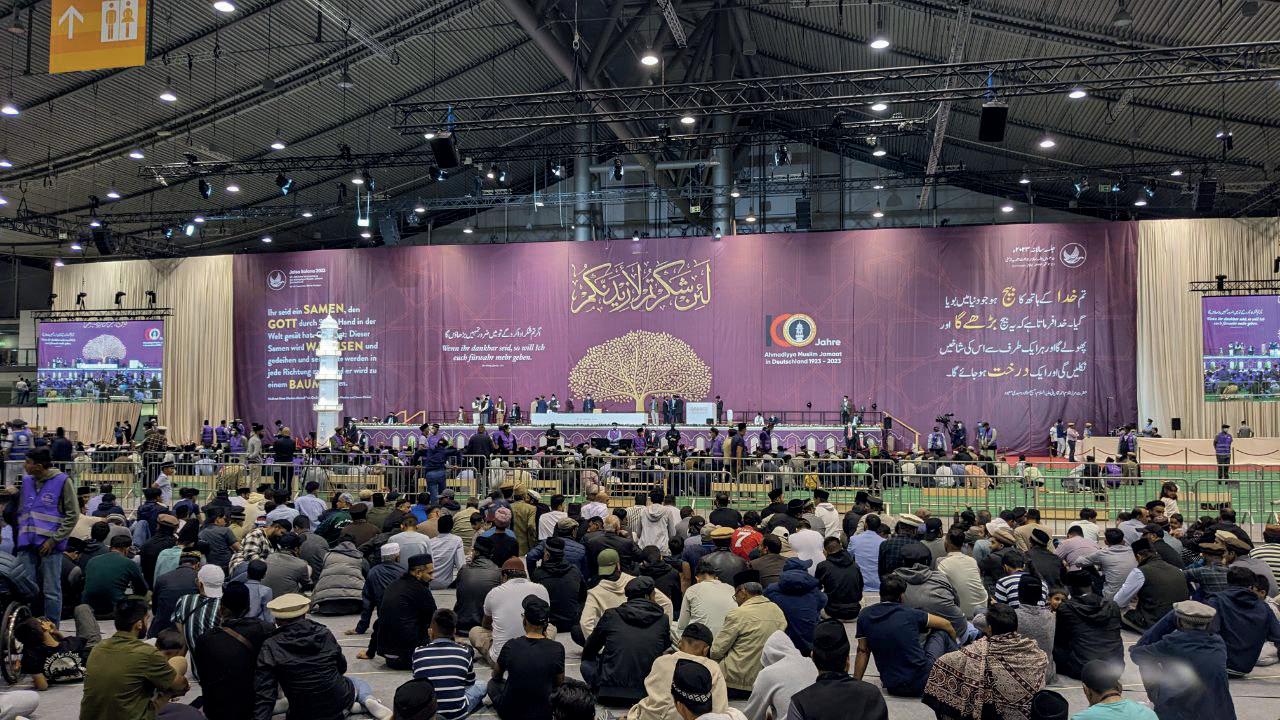
significant cause in this respect. Then, there is even greater negligence and indolence in cities and towns. Even fifty per cent of the people do not eagerly bow their heads before their true Master with sincere love. The question that arises is: why do the people not know of this pleasure and why have they never experienced this exquisite taste? Other religions do not prescribe such injunctions. At times, it so happens that people are busy with their engagements and the call for Prayer is made. At such a time, there are those who would shut their ears, as though their heart begins to throb with pain. Such people are worthy of pity. There are certain people here as well whose shops are situated adjacent to mosques, but they never join in the Prayer. All I wish to say is that one ought to fervently and passionately pray to God Almighty that just as He has granted us diverse forms of pleasure in fruits and other things, may He enable us to experience, even once, the sweet taste of Prayer and worship. One never forgets the taste of a thing. If an individual looks at someone beautiful with pleasure, they remember it well. Further, if a person sees an ugly and hideous figure, the entire state of such a figure comes forth as an embodiment in the mind of the observer, whenever they are reminded of it. Of course, if a person is indifferent and sees the figure in passing, then one remembers nothing. Similarly, in the estimation of those who do not pray, the Prayer is like a penalty, whereby one is
and pain, an individual ought to pray that they are able to experience the pleasure they seek. I say truthfully that surely and most definitely they will experience the pleasure of Prayer. Then, in the observance of Prayer, one ought to strive to seek the benefits that are associated with it and keep in view the concept of goodness or ihsan, (i.e., to worship God as though one can see Him or at least that God can see you). As God Almighty states:
تايسلا نبهذي
“And that is to say, good works drive away evil [11:115]. Therefore, whilst aspiring to goodness and striving to attain the pleasures in Prayer, one ought to supplicate that God enables one to observe the Prayer that is characteristic of the Truthful (siddiqin) and of those who excel in good works (muhsinin).
“As mentioned, Allah the Exalted has stated:
“And this means that good works or Prayer drive away evil. In another instance, God Almighty states that Prayer saves one from indecency and manifest evil. However, despite this, we observe that there are people who observe Prayer, yet still indulge in evil deeds. The response to this is that they observe Prayer, but not in its true spirit, or with piety. They only perform useless movements in the form of a custom and
“The relationship between a spiritual leader and his disciples can be likened to the relationship between a teacher and a student. Just as a student benefits from his teacher, so too does a disciple benefit from his spiritual leader. However, if a student maintains his relationship with his teacher but does not make strides in his education, he cannot derive any benefit. The same can be said about disciples. Thus, in this Community, you must progress in your knowledge and understanding after having established a relationship. A seeker of truth never rests at one place after reaching a certain rank; otherwise, Satan the Accursed would distract him. Just as stagnant water becomes rancid (water that does not flow develops a stench) and produces insects and disease, a human also exhibits such traits when he is stagnant. Thus, we should continue to take strides towards progress.”
The Promised Messiahas further states: “Similarly, if a believer does not strive towards progress, he will fall. Thus, those who are fortunate are obligated to always progress in their faith. There has never been a human in this world more perfect than the Holy Prophetsa, yet he was also taught the prayer:
املع ىندز بر
“[‘O Lord, increase me in knowledge’]. Hence, who else can rest and rely solely on their knowledge and understanding and dismiss the need for progress in the future? As a person progresses in his knowledge and understanding, he will come to realise that there are many things that still require a solution.
“At first glance, some matters may seem useless to them, like if a child plays with the Euclidian shapes (i.e., a child would think the geometric shapes or the various diagrams made by scientists are just mere lines and of no value). These people are just like children and deem these matters to be useless. Nevertheless, eventually, these same things are what they will see to be the truth. When they grow up and gain understanding, they will come to know that these matters
Friday 29 September 2023 | AL HAKAM 26
مهسفناب ام اوريغي ىتح موقب ام ريغي ال هللا نا
تنسحلا نا
تايسلا نبهذي تنسحلا نا
are indeed very important. Therefore, how important is it for one to act upon everything in order to increase in knowledge, while also transforming themselves? You have forsaken many vain pursuits to accept this movement. If you do not, therefore, attain this objective with full understanding and insight, then what benefit is there? How can you strengthen your conviction and knowledge? If you develop doubts and misgivings over trivial matters, there is the risk that you will stumble on your final step.” (Malfuzat [1984], Vol. 3, p. 193)
Hence, there are some whose faith wavers, which is why they fail to increase in their knowledge, or they use their selfconcocted explanations and reasoning. They do not read the books of the Promised Messiahas. If we pay attention to our religious knowledge, we shall also develop our faith in the existence of Allah the Almighty. Furthermore, we shall increase in our faith in the truthfulness of Islam and Ahmadiyyat, and be those who safeguard the faith of our children. Thus, one must pay great attention to this.
The Promised Messiahas stated, “If you have pledged allegiance to me, then accept me as the Hakam [Judge] and Adl [Just Arbiter]. Have conviction in the fact that whatever I say is in accordance with the teachings of Allah Almighty and His Messengersa, and I shall speak with the special guidance of Allah the Almighty.” He stated, “Develop such faith, whereby you pay reverence to the decisions of the Hakam and Adl.”

The Promised Messiahas states, “One who believes should develop their faith to the stage of conviction and cognisance. (They should not fall prey to doubt.) Remember that doubt or conjecture cannot be of benefit. (It is possible that one may begin to harbour doubts.) Allah the Almighty Himself states:
“‘Surely, conjecture avails nothing against truth.’ [10:37] (The truth is plainly evident and even if one harbours doubts, it cannot conceal the truth.) It is conviction that can make a person successful. Nothing can happen without conviction. If a person begins to harbour doubts about everything, then perhaps they would not be able to survive even a moment in the world. (They would even begin to doubt every worldly matter, so take that as an example.) They would not be able to drink water, thinking it could be mixed with poison. They would not be able to eat food from the shops, thinking they could possess something that would kill them. How, then, can one survive? This is a general example.”
Those who are prone to doubt and conjecture make their lives unbearable as they continue to think in this way. One should also make sure that such doubts do not develop in spiritual matters as well. The Promised Messiahas further states, “Likewise, one can derive benefit from this in spiritual matters. Think to yourselves and make a decision in your hearts if you have pledged your allegiance to me and accepted me as the Promised Messiah, Hakam and Adl. If, after this belief, you carry any grief or anguish over any of my decisions or actions, then you should show concern over your faith. Faith, which is filled with doubts and misgivings, cannot result in any good. However, if you have
accepted wholeheartedly that the Promised Messiah is truly the Hakam, then lay down your arms upon his decisions and actions, and have reverence for his verdicts, so that you are counted among those who honour and respect the blessed instructions of the Holy Prophetsa. The testimony of the Holy Prophetsa is sufficient, and he assures that he will be your Imam, and the Hakam and Adl If you are not assured by this, then when can you ever be? The approach can never be good or blessed; that one possesses faith, but at the same time harbours doubts in their heart.
“If I am not truthful, then go and search for a truthful one. But know that at this time, you shall not find another truthful one. Then, if you fail to find another truthful one, I ask only of the rights that the Holy Prophetsa has granted me. Those who have rejected me, and those who raise allegations against me, have not recognised me. But those who have accepted me and still have reservations are even more unfortunate, for they have become blind after seeing. In reality, the contemporaries are also those who seek to lower one’s rank. For this reason, the Messiah [Jesus]as said that a prophet is honoured everywhere except in his own hometown. One can understand from this the troubles and pains he had to endure from his own people. This is the treatment of the prophets, peace be upon them, which has continued, so how can I be free from it? (Prophets were opposed, so it is nothing out of the ordinary if it is also happening to us.) Therefore, whatever we must hear from our opponents is in line with this practice of:
“‘And there never came to them any Messenger, but they mocked at him.
[15:12]’ Alas, if only these people would come to me with pure intentions, so that I may show them that which Allah Almighty has granted me. That God would Himself send down His blessings upon them and make them understand, yet, they acted with miserliness and envy, so how can I now explain to them?”
Even now, after nearly 130-132 years, these people do not take heed after witnessing the signs. The Promised Messiahas then states, “When a person comes with a pure heart in search of the truth, then everything is decided. But when one has evil and mischievous intentions, then nothing can be achieved. A reference of Ibn Arabi has been quoted in Hujajul Kiramah, wherein it states that during the time of the Promised Messiah, he will be deemed a liar and an ignorant person. It is even stated that he will be accused of changing the Religion. This is exactly what is happening right now. Such allegations are being raised against me now. One can only be saved from such doubts when they cover their own book of interpretations, and ponder as to whether this is the truth or not. Some matters are, of course, beyond comprehension; however, those who believe in the prophets wait with good thoughts, patience and resolution until a time comes when Allah the Almighty discloses the truth to them. At the time of the Holy Prophetsa, the companions would not question him, instead, they would wait for someone to raise a question, and they would thus benefit from it. Otherwise, they would keep their heads down silently, without daring to
question him. In my estimation, this is the true and best way to show etiquette. One who does not comprehend the etiquettes of the Holy Prophetsa and fails to adopt them, I fear that they may perish.” (Malfuzat [1984], Vol. 3, pp. 73-75)
The Promised Messiahas was speaking about matters pertaining to his era when he was sitting in his gatherings. Nowadays, people raise the same points after reading his books and hearing his proofs. The Promised Messiahas states that these people do not understand the etiquettes of the Prophetsa, and I fear they will be destroyed.
Thus, it is out of their own misfortune that the Muslims make great excuses when it comes to listening to and understanding this message, and their dire state is not even enough to draw their attention to understanding what they are becoming as a nation while in such a state. This is the time, and the prophecies of the Holy Prophetsa are being fulfilled, so at the very least, search for the promised one to come.
The Promised Messiahas stated that if it is not him then it should be someone else; however, you will not find anyone else.
Having become immersed in worldly pursuits, people are becoming unmindful of this. However, it is our responsibility to continue to make efforts to save them and convey the message of the Promised Messiahas to each and every person. We are not to convey the message only to the Muslims, in fact, we have to convey it to every single person regardless of which faith they belong to and even those who do not believe in any faith at all. We have a lot of work that still remains. Despite 100 years since the establishment of the Ahmadiyya Community in Germany, we have not been able to convey the message of Islam to the people of Germany. Thus, we ought to reflect on this aspect as well. Whilst drawing our attention to conveying the message of Islam and Tabligh [preaching], the Promised Messiahas states:
“At present, I have two important tasks at hand: firstly, that my message is propagated to the Arabs; secondly, that the message is fully conveyed and clarified without a shadow of doubt to the people of Europe. The Arabs are significant because internally they possess the truth, and a large segment of them perhaps do not even know that God has established a divine dispensation.”
This is the case today as well that our message has not reached every Arab, even though efforts in this regard have greatly increased compared to earlier times. Even when it has reached, it is due to the opponents who label us as “Qadiyanis” out of mockery of the Promised Messiah’sas name, and in this way, they have introduced us to the world and to their people and have told people all kinds of lies and falsehoods about the Promised Messiahas. They have only conveyed the message from their perspective. If we have been introduced, then it is through our opponents; however, we have not introduced our message well enough. In any case, the Promised Messiahas continues:
“It is my responsibility to convey this message to them, and if I do not, I shall be guilty of sin. Similarly, the people of Europe also deserve to know where they have erred—they have deified a man and thus, distanced themselves from the True God. The state of Europe has truly become a
reflection of the following:
ضرالا ىلا دلخا
“That is, ‘he inclined to the earth.’ [7:177]”
Generally, people have no concern for anything else besides worldly pursuits. Some of our people, particularly the youth, become impressed by their [material] progress. However, there is no need to become impressed; in fact, they ought to inform them that the path they are on is going to lead them to destruction. We must preach to them. The Promised Messiahas further states:
“All sorts of inventions and developments are being produced (i.e., in western countries and developed nations). However, one should not be taken aback that Europe continues to progress in the worldly arts and sciences. (One should not become impressed by the mere fact that they are making material progress.) It is a matter of principle that when the doors of heavenly knowledge are closed to a people, their thoughts begin to revolve around earthly matters. It has never been the case that prophets came and then designed new machines, or that their efforts and struggles were dedicated to producing worldly inventions alone.” (Malfuzat [1984], Vol. 2, pp. 253-254)
This should be deeply rooted in the minds of everyone that we have not accepted Ahmadiyyat to attain any worldly benefit; rather, we have accepted Ahmadiyyat in order to establish a living relationship with God Almighty. This is the message we have to convey to the people of the world. This is what is going to reform our lives in this world and in the hereafter.
Whilst mentioning the purpose and objective of his advent, the Promised Messiahas stated, “The purpose and objective of my advent is to spread Tawhid [belief in the Oneness of God], morals and spirituality. Tawhid means to believe God to be your objective, purpose, beloved and the One Whom you show complete obedience to. And to abstain from the obvious forms of shirk [associating partners with Allah] as well as the more subtle forms such as reliance upon worldly means and also to refrain from considering oneself to have some kind of significance.”
One should not allow shirk in the form of one’s own ego to appear. One should not indulge in even a single subtle form of shirk; this is the meaning of Tawhid. However, at present, the world is entrapped in worldly endeavours.
“In relation to morals, it means that all the faculties of man should be exercised on its proper occasion and time. It should
27 AL HAKAM | Friday 29 September 2023
ائيش قحلا نم ىنغي ال نظلا نا
نوءزهتسي هب اوناك الا لوسر نم مهيتاي امو
not be the case that one should completely discard a particular faculty and overly adopt another. For example, if one completely cuts off their hand, could they carry out any good act through it? Certainly not. In fact, true and perfect morals are that one should exercise the faculties bestowed upon them by Allah the Almighty on its proper occasion in a manner that is free from any extremes. One form of extreme is if one were to have a heightened sense of smell, they could suffer from hyperosmia, which will cause them to experience discomfort.”
There are some people whose sense of smell is extremely sharp, and as a result, they experience headaches. Similarly, there are smells that can cause different types of ailments. Thus, one ought to pray that Allah the Almighty may enable one to remain in a balanced state and safeguard one from every form of illness, including spiritual ailments.


The Promised Messiahas states:
“The other end of the extreme is that one’s senses completely fail to function. A balanced state is that in which one’s senses function in their proper time and occasion and this is the state whereby one’s morals become true moral qualities and I have come to establish this.”
One should adopt the path of moderation and one should strive to attain the excellent morals that Islam has commanded. The Promised Messiahas further states:


“Spirituality means those signs and hallmarks that come about when one establishes a true relationship with God Almighty. Until these states are achieved, one cannot have a true understanding; however, this is one’s true objective.”
(Malfuzat [2022], Vol. 2, p. 297)
Hence, these actions [if followed,] will transform us into true believers. Therefore, we should analyse ourselves and see if we have reached this standard or not. Our ultimate desire and goal, and most beloved of all, should be God Almighty. If this is not the case, then we are at a relatively weaker stage of our faith. Thus, we should reflect on our actions. When compared with God Almighty, every worldly desire of ours pales into insignificance, and one is not in need of it. If this is the case, then we will fulfil the rights of mosques as well.
Furthermore, if we are constructing mosques, then we should be concerned about how we are going to populate them as well. Thus, every Ahmadi should deliberate over how much passion and fervency they have for Tawhid [Oneness of God]. Similarly, every Ahmadi must exhibit the best of morals. It is these excellent morals that serve as an excellent means of propagating our message, and through this, we can do justice to our pledge of allegiance to the Promised Messiahas. In the mosque openings I attend, those people who are acquainted with Ahmadis say that Ahmadis have good morals, but I have seen a shortcoming. Despite these good morals, the Ahmadis do not introduce them properly to Islam and Ahmadiyyat. If we introduce this to them properly, then we can fulfil the words of the Promised Messiahas to propagate the message of Ahmadiyyat, the true Islam, to the people of Europe and this country. Similarly, we should exhibit excellent morals
between ourselves as well. It is not only meant for externals, [it should not be the case that] one deals in an excellent manner with others, but causes great issues in their own home and for others around them. Therefore, these are the things we should bear in mind with regard to excellent morals and conduct. The Promised Messiahas came in subservience to the Holy Prophetsa in order to establish these very morals within us. The Promised Messiahas said that one can gauge the result of their spirituality and can develop their spirituality when one attains the highest ranks of fulfilling the rights of Allah and fulfilling the rights of mankind; when our own people and others see the beauty within us. If our children learn these lessons from us, then we can say we have achieved this rank.
Amir Sahib [National President] of Germany was asking me in recent days, what is their target for the next century? Firstly, the few things that I have mentioned do not encompass everything; I have merely mentioned a few things that the Promised Messiahas guided us towards; have we achieved all of these in the last century? Have we forged a strong bond with God Almighty? Have we attained the excellent ranks in prayers? At prayer times, do we put our worldly endeavours to one side and go
for prayers or are we focused on simply constructing mosques? Do we regularly recite the Holy Quran? Do we search for the injunctions of the Holy Quran and try to act on them? Are we striving to do our utmost to ensure our children remain attached to their faith? Are we simply concerned with our children’s secular education or are we worried about their faith as well? Have our morals and conduct with one another reached the level where they resemble مهنيب ءﺂمحر [‘tender among themselves’ (48:30)]? Are we showing excellent morals to others and telling them about the beautiful teachings of Islam or do we simply show some good manners and claim that we are peaceful people?
Many times, when I have the opportunity to address external guests, many of them say that they are hearing the beautiful teachings of Islam for the first time. From this, it is evident that you are not using your associations [with externals] and your good morals to propagate the message of Islam in the manner you should. What is the point of distributing hundreds of thousands of leaflets if the people are not introduced to Islam properly?
Therefore, we should first assess ourselves to gauge where we are with respect to fulfilling the rights of Allah and the






rights of mankind. If one has attained this –which in my opinion has not been attained yet – and everyone can reflect and assess for themselves, there is no need for me to mention it. So what then is the need to set a new target for the next century? The target for the next century is the brief code of conduct, which I mentioned in light of the guidance imparted to us by the Promised Messiahas. We passionately claim that we will win the hearts of everyone. We must convince everyone of the oneness of God Almighty and bring everyone towards the Holy Prophetsa. Therefore, every one of us should analyse ourselves in this regard, and the Germany Jamaat should begin the new century with even more vigour and resolve that they will strive to achieve their goals by giving precedence to their faith over all worldly pursuits, and that they will advise their children and progenies to follow suit and ensure for their moral training, in a way that this yearning to form a connection with God Almighty is transferred from one generation to the next. May Allah enable us to do so.
(Official Urdu transcript published in the Daily Al Fazl International, 22 September 2023, pp. 3-7. Translated by The Review of Religions.)
New historical evidence about the Muhammadi Begum prophecy!

Friday 29 September 2023 | AL HAKAM 28
Editor-in-chief: Qaasid Muin Ahmad | Executive editors: Ataul Fatir Tahir, Aqeel Ahmed Kang | Research coordinator: Awwab Saad Hayat | Associate editors: Jalees Ahmad, Ata-ul-Haye Nasir
Translations: M Adam Ahmad | Design: Tahmeed Ahmad | © Al Hakam 2023
Read now in Al Hakam!
































 Amen Aqeel Haider Mexico Correspondent
Amen Aqeel Haider Mexico Correspondent



















